#but coming away as I do always with an even greater appreciation for the storytelling characterization and writing in the original show
Text
I’m just kind of shocked that they threw so much money at this show without really working on the script? Maybe I’m naive.
#live action atla#atla#I’m genuinely happy for people who are enjoying it#personally I am just a bit stunned and sad#but coming away as I do always with an even greater appreciation for the storytelling characterization and writing in the original show
9 notes
·
View notes
Text
The Horror Genius of Five Nights At Freddy’s
I’ve been playing FNAF: Help Wanted VR on my Oculus Quest lately (a birthday present to myself -- I know I’m late to that party!) and it’s reignited in me my old love of this series. I know Scott Cawthon’s politics aren’t great, but I don’t think there’s any malice in his heart beyond usual Christian conservative nonsense -- and I think he stepped down as graciously and magnanimously as possible when confronted about it. Time will judge Scott Cawthon’s politics, and that’s not what I’m here to talk about. I want to talk about what makes these games so damn special, from a horror, design, and marketing perspective. I think there’s really SO MUCH to be learned from studying these games and the wider influence they’ve had as intellectual property.

What Is FNAF?
In case you’ve somehow been living under a rock for the last seven years, Five Nights At Freddy’s (hereafter, FNAF) is a horror franchise spanning 17 games (10 main games + some spinoffs and troll games, we’ll get to that), 27 books, a movie deal, and a couple live-action attractions.
But before it exploded into that kind of tremendous IP, it started out as a single indie pont-and-click game created entirely by one dude, Scott Cawthon. Cawthon had developed other games in the past without much fame or success, including some Christian children’s entertainment. He was working as a cashier at Dollar General and making games in his spare time -- and most of those games got panned.
So he tried making something different.
After being criticized that the characters in one of his children’s games looked like soulless, creepy animatronics, Cawthon had his lightbulb moment and created a horror game centered on....creepy animatronics!
The rest, as they say, is history.
The Genius of FNAF’s Horror Elements
In the first FNAF game, you play as a night security guard at Freddy Fazbear’s Pizza, a sort of ersatz Chuck-E-Cheese establishment. The animatronics are on free-roaming mode at night, but you don’t want to let them find you in your security room so you have to watch them move through the building on security camera monitors. If they get too close, you can slam your security room doors closed. But be careful, because this restaurant operates on a shoestring budget, and the power will go off if you keep the doors closed too long or flicker the lights too often. And once the lights go out, you’re helpless against the animatronics in the dark.
Guiding you through your gameplay is a fellow employee, Phone Guy, who calls you each night with some helpful advice. Phone Guy is voiced by Cawthon himself, and listening to his tapes gives you some hints of the game’s underlying story as well as telling you how to play. A few newspaper clippings and other bits of scrap material help to fill in more details of the story.
Over the next set of games, the story would be further developed, with each new game introducing new mechanics and variations on the theme -- in one, you don a mask to slip past the notice of animatronics; in another, you have to play sound cues to lure an animatronic away from you. By the fourth game, the setup was changed completely, now featuring a child with a flashlight hiding from the monsters outside his door -- nightmarish versions of the beloved child-friendly mascots. The mechanics change just enough between variations to keep things fresh while maintaining a consistent brand.
There are so many things these games do well from a storytelling and horror perspective:
Jump Scares: It’s easy to shrug these games off for relying heavily on jump scares, and they absolutely do have a lot of them. But they’re used strategically. In most games, the jump scares are a punishment (a controlled shock, if you will) -- if you play the game perfectly, you’ll never be jump-scared. This is an important design choice that a lot of other horror games don’t follow.
Atmospheric Dread: These games absolutely deliver horror and tension through every element of design -- some more than others, admittedly. But a combination of sound cues, the overall texture and aesthetic of the world, the “things move when you’re not looking at them” mechanic, all of it works together to create a feeling of unease and paranoia.
Paranoia: As in most survival horror games, you’re at a disadvantage. You can’t move or defend yourself, really -- all you can do is watch. And so watch you do. Except it’s a false sense of security, because flicking lights and checking cameras uses up precious resources, putting you at greater risk. So you have to balance your compulsive need to check, double-check, and make sure...with methodical resource conservation. The best way to survive these games is to remain calm and focused. It’s a brilliant design choice.
Visceral Horror: The monster design of the animatronics is absolutely delightful, and there’s a whole range of them to choose from. The sheer size and weight of the creatures, the way they move and position themselves, their grunginess, the deadness of their eyes, the quantity and prominence of their teeth. They are simultaneously adorable and horrifying.
Implicit Horror: One of the greatest strengths to FNAF as a franchise is that it never wears its story on its sleeve. Instead of outright telling you what’s going on, the story is delivered in bits and pieces that you have to put together yourself -- creating a puzzle for an engaged player to think about and theorize over and consider long after the game is done. But more than that, the nature of the horror itself is such that it becomes increasingly upsetting the more you think on it. The implications of what’s going on in the game world -- that there are decaying bodies tucked away inside mascots that continue to perform for children, that a man dressed in a costume is luring kids away into a private room to kill them, and so forth -- are the epitome of fridge horror.
The FNAF lore does admittedly start to become fairly ridiculous and convoluted as the franchise wears on. But even ret-conned material manages to be pretty interesting in its own right (and there is nothing in the world keeping you from playing the first four games, or even the first six, and pretending none of the rest exist).
Another thing I really appreciate about the FNAF franchise is that it’s quite funny, in a way that complements and underscores the horror rather than detracting from it. It’s something a lot of other properties utterly fail to do.
The Genius of Scott Cawthon’s Marketing
OK, so FNAF utilizes a multi-prong attack for creating horror and implements it well -- big deal. Why did it explode into a massive IP sensation when other indie horror games that are just as well-made barely made a blip on the radar?
Well! That’s where the real genius comes in. This game was built and marketed in a way to maximize its franchisability.
First, the story utilizes instantly identifiable, simple but effective character designs, and then generates more and more instantly identifiable unique characters with each iteration. Having a wealth of characters and clever, unique designs basically paves the way for merchandise and fan-works. (That they’re anthropomorphic animal designs also probably helped -- because that taps into the furry fandom as well without completely alienating non-furries).
Speaking of fan-work, Scott Cawthon has always been very supportive of fandom, only taking action when people would try to profit off knock-off games and that sort of thing -- basically bad-faith copies. But as far as I know he’s always been super chill with fan-created content, even going so far as to engage directly with the fandom. Which brings me to....
These games were practically designed for streaming, and he took care to deliver them into the hands of influential streamers. Because the games are heavy on jump-scares and scale in difficulty (even including extra-challenging modes after the core game is beaten) they are extremely fun to watch people play. They’re short enough to be easily finished over the duration of a long stream, and they’re episodic -- lending themselves perfectly to a YouTube Lets Play format. One Night = One Video, and now the streamer has weeks of content from your game (but viewers can jump in at any time without really missing much).
The games are kid-friendly but also genuinely frightening. Because the most disturbing parts of the game’s lore are hinted at rather than made explicit, younger players can easily engage with the game on a more basic surface level, and others can go as deep into the lore as they feel comfortable. There is no blood and gore and violence or even any explicitly stated death in the main game; all of the murder and death is portrayed obliquely by way of 8-bit mini games and tangential references. Making this game terrifying but accessible to youngsters, and then marketing it directly to younger viewers through popular streamers (and later, merchandising deals) is genius -- because it creates a very broad potential audience, and kids tend to spend 100% of their money (birthdays, allowances, etc.) and are most likely to tell their friends about this super scary game, etc. etc.
By creating a puzzle box of lore, and then interacting directly with the fandom -- dropping hints, trolling, essentially creating an ARG of his own lore through his website, in-game easter eggs, and tie-in materials -- Cawthon created a mystery for fandom to solve. And fans LOVE endlessly speculating over convoluted theories.
Cawthon released these games FAST. He dropped FNAF 2 within months of the first game’s release, and kept up a pace of 1-2 games a year ever since. This steady output ensured the games never dropped out of public consciousness -- and introducing new puzzle pieces for the lore-hungry fans to pore over helped keep the discussion going.
I think MatPat and The Game Theorists owe a tremendous amount of their own huge success to this game. I think Markiplier does, too, and other big streamers and YouTubers. It’s been fascinating watching the symbiotic relationship between these games and the people who make content about these games. Obviously that’s true for a lot of fandom -- but FNAF feels so special because it really did start so small. It’s a true rags-to-riches sleeper hit and luck absolutely played a role in its growth, but skill is a big part too.
Take-Aways For Creatives
I want to be very clear here: I do not think that every piece of media needs to be “IP,” franchisable, an extended universe, or a multimedia sensation. I think there is plenty to be said for creating art of all types, and sometimes that means a standalone story with a small audience.
But if you do want a chance at real break-out, run-away success and forging a media empire of your own, I think there are some take-aways to be learned from the success of FNAF:
Persistence. Scott Cawthon studied animation and game-design in the 1990s and released his first game in 2002. He released a bunch of stuff afterward. None of it stuck. It took 12 years to hit on the winning formula, and then another several years of incredibly hard work to push out more titles and stoke the fires before it really became a sensation. Wherever you’re at on your creative journey, don’t give up. You never know when your next thing will be The Thing that breaks you out.
If you want to sell a lot of something, you have to make it widely appealing to a bunch of people. This means keeping your concept simple to understand (”security guard wards off creepy killer animatronics at a pizza parlor”) and appealing to as wide a segment of the market as you can (ie, a horror story that appeals to both kids and adults). The more hyper-specific your audience, the harder it’s gonna be to find them and the fewer copies of your thing you’ll be selling.
Know your shit and put your best work out there. I think there’s an impulse to feel like “well, nobody reads this anyway, so why does it matter if it’s no good” (I certainly have fallen into that on multiple occasions) but that’s the wrong way to think about it. You never know when and where your break will come. Put your best work out there and keep on polishing your craft with better and better stuff because eventually one of those things you chuck out there is going to be The Thing.
Figure out where your target audience hangs out, and who influences them, and then get your thing in the hands of those influencers. Streaming and YouTube were the secret to FNAF’s success. Maybe yours will be BookTube, or Instagram, or a secret cabal of free librarians. I don’t know. But you should try your best to figure out who would like the thing that you’re making, and then figure out how to reach those people, and put all of your energy into that instead of shotgun-blasting your marketing all willy nilly.
You don’t have to put the whole story on the page. Audiences love puzzles. Fans love mysteries. You can actually leave a lot more unanswered than you think. There’s some value in keeping secrets and leaving things for others to fill in. Remember -- your art is only partly yours. The sandbox belongs to others to play in, too, and you have to let them do that.
If in doubt, appealing to furries never hurts.
Do I take all of this advice myself? Not by a long shot. But it’s definitely a lot to think about.
Now if you’ll excuse me, I have to go beat The Curse of Dreadbear.
26 notes
·
View notes
Text
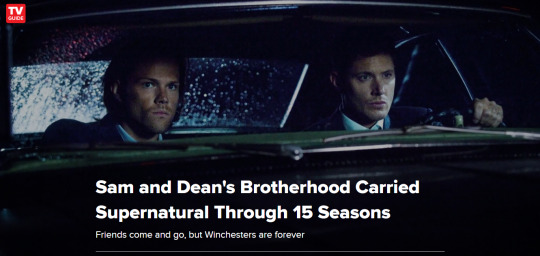
When Supernatural airs the eagerly anticipated conclusion to the saga of the Brothers Winchester on Thursday, Nov. 19, the WB-turned-CW series will bid adieu after a truly impressive 15 seasons. The massive and occasionally unwieldy body of work that Supernatural leaves behind has something for every flavor of fan. Creepy ghosts? Check. Sexy vampires? Check. Not-so-sexy vampires? Check. Monsters of the week? Meta rabbit holes? Goofy parodies? Check, check, and check.
The most enduring element, however, and the one that certainly draws this crazy, beautiful, dysfunctional fandom together, has to be the epic love story of Sam (Jared Padalecki) and Dean (Jensen Ackles). Theirs is the bromance that has been at the core of Supernatural’s soul from the very beginning, back before we even knew their story was being manipulated by Chuck (Rob Benedict), aka God, who claimed they were his “favorite show.” While a few friends — Bobby (Jim Beaver), Castiel (Misha Collins), and Jack (Alexander Calvert) — endured season upon season, eventually claiming their own place in the family that don’t end with blood, it will be Sam and Dean in the end, just like it was in the beginning. Friends come and go, but Winchesters are forever.
Now, Sam and Dean’s relationship is not always pretty, and it can be argued that it’s not always healthy — heck, I have argued that it’s not healthy — but it certainly makes for compelling, if somewhat repetitive, storytelling. How many times are Dean and Sam going to fling themselves into certain death all for their brotherly love of one another? How many times will the one left behind drag the other out of literal Hell, whether he likes it or not? And how many times will one brother turn evil? The storylines are cyclical. We’ve seen these things happen again and again, and yet we keep coming back, because even though Supernatural has told the same story quite a few times over the last 15 seasons, Sam and Dean do grow — or at least change — as a result of their experiences.
When Meg (Nicki Aycox) possessed Sam in Season 2’s “Born Under a Bad Sign,” both brothers were on the same page — Meg possessing Sam was a Bad Thing. It had to be fixed. It was horrific, an unquestionable violation, and a few episodes later, both brothers were found to be sporting their iconic chest tattoos to ensure something like that never ever happened again. Being possessed by Lucifer (Mark Pellegrino) in Season 5 was different though. It was still a violation, still a horror, but one that Sam invited upon himself as a necessity to save the world, and one that Dean supported — albeit with extreme reluctance — as the right play. The Winchesters are big damn heroes and this is what big damn heroes do.
And then came Gadreel (Tahmoh Penikett). It was another violation, another horror. But unlike a sacrifice for the greater good, taken willingly and accepted by both brothers as a vital sacrifice that they had no choice but to make, Gadreel entered the picture in a moment of sheer panic. Dean manipulated Sam because of his own personal desire for Sam to live. And Sam did live, but he was horrified and hurt, while Dean said he’d do it all again in a heartbeat.
It’s OK to tell the same story, as long as you’re not actually telling the same story — and isn’t that what all of Chuck’s endless variations of the Winchester are in the show’s final season? The Sams and Deans from the alternate universe who end up murdering each other are not telling the same story as our Sam and Dean. Nor are the displaced hipster Sam and Dean. Or Squirrel Sam and Dean. And yet they are, because there is something so fundamentally Sam and Dean about Sam and Dean that no variation is any less compelling than another.
For 15 seasons, we have not been able to look away from Sam and Dean’s hard-to-define relationship. Is it love? Is it lust? Is it codependency wrapped up in floofy hair and flannel? Maybe. At the end of the day, it’s fiction, and fiction is beautiful because it lets us climb to all kinds of heights and crawl through any number of depths far outside of our own experiences.
The epic love story of Sam and Dean is a prism at times, and a mirror at others. We can see what we want to see, or we can see something more. We can see ourselves reflected in their story, in small ways here and there, or we can see nothing of ourselves and just appreciate a thrilling adventure, a gripping gothic horror, or a spooky mystery. But after all these years, the supernatural aspects are not what is so magical about Supernatural. Yes, it may be the thing that drew eyes initially — I like a good ghost story, and some of those early WB promos were rife with the promise that Supernatural was going to be sexy and scary — but that’s not all the show was when it began, nor is today. Sometimes Supernatural is rather silly. Sometimes it’s repetitive. Sometimes it becomes mired in its attempts to tell new stories after all this time. But in the end, there i s always Sam and Dean in the center of it all, the point of the compass, guiding this series home. (x)
Source: https://www.tvguide.com/news/features/supernatural-sam-dean-winchester-relationship/
#Supernatural#sam winchester#dean winchester#jared padalecki#jensen ackles#TV guide article#epic love story of Sam and Dean
253 notes
·
View notes
Photo
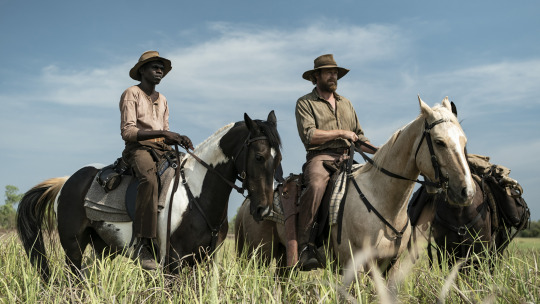
High Ground.
Australian director Stephen Maxwell Johnson tells Letterboxd’s Indigenous correspondent Leo Koziol about his revisionist new meat-pie Western High Ground, working in a ‘both-ways’ style, and how he approaches the question of story sovereignty.
“Maybe we’re all feeling a little more vulnerable, a little more open to thinking about who the fuck we all are in this world.” —Stephen Maxwell Johnson
Note: this interview may contain images and stories of people who have passed away.
Not every Western has a ‘Croc Spotter’ in its production credits, but Australian Westerns are in a league of their own. The genre has long been a staple of Australian cinema; the world’s first narrative feature film is considered to be Charles Tait’s 1906 bushranger yarn about the Kelly Gang. While the likes of outlaw Ned Kelly have made good Western fodder for more than a century now, recent entries in the sub-genre—known colloquially as meat-pie Westerns—are starting to look a little longer and harder at the relationship between British colonizers and the Indigenous peoples of the Great Southern Land.
This year brings two such tales: Leah Purcell’s feminist western The Drover’s Wife: The Legend of Molly Johnson, which made our Best of SXSW 2021 list, and Stephen Maxwell Johnson’s High Ground, which was executive produced by a community of Aboriginal activists, including Witiyana Marika, one of the founding members of groundbreaking Aboriginal band Yothu Yindi. (Marika is also in the film as tribal elder, Grandfather Dharrpa, taking on a role that was intended for Aboriginal great David Gulpilil, who has retired from acting due to ill health.)
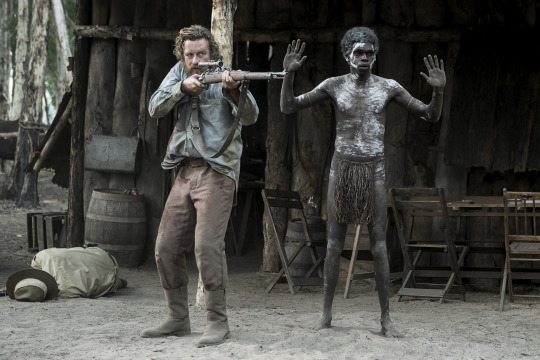
Simon Baker as Travis and Jacob Nayinggal Junior as Gutjuk.
Set in Australia post World War I, and based on true stories told by the traditional inhabitants of Arnhem Land, in north-eastern Australia, High Ground opens with—content warning—a brutal massacre by white Australian police of an Indigenous family. The story soon pairs Gutjuk (Jacob Nayinggal Junior, in his impressive screen debut) with bounty hunter Travis (heart-throb Simon Baker, in gnarly outback mode) in a manhunt that brings the opposing forces of colonizers and inhabitants to a head.
Nayinggal Junior, the grandson of Arnhem Land traditional owner Jacob Nayinggal, was not yet born when Johnson, who is a white Australian, began the long process of developing High Ground with his Indigenous partners, whose oral histories informed the film’s plot. Johnson’s connection to Yothu Yindi and his partners’ community goes back over 30 years; he directed the original music video for the band’s 1991 international hit ‘Treaty’, the first Indigenous-language song to chart prominently in Australia.
This is Johnson’s second feature film connected to the Yolngu communities in north-eastern Australia; the first, Yolngu Boy, is a coming-of-age story of three young friends on a journey to Darwin after one of the boys lands in trouble. It has been twenty years since that debut, and High Ground has been a labor of love in the time since.
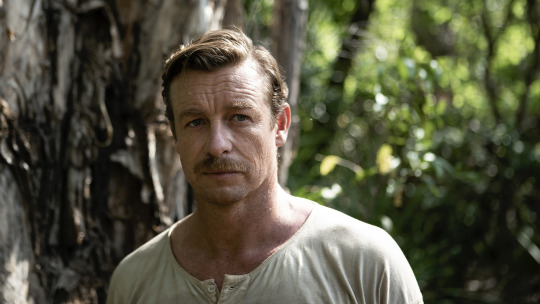
Simon Baker in ‘High Ground’.
The film takes its sound design from the land and its inhabitants, turning the volume up on birds, insects, snakes, gunshots and Aboriginal song. Expansive cinematography makes sure to place characters within the context of their surrounds—a constant reminder that the land is bigger than anything happening on it. “Brutal in all the right ways, and as honest as an Australian colonial Western should be,” writes Coffeenurse. “It’s really something how the Australian Western has become the way for Australian cinema to explore the weight of colonialism and imperialism in our history and culture,” agrees Smoothjazzlord. “Stephen Johnson doesn’t shy away from complexity and I appreciate that,” writes TheEllamo.
I spoke to Johnson at length about his “both-ways” journey of bringing the film to the screen through collective research, song and storytelling.
Notes: ‘Blackfella’ and ‘whitefella’ are informal, self-descriptive terms often used by Indigenous and Aboriginal Australians and their friends. Johnson makes several references to ‘makaratta’, an intricate Yolngu term that describes the process of coming together to face wrongs, reconcile and make peace, and to ‘Country’, which is an Indigenous colloquialism describing one’s association with one’s own land and family.
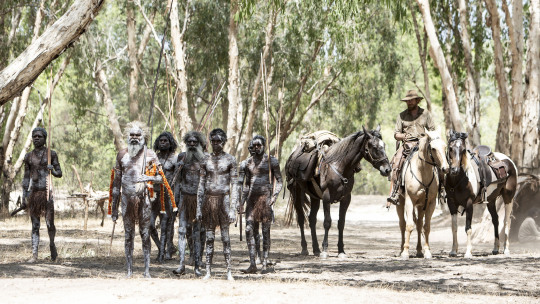
Witiyana Marika (second from left) and Simon Baker (on horse) with Yolngu cast members.
Tell us how the story of High Ground came about.
Stephen Maxwell Johnson: I was very fortunate in my life to have had two parents who explored the world. I grew up in the Bahama Islands, in Africa and they came to northern Australia. My father was an educator of the Yolngu people, and really, my friendships and my associations in my life have been about growing up with Indigenous cultures and people.
I've never really been disconnected from that, and the stories I grew up with—things I’ve heard, ceremonies I’ve seen—were very much a part of my education. I went to school and the stories I’m hearing, all the whitefella stories about Captain Cook and the invasion and what happened, no one ever wanted to go any deeper or open a story book to where it all began, and how old it actually all is.
As you know, it’s the oldest living culture on Earth, it’s an amazing connection to Country and the stories and the songlines. So, we came together, we made a decision to tell a story of the resistance that became High Ground, over many years sitting on Country with old men and women and family and drawing inspiration from true stories and true characters, then putting together what was obviously a fiction (but so is history).
It was about wanting to tell a deeper truth, but to create a film that was entertaining, so it really drew you in, and allowed you to come out the other end to perhaps reflect and rethink the Australia story, and, really, the greater human story about who we all are.
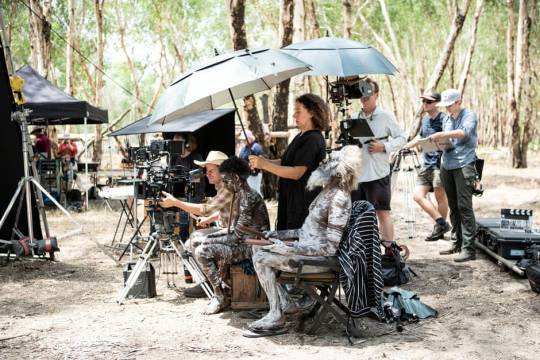
Witiyana Marika (front, seated) on the set of ‘High Ground’.
A unique aspect of your film is that Yothu Yindi band member Witiyana Marika is a producer. How did you connect with Yothu Yindi and establish those friendships?
Well, I did pretty much all of the Yothu Yindi stuff, I made ‘Treaty’ and ‘Djäpana’ and all those clips that the band did. I directed and photographed all of that stuff. For many years, anything that was Yothu Yindi, I was there doing it. Witiyana and Mandawuy [late Yothu Yindi frontman Dr. Mandawuy Yunupingu] were two of my dearest, dearest friends—my father actually knew Mandawuy back in school days, so there’s a deep and long connection there. Witiyana picked up the mantle after Mandawuy passed away. It even goes back further than that, to discussions with old man Bill Neidjie and Jacob Nayinggal, who sort of drew up the battle lines and helped create Kakadu [National Park].
Jacob Junior Nayinggal, he’s been born and became the lead actor; his grandfather would be so pleased that his grandson ended up being the lead actor in this film. ’Cause it was always about getting a Yolngu hero leading the story of the resistance, which was what it was called back in the day.
It’s really been a both-ways journey. That’s what everything that Yothu Yindi sang about, was that idea of bridging between two cultures, that idea of coming together and sharing knowledge and respecting each other. That balance—makaratta. That’s been my journey. That is the journey.
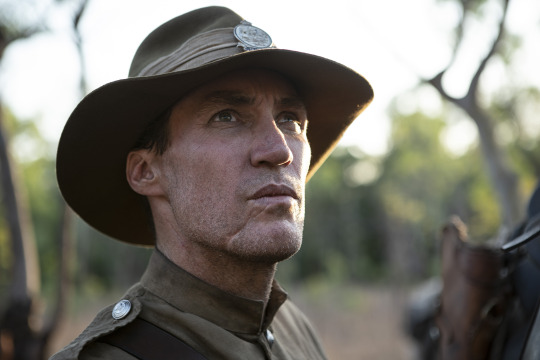
Callan Mulvey as Ambrose in ‘High Ground’.
A big issue for people in the Indigenous film community is storytelling sovereignty: “nothing about us without us”. Do you feel that the community working closely with you to make this film meant that you were telling their story in the way they wanted it seen and heard?
Well if you have a look at the credits it sort of says a lot about the process. Twenty years working together. As I said to you, I don’t see myself as a whitefella over here and they’re blackfellas over there, I see [us] as being human. They’ve been my dearest and closest friends all my life. This is us sitting down, together. Listening. Learning both ways. Bridging the gap and wanting to tell the bigger story about this country.
In this country there’s a very big story to be told. It has two different perspectives and it was about getting that right and spending the time together right. It is very much a Yolngu story; everything has been meticulously researched, and spoken about, and sung. The producers, the executive producers, all the creators in the film are predominantly Yolngu people, right across. Everything is ultimately connected and it is very much the voice of this land that we wanted to shine through in the story of High Ground.
That sort of thing came back in the day, when I made ‘Treaty’: “What’s a whitefella telling [our story]?” Are you kidding me? Mandawuy had the same reaction, he said “We’re doing this together”. Christ almighty we’ve known each other for a lifetime and we’re working together creating and telling stories. There you go. Simple as that. If anyone’s got a problem with that then I think they’re the one with the problem.

‘High Ground’ director Stephen Maxwell Johnson.
Certainly, Yothu Yindi itself was comprised of both blackfella members and non-blackfellas.
Exactly. Exactly. Look. I’ve grown up with blackfellas from right across Arnhem Land, and it’s been nothing but a deep and beautiful, profound friendship. I’ve never seen it as me and them. We’re just humans. We are one. We share, we care, we love, we laugh. There is so much to be learned from the ancient culture of this country. And the land and the language and the people.
It’s a beautiful thing having that kind of connection and immersion in that world. And that’s been my life story. I’ve been very fortunate to have had that. A lot of people don’t get that experience… being able to work so closely and so deeply with my friends—and family; I was adopted in, as well.
And can I tell you, every single person in Arnhem Land is so proud of this film, it is their film. Their story. It’s been their creative process as well. Every person who is involved in the crew and the journey of the film has had a life-changing experience, for the better. We just hope that the film and the story do help contribute to that bigger conversation, that idea of makaratta and sorting out the shit and getting on with a bit of truth telling.
How was the reaction in the Aboriginal community? Have you had the opportunity to take the film back to the people in Arnhem Land, to have screenings there?
First thing we did. With the elders, that’s what we all planned. They said, “right, as soon as we’ve done this, the first thing we’re going to do, we’re going to bring this back to the families and show it to the families first.” And that’s precisely what we did; we took a big screen out into Arnhem Land, and put it out in the bush, for the families to watch. It was an amazing experience.
Let me tell you, the screams and the applause, and the laughter and the tears, when they saw the film, on their Country. Their film. Their story. Obviously they can listen to the language and the songlines in the film in a completely different way. It was beautiful. I almost couldn’t stop crying. That sense of pride that everyone had in the film, they just own it. It’s theirs and it’s everyone’s. It’s a beautiful way to create something.

The community screening of ‘High Ground’ on the Gunbalanya football field in West Arnhem Land, Australia.
Did you manage to have those screenings happen before Covid-19?
Well, no. The Northern Territories, as you know, was clear. I had to go into quarantine and once the Arnhem Land bio-zone was relieved just a little bit, we took the film out. We had to hit the pause button with Covid, but [then] we did it. People just drove, and flew, and walked from hundreds of miles to come to the place where we blew up the screen and projected the light.
That’s a wonderful story. What’s the reaction been from mainstream Australia?
Look, very, very good. [The film’s distributor] Madman said it made double what [they] thought it would in box office. I think we were fortunate maybe in some respects coming on the back of Covid-19. Maybe we’re all feeling a little more vulnerable, a little more open to thinking about who the fuck we all are in this world. There is this kind of turning of the tide, now, of people and of a new generation wanting to learn and understand about our connection to Country.
We’re blessed with, you know, what we have right here. We need to nurture it, take care of it, respect it, celebrate it, dance it, sing it, talk it. It’s a beautiful thing to be able to tap into.
Thank you Stephen so much for your time. I just want to say I was thoroughly engrossed by your film. It was powerful, it was important. I found particularly the scene in the middle, where a Treaty signing was hinted at: that would have been a cathartic moment for the people of Arnhem Land? To think ‘that could have been what our people had done in the 1930s’, instead of the lack of a Treaty, which Australia has never had. All power to you and everything you’ve done.
That’s beautiful mate, and I will say, just one lovely parting thought here, you know yes, it’s my work, but honestly it’s such a team effort. Such trust, such great friendships and collaborations to create something like this. It’s no one fella’s effort, it’s an incredible team effort.
Related content
Meat-Pie Westerns, Kangaroo Westerns, Australian Westerns: a Letterboxd HQ list
Always Was, Always Will Be, Aboriginal Land: Troy’s list of the best of Aboriginal and Torres Strait Islander “Australia” in film and television
Australian Aboriginal Movies: an extensive list by Wayne
Australian Films Worth Your Time: Jacob’s list of Ocker cinema
My Name is David Gulpilil: Molly Reynolds’ new film celebrating the actor’s extraordinary life
Follow Leo on Letterboxd
‘High Ground’ is available now on digital and VOD via Samuel Goldwyn Films.
#high ground#stephen maxwell johnson#simon baker#callan mulvey#australian cinema#australian film#torres strait islanders#aboriginal and torres strait#aboriginal#aborigine#aboriginal film#northern territory#arnhem land#yolngu#witiyana marika#Jacob Nayinggal Junior#yothu yindi#indigenous film#indigenous cinema#letterboxd#western#meat pie western#kangaroon western#australian western
25 notes
·
View notes
Note
Irish-American musician speaking. I just want to say a couple of things (a) i appreciate that other people are at least willing to criticise Jeff (even though i don’t agree that he was copying “ethnic” styles of music because that’s just bullshit and he was just going for a specific feeling, because that’s how music works) and (b) i really appreciate that this blog takes James' character seriously and not whatever the fecking hell the writers think they've done.
i did want to say that i'm really upset about it as a person with an autistic specturm disorder. i doubt the writers (bless their hearts) realised it, but the semblance they gave James is one of the hallmark signs of ASDs, especially in adults and young people. given the way they've always written him until the end of season seven, i really related to him and his struggles for a variety of reasons. i could get just as angry about the way they've portrayed military service (my dad is a similar ranking to the character and has been through some shit) especially given that a lot of people in my family have or are serving, but i get the sense that everyone sees how problematic that demonstration is. the former is a lot more subtle, and it honestly upsets me more.
and then there's all the bullshit surrounding Penny (they should have just left her dead or given Winter the powers to begin with for fuck's sake). firstly, i'm just going to come out and say that i've hated the way they've used vocal music to bash us over the heads with messages the last few volumes. Cinder's TWO (whyyyyyyy) songs in just that one episode this volume were basically narrating what was on screen which took away from the moments and the second one during her fight with her mentor was just plain bad. i thought those two were the worst we were going to get but apparently i was wrong and we get whatever the hell "Friend" is. (although i will say i bet the only reason they threw in that second song for Cinder was because Casey just had to get publicity for her shitty band). but look. i'm lgbtqia myself and it really (especially considering Penny and Ruby's intereactions) felt like queerbaiting/bury your gays but i'll set that aside. making Penny human (a) took away the only unique/interesting thing left about her character and (b) her death was essentially a glorifying suicide "for the greater good" which really slaps in the face of people who have honestly suffered from depression and suicide.
this isn't the first time that they've shyed away from trying to explore serious subjects, but it is particuarly gross because of the song. an earlier example of them doing this is with regard to "the path to isolation" when Casey felt the need to say Weiss has never cut and that she wouldn't do that. while that was (to say the very least) a bit uncomfortable for her to just drop that, it sounded like she just wanted to avoid talking about the subject because it's too dark. i have a lot of problems with Casey and her actions over the years, but i think it's important to note that SHE WROTE PENNY'S SONG. she is the one responsible for this, and she keeps talking about how great it is and how "humbling" the experience was. bitch no. you can't just take only praise and get mad about critisicism to the point where you basically recieve none anymore.
besides, Casey is pretty hard to understand because she STILL doesn't enucniate much when she sings so if she and her dad are going to keep being basically worshipped hand and foot by people while recieving no criticism even where it is due, then they shouldn't be in this or music. part of being a musician is that you SHOULD be critiqued by your peers and even by just casual listeners but that doesn't happen and they (but especially her) don't improve. by no means do i think Casey and Jeff are the worst of CRWBY, but they are part of the problems with tone in the storytelling and they should be critiscised for it more.
oh god this is a long ask & it’s like a month late, please forgive me.
yeah, my issue with the whole jeff issue was never that he was “copying” ethnic music, though there is a discussion to be had when that music comes from closed off cultures like my own & others & how that should be respected, but that this vague claim by someone who’s lied to push their headcanons before was using it to claim ruby & summer were romani coded when there has been anti gypsyism sentiment in crwby before via arryn’s sexualization of us. i simply don’t trust these white americans to write any gypsy ethnic groups’ stories with any sense of respectability & it was on a baseless headcanon anyways so. that frustration was easy enough to let die down.
i also have a lot of issues with how ironwood was treated, especially as a disabled person & some of the fndm’s insistence to treat this fictional military as a 1 to 1 representation of the flawed militaries in our world is just utterly frustrating. especially when they use that to justify theirs & crwby’s ableism towards one of the few disabled characters we had on screen. i don’t have a place to speak on any autistic representation or harm from ironwood or his semblance because i’m not autistic but i am sorry that you were harmed & upset by this portrayal of a semblance that isn’t even canon, because it features nowhere in the text explicitly. hell, ironwood’s va had to be told what his semblance was from a fan. all this harm & hurt & it’s for something that isn’t even featured in the story. ridiculous.
i’m really trying not to waffle on in this ask because it is so long already but yes yes yes. i agree with you completely, the way that songs are crafted for this world & featured into it most of the time doesn’t fit with what we’re shown on screen. weiss’s songs feature a patriarchy & go over the same arc like five times, as well as those lines alluding to self harm. jeff & casey can cry that they didn’t mean it that way but there are certain themes brought to mind with certain wordings & you have to be mindful of this when you write them; we had this same issue with people believing mercury was sexually abused by marcus because “i’m the one” featured the word defiled, which is most used in a sexual context. when we come to learn that it meant his soul was ruined by his father stealing his semblance, that still didn’t erase the sexual allegory & jeff should have been mindful of those types of themes when he’s writing these songs. often times it feels like the songs & the show are giving us two different stories & both give off different meanings & themes.
not being able to take criticism seems like a common theme in crwby, self admittedly from miles himself who said he “wants” to take criticism but doesn’t like it when “it’s done in a mean way.” that criticism has to be fair & nice, which is a solid sentiment, no one’s going to listen if you’re being an asshole but here’s the rub. nothing is ever nice or fair enough for them. they always find a way to turn even the most innocent of criticisms or questions into a personal attack & it’s pathetic. jeff & casey aren’t exempt from this. like you said, part of being a musician is criticism from your peers & much like you don’t need to be a chef to tell if there’s dogshit on your plate, you don’t need to be a writer or a rock star to tell when a story isn’t making sense or a song isn’t good.
& for fucks sake, i’m with you on them needing to enunciate better. i’m hoh, please jeff & casey, it’s hard enough for me to try & listen to songs that i want to enjoy without having to wonder what word you’re mumbling for this third rhyme in bad luck charm. fuck that song’s rhymes.
13 notes
·
View notes
Text
*~{ Garden of Golden Deer }~* a Fire Emblem: Three Houses Part 1 drabble
okayyy this is kinda brazy, I've never written fanfic for a video game before but man fe3h really got my imagination juices goin, and it's all thanks to my wonderful Golden Deers Q v Q
[ set during the aftermath of ch5 when Miklan is defeated & you rescue the Lance of Ruin. I recruited Sylvain the previous chapter and he replaces Lorenz in my house. The professor tells her students a story her father Jeralt once told her long ago. ]
~
It was nearing late afternoon, and the end of the Golden Deer’s lesson for the day. Byleth had everyone practicing combat moves they had drafted earlier, the sounds of weapons clashing ringing throughout the training grounds. The professor herself was locked in special dedication with Sylvain, the Sword of the Creator parried against his newly acquired Lance of Ruin. This was the first time he was allowed a feel for the relic in combat, but his clammy grip and furrowed brow gave insight to inner turmoil unlike Byleth had ever seen on her student’s face, especially when wielding a lance with which he was already very proficient.
“Of course he must still feel some type of way over Miklan. I bet he hasn’t laid a hand on the relic that stole his brother’s humanity since the day it was handed over to him. This must be very difficult for him..” she thought empathetically. Next to Claude, Sylvain was her most cocky and skilled student with their weapon of choice. She had never seen him mishandle a lance or without a confident smile on his face, but in front of her now he kept changing grip position and shifting the weight of the Lance of Ruin away from him, his body language screaming that he still wanted nothing to do with the thing. Byleth wished she could ease her student’s troubles, but she didn’t know what to say to comfort him about wielding this Hero’s Relic when she herself still wasn’t all that acquainted with the Sword of the Creator. And her past experience as a mercenary made her nothing if not numb to the taking and end of life, either around her or by her own hand. Suddenly, a memory from years past flickered back into her consciousness from a time when she was very small and had questioned death for the first time, before it became a daily part of her existence.
“Sylvain, that’s enough for today,” she nodded at him with eyes as kind as she could emote, and sheathed her sword. “Everyone, wrap up your sparring and meet me underneath the oak tree outside of the training grounds.”
She turned her back to the sounds of her students exclaiming victories over the others or getting into teasing squabbles. Byleth grabbed her water canteen on the way out and took a few gulps, knowing she would need the hydration for what she planned next. A part of her felt nervous at the coming prospect but an even greater part was assured in the comfort she hoped to bring her Golden Deer. Taking a seat on a large rock underneath the shade of the great tree, Byleth closed her eyes and tried transporting herself years back in her memories of being a small girl in her father’s arms. She could recall the feeling of his fur coat’s neckline as she gripped it, could smell the crisp air of winter’s final gusts as spring made its grand appearance across the land. At this time the mountains were still capped white but the valleys were turning lush and verdant, and buds of the bravest flowers were starting to stand tall, yet withheld the magnificence of their blooms.
Opening her eyes now, she gazed upon seven colorful and expectant faces all looking up at her with mixed expressions, her own little garden she was tasked with tending. Sigh, but the face of their biggest problem plant- er, child, was not among them.
“Claude, get your golden butt over here and sit down with the others. I haven't dismissed you yet.”
“Augh Teach, I was just a few steps away from making it home free, if only you had stayed in your trance a moment longer,” the house leader lamented teasingly but obediently plopped down in the back of the bunch beside Leonie and the Lance of Ruin, which Sylvain had expectantly distanced farthest from him as he sat towards the front of the bunch.
“Professor, are you going to make us meditate because that’s really not my thing and I already promised to meet someone for tea so,” Hilda piped up next and smiled sweetly as she twirled the ends of her pink hair, hoping to be obliged to leave as well.
“No, Hilda, we are not going to meditate and I promise this won’t be long. I’d like to share a quick little story with you all.”
“A story?” Lyisthea spoke next with a twinge of annoyance coloring her tone, but her doe eyes gave away her true excitement.
“Yes, this is a story my father told me back when I was a young child, and it’s stuck with me ever since. As we continue receiving missions that send us onto the battlefield, you’re all going to have to become very acquainted with death, which still might be a difficult or painful concept for you to grasp, understandably.” The mood had shifted from playful to pensive as she brought up death, and the change had caused that prickle of anxiety to return. Lecturing about battle tactics was something she had been forced to get used to by now, impersonal, automatic and well within her wheelhouse, but storytelling with colorful language and emotional sentiment was definitely leagues outside of her comfort zone. She gulped back the fear quickly and cleared her throat to begin, not wanting the silence to stretch any longer than it had.
“This is a story about what becomes of those who die on the battlefield.” Her opening statement grabbed the attention of all her students, with Leonie leaning in the most, obviously setting her expectations high as she hungrily awaited the words of Jeralt. “It was around the end of the Lone moon and I was small enough to be carried by my father but had already seen the handiwork of what he and his fellow mercenaries were hired to do. The image of bodies lying facedown on the land had been imprinted into my mind, and as we walked among the melting snow and coming flowers, I asked him what would become of those who died fighting? Accomplished nobles had grand sendoffs, and villagers were lovingly prepared by the hands of their families, but what was to become of those violent strangers who met their end in a random battlefield? Without missing a beat, he said…”
Byleth took a moment to appreciate the looks on her deer’s faces, with Sylvain’s amber eyes gleaming the brightest of the bunch.
“They become flowers.”
“Flowers!?” Raphael booming incredulous tone contrasted the professor’s soft spokenness.
“Yes, the fighters become flowers. As their blood and life force seeped out of their bodies and into the land, the great exchange was transmuted by the goddess into the most delicate and lovely creation, flowers. What’s more, he explained, was that the soul of each warrior who had taken life as their means of living would spend their next reincarnation as a flower, to learn the lessons of fragility, powerlessness, and surrender. A brief moment in their soul’s journey back to the goddess where they embody what it means to be defenseless. A child could come running along to pick it, a deer grazing and eat it, or at the end of the year it withers to the natural cycle of the seasons, never once harming another soul in its lifetime. He says that is how balance is restored and how all warriors learn the lesson of gentleness.” Byleth concluded her storytelling with a breath and leaned back with a tiny amused expression watching the unexpected existential and poetic tale turn over in their minds.
Leonie was the first to speak up. “Pardon me, Professor, but I have trouble believing Captain Jeralt the Blade Breaker came up with a story so… uh, flowery.”
“Very perceptive, Leonie, you do know him well. You’re right that that tale didn’t originate from his thoughts. My mother told it to him. But I can assure you he does believe in its message.” Leonie blushed and huffed embarrassedly at being praised by her one-sided rival but nodded once in acknowledgement.
“So Teach, do you believe in that myth? That you and he and all of us will reincarnate as flowers in the next life?” Of course she was expecting that from Claude, a languid smirk on his face as he awaited her answer with interest.
Byleth pondered her inner self for just a moment then nodded slightly. “Yes, I do.”
“Oh, I knew that to be true, Professor! I always noticed that wherever you walk, you always take care to never step on flowers. It’s something I always admired about you..” Marianne was softly glowing with a rare joy then remembered she was in the company of all her classmates and immediately wiped the smile from her face and looked downwards.
Ignatz spoke next, the stars of inspiration lighting his whole body language. “Professor, thank you for sharing such a moving tale! I believe it must be true, as it aligns with all that I believe the goddess values as well! A-and if I may, Professor, I believe that in your next life, you will be a grand and magnificent tree, just like the one we’re all gathered under.”
“Ignatz, so bold! I’m impressed with you!” Sylvain smiled teasingly and ruffled his peer’s olive bowlcut, causing the boy to blush an even deeper shade than his proclamation had him before. “And I have to say, I agree with you. The Professor has to be a majestic and wise tree,” he said, turning his smile towards her. Byleth noticed most of the darkness had left his amber eyes and his inner light was shining through once again, so even though the storytime was a bit embarrassing and uncomfortable, seeing him embody a bit of his old self again made it all worth it, as much as the wonder in the rest of her Golden Deer’s faces. Yes, she felt herself smile genuinely, they were indeed a vibrant garden of individuals.
#WHEW UM YEAH#STAN GOLDEN DEER#fe3h#fire emblem three houses#fe16#fe3h fanfic#golden deer#fear the deer#moomoo ramblings#sylvain jose gautier#claude von riegan#Byleth eisner#Leonie pinelli#Ignatz victor#raphael kirsten#lysithea von ordelia#jeralt eisner#marianne von edmund#hilda valentine goneril
2 notes
·
View notes
Text
Top 10 favourite characters from any fandom
I was tagged by @limalepakko , thank you! Since I have recently listed male characters here (or you know, in August, but we all know time hasn't been a thing for many moons), I took the liberty to list characters in general this time. I also went with which characters feel right at the moment, so does not show all my favourites. I also try to keep these short. (edit: okay so these are not remotely short, I will post a list first and have the explanations be under the cut, read if you want to hear my ramblings c': )
1. Fantine, Les Misérables
2. Javert / Jean Valjean, Les Misérables (yes i am cheating)
3. Carrie "Big Boo" Black, Orange Is the New Black
4. Jane Marple, Agatha Christie's Marple
5. Aunt Lydia, The Handmaid's Tale
6. Bridget Jones, Bridget Jones books & movies
7. Rock Lee, Naruto
8. Sarah O'Brien, Downton Abbey
9. Marilla Cuthbert, Anne of Green Gables / Anne with an E
10. Sister Monica Joan, Call the Midwife
*
1. Fantine, Les Misérables
I love Fantine with all my heart. I remember reading Les Mis for the first time and her story sending chills down my spine. Her character development makes me so sad, from a girl who falls hard and fast and won't deny anything from her lover, to a woman who is so beaten down by society that she can't do anything but laugh at her fate. But I love how she doesn't lose her pride or her fighting spirit and how she still has the guts to spit in Valjean's face when she sees him after being arrested. And I love how all she does is for her daughter and how despite selling "the gold on her head and the pearls in her mouth" she is content, because all that matters to her is that Cosette will live.
*
2. Javert & Jean Valjean, Les Misérables
I was really trying to limit this list to one character per fandom, but alas, I am but a weak little person. Thus, I am cheating already. The thing is that when it comes to Les Mis characters, Fantine, Javert and Valjean are the eternal top 3 for me, but I'm never quite able to say who I love the most. Last time I picked Javert for the male character meme because I love the symbolism and critique of society his character embodies, but let it be known that Jean Valjean is the best character in all of literature and I will fight you on this. The original soft on crime icon (aside from Jesus Christ but they're the same and you know it). Valjean's character journey is such a complicated one from an ordinary man (no worse than any man) to a person, who had been shaped by society and criminal justice system to be a very dangerous man, to someone you could compare to a saint if you wanted to... To an ordinary man, who would do anything for his daughter. He has so many character-defining moments, the biggest ones being in my opinion the trial of Champmathieu and letting Javert go instead of killing him. I just love Jean Valjean so much and could speak about him for hours.
*
3. Carrie "Big Boo" Black, Orange Is the New Black
Hopping away from the Les Mis hole and into a OITNB hole. I was debating on whether I'd put Boo or Pennsatucky on this list since I love them both so much, but I've been feeling so much love for my angry butch king that it had to be her. First of all, I'm just so happy to see butch lesbian representation where the butch identity is not just a joke. I know OITNB sometimes uses Boo questionably, but in general she is a nuanced character and one of the most interesting ones in the series in my opinion. I'm so sad they forgot all about her on the last seasons. I love everything about her, how she has trouble with feelings besides anger and often deflects serious stuff through humor, how fiercely protective she is of those she loves (boosatucky otp forever fucking fight me), how proud she is of her butch identity ("i refuse to be invisible")... Also, not to express attraction, but... Mama I'm in love with a criminal. And not to be a slut for how characters view religion/spirituality/God, but the relieved smile she has in one of her flashbacks when she says "there's no God... there's nothing", like you can't just do stuff like that and expect me not to love the character to bits.
*
4. Jane Marple, Agatha Christie's Marple
Last time I listed Poirot and was a bit frustrated I couldn't list Marple, but now it's time to right that wrong! I love this little old lady so much. I love Agatha Christie so much for just going "you know who is the person who knows everything that's going on in a community, and thus would make the perfect detective for a detective story? the nosy old woman". As she is introduced in The Murder at the Vicarage: "Miss Marple is a white-haired old lady with a gentle, appealing manner — Miss Weatherby is a mixture of vinegar and gush. Of the two Miss Marple is much more dangerous." She is so likable and witty, you can't help but love her. My favourite portrayal of her is by Geraldine McEwan, she looks so gentle but has such a sharp gaze. I would spill all my secrets to her any day. I also am compelled to tell you that when I was a child we had a costume party at my school and I dressed up as Marple and learned some old lady things in English (it was before third grade so I didn't know much English back then) just for the occasion (such as "thank you, my dear", "what a lovely necklace you are wearing" or "there has been a murder"). Teacher might have thought me rather morbid but I remember that day being quite good.
*
5. Aunt Lydia, The Handmaid's Tale
The Handmaid's Tale is such a great series and a book and Aunt Lydia is such a great character. The way she's capable of being absolutely cruel and vicious, but how she is also protective and caring in her own way. One of my favourite scenes in this series is when Serena Joy (my other favourite, can you tell) tells Lydia to "remove the damaged ones" from a line of handmaids and Lydia tries to argue with her. Sure, she is responsible for some of the punishments these women are now "damaged" by, but she truly believes those punishments were for a greater good and now the handmaids deserve their place with the others as much as anyone else. It is chilling and the character is such a dark shade of morally gray, but I can't get enough of it. The actress who plays her, Ann Dowd, has so interesting thoughts about her, like here. I just love this character so much I could scream.
*
6. Bridget Jones, Bridget Jones books & movies
I'm mostly talking about the movies here because Renée Zellweger's performance is iconic. Plus the movies are what made me love this character first. But I'll give it to the books, they're one of the few books I've laughed out loud while reading. Anyway, how do you even begin explaining the love I have for Bridget Jones... I love how she is a character so many people can relate but who would be a comic relief side character in some other story. Yes, yes, it is really bad that she is constantly described as fat when she really is not, but when I was growing up she gave me hope that people who are viewed as fat and/or unattractive by other people can be admired and appreciated, and they don't have to be super talented at everything and highly intelligent and some kind of a super smooth social butterfly to "make up" for what they "lack". And also that they can have standards (i once dodged a bullet by rejecting someone by pretty much subconsciously quoting Bridget Jones so..). I also love how the comedic tone of everything does not dismiss Bridget's feelings. For example in some other movie we maybe would concentrate on how "stupid" Bridget was to trust that Daniel was in love with her, but in Bridget Jones we concentrate on how Bridget was hurt by Daniel cheating on her, how he is the one who did wrong. Idk I just love Bridget Jones so very much can you tell.
*
7. Rock Lee, Naruto
Aka the boy who would have kicked Madara in the balls if Kishimoto had any sense of drama and good storytelling. I think I robbed Lee by not putting him on the fav male characters list. You know that post that goes like "gays be like 'these are my comfort characters', 1 literal ray of sunshine, 2 war criminal" etc? This child is the sunshine. I've been reading and watching Naruto again ( @hapanmaitogai is my sideblog for that nonsense) and I'm so ready to adopt Lee and/or Gai. Rock Lee is just such an earnest character, he has a goal he will give anything to achieve and he's the one true underdog in this manga. I love how he's so kind and polite (it's not so clear in English but in the Finnish translation he speaks as formally as he does in Japanese, he uses singular polite "you", calls Sakura "Sakura-neiti" = "Miss Sakura" etc... i love one polite boy). Also, he has the best fights in the series. Like Lee vs Gaara is a Classic, but we simply can't forget that time Lee absolutely crushed Sasuke in just a few minutes, or that time he politely asked Kimimaro not to kill him while he drinks his medicine. The best boy. I love that boy so much.
*
8. Sarah O'Brien, Downton Abbey
Last time it was Thomas' turn, so now I must talk about the snakiest snake, the queen of weaponized handmaidenry, Miss O'Brien. She is such a great character especially in the first two seasons (I obviously love her on season three as well but Julian Fellowes really tried to make it hard by not explaining her actions at all, didn't he. Well, luckily I am ready to stuff the gaps with my headcanons). She has some of the best comebacks in the series and brings some needed realism in some conversations. I also love how she uses her position as a lady's maid for her advantage and how she is proud of her profession despite being highly aware of the power structures in the Abbey. And then there is the soap. That is such a good character moment, because for a character who always plans ahead, who is ruthless and cunning and intelligent... I don't think O'Brien thought about the soap thing at all before she left the room ("Sarah O'Brien, this is not who you are" hit me like a train). Just once she did something with nothing but anger motivating her and that became one of the defining moments of her character. And one of the defining things of the future relationship between her and Cora. That's why I find the Sarah/Cora ship so interesting, because there will always be the undercurrent of bitter regret. Also Sarah O'Brien and Thomas Barrow are the greatest brotp and Fellowes was a coward for driving the smoking scheming gay best friends apart, and
*
9. Marilla Cuthbert, Anne of Green Gables / Anne with an E
I'm not saying L.M. Montgomery is entirely responsible for me having a fondness for strict, older women who first act unkind but have a heart of gold, but she most certainly did not help. Between characters like Marilla Cuthbert and Elizabeth Murray, how can you not fall in love with the type? It's been a while since I read the Anne series, but I really love how Marilla's character has been adapted into the Anne with an E tv series. Geraldine James looks like she was born to play her, she has me in tears so often. She has the ability to portray someone like Marilla, who is a very hard and stern person but feels deeply for her loved ones. I was watching the episode that dealt with Matthew's heart attack and Marilla berating her brother while hugging herself like she was trying so hard to hold herself together absolutely destroyed my heart.
*
10. Sister Monica Joan, Call the Midwife
It was a tough choice between her and Sister Evangelina. I just love these nuns very much. Sister Monica Joan is such a lovable and wise character. She is so knowledgeable of many subjects, from the Bible to astrology, and I feel like her unspecified memory problems and confusion are handled very tastefully. I also love how she's such an important part of her community despite not working as a midwife anymore. She is such a kind woman and gets visibly upset when others are treated poorly. And how could I not mention her saying "I do not believe in weeds. A weed is simply a flower that someone decides is in the wrong place", like... I love her so so much.
*
I won't tag anyone, but if you read this and you want to do this, consider yourself tagged and you're no allowed to mark me as the one who tagged you!
#this list was fun to make#sorry for rambling#i just really like talking about my favourite characters#do you have a minute to talk about eleven losers#or well.. like four losers?#hm. let's tag#fantine#jean valjean#javert#boo#aunt lydia#bridget jones#rock lee#sarah o'brien#miss marple#those are the ones i have character tags for but let's tag also#ctm#anne with an e#anne of green gables#phuh#many characters#much love
11 notes
·
View notes
Text
The Aesthetics of Heroism
What is morality but a pretty picture?
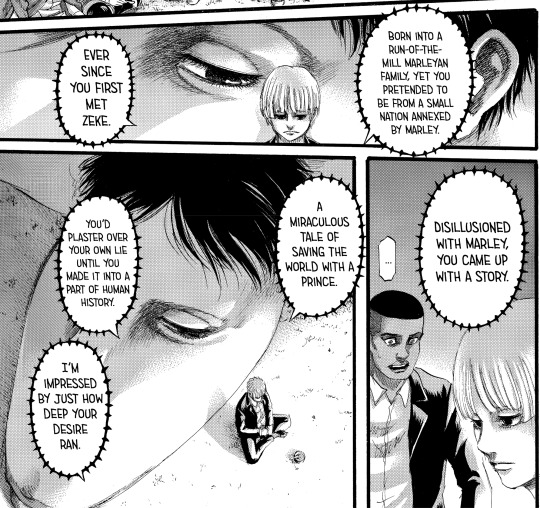
Yelena fabricated her past to make herself look special in the annals of history. Through this conscious deceit she makes explicit what the other members of the alliance have been doing on an unconscious level. The morality of nearly everyone in this series has been based on gaining approval from others.

In other words, to look good. In other words, aesthetics.
The panels focus on Connie, Reiner and Gabi because they are the ones who have had to face the fragile foundations of their beliefs most painfully.

Connie joined the military to make his village appreciate him, and eventually came to understand that the kind of person his mother wanted him to be is more important than any praise he might receive from her.
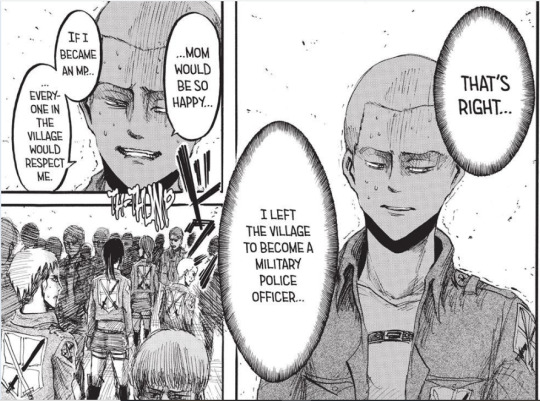

Reiner wanted to become a hero so his mother would be proud of him, his father would accept him, and, after being humiliated repeatedly in the Cadets, everyone would respect him.
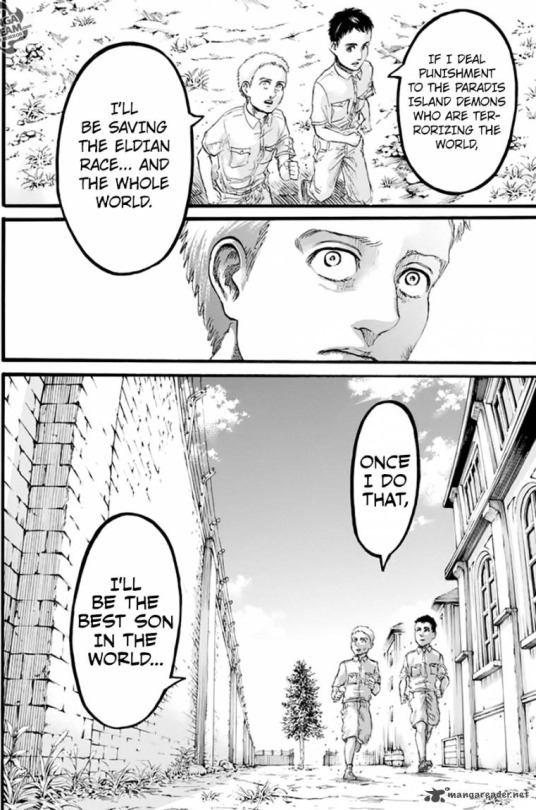
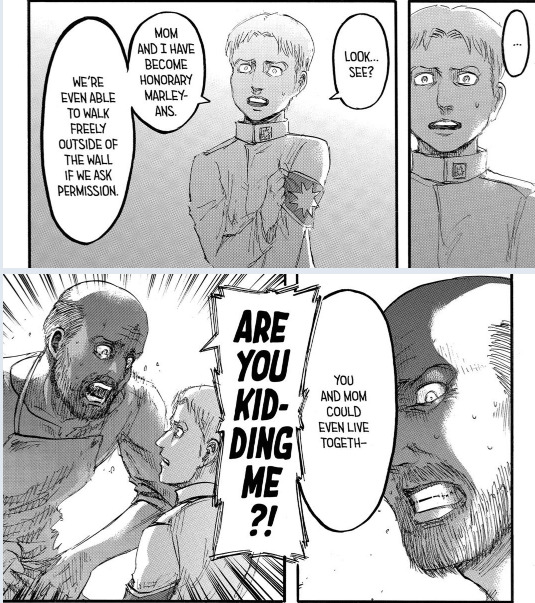
Upon realising the weight of his crimes, he becomes suicidal with guilt that he committed genocide for such childish reasons.
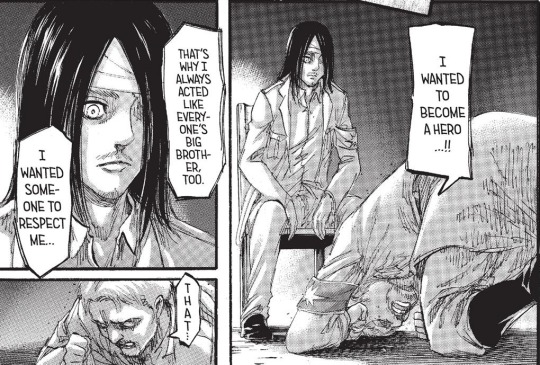
Gabi joined the Cadets so she could make a performative act of redemption and be accepted in her society, but became penitent when she realised the consequences of her actions.


The others, however, are not free of this sin: they simply have not looked it in the eye.
Yelena might argue that:
Mikasa felt valuable only in her ability to care for Eren, and this was her reason for joining the Corps. The source of her value rested in him.
Armin’s desire to see the outside world was not a matter of seeking approval, but then, that was never his moral calling. The moral calling that made him join the Corps was to prove to Eren and Mikasa that he’s not just a burden.

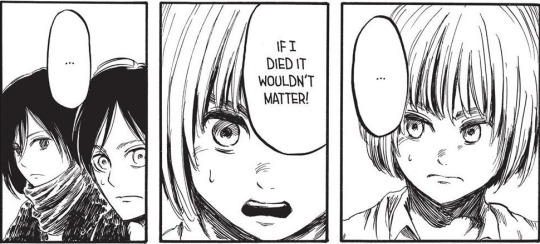
Jean joined the Corps to live up to Marco’s evaluation of him, i.e. to gain his posthumous approval. Likewise, he is now driven to act by Marco’s judging eyes.

Levi’s primary motivation is to carry out the wishes of the fallen in their stead. The reason he places this burden on himself? Guilt that humanity’s strongest soldier couldn’t protect them. He wants to redeem himself in their dead eyes.
Hange is similarly acting under the pressure of their dead comrades, even while they would rather run away from it all.
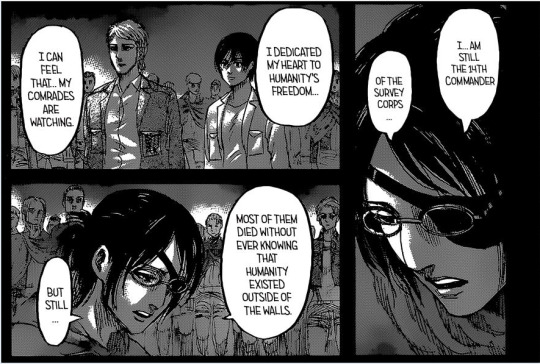
Annie became dedicated to the Warrior cause for the sake of returning to her father, the person whose approval she cherishes the most.
Pieck became dedicated to the Warrior cause because of how deeply she values the bonds between comrades.
As for Magath, we don’t know enough about him to decisively judge. However, based on this:

I would suggest that Magath and Marleyans on the whole feel compelled by their dead ancestors to despise the race who persecuted them.
Falco’s case is especially interesting, but we shall get to that later. For now, what’s worth noting is that the value systems followed by these characters have all been fuelled by that recognisable, pathetic and all-too-human drive for one’s life to mean something in the eyes of others. The latest push of these characters to save the world is, in Yelena’s eyes, just another way to seek approval from an abstract audience: to be justified in the eyes of history, like she wanted, whether in the generations of the future or in the ghosts of the past.
If traditional morality is built off such a pleading basis, then its adherents are merely slaves to others. It is very fitting, then, that the character they have all allied against is the one who hates slaves above all else.
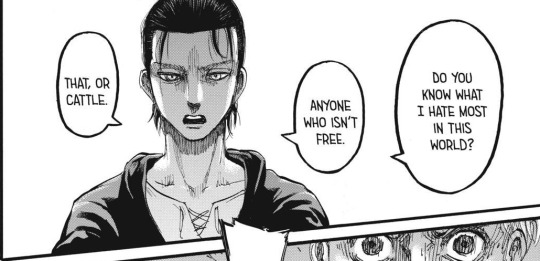
Eren was once such a slave. He realised how much he wanted to be acknowledged as special in the Uprising Arc, laughed at and underestimated as he was as a child, lonely as he was after losing his parents.

It is an illusion he thoroughly discarded. Freeing himself from those bonds, he can now follow the course of his own will unfettered by concern for others’ approval - unfettered by morality. He is willing to be the villain.

Yet in the eyes of many citizens of Paradis, Eren is a hero.
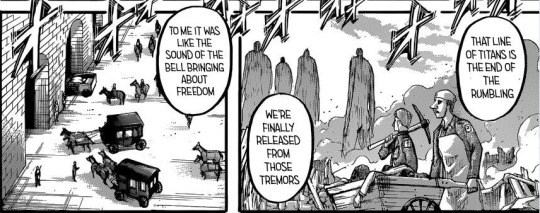
This, however, is largely incidental for Eren. He has made it very clear that his comrades in the 104th matter more to him than anyone else - if it were approval he were looking for, he would never trade theirs for the likes of Floch’s.
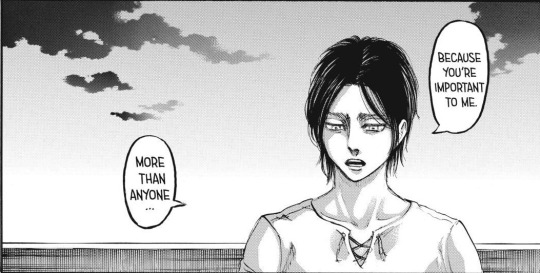
Rather, Eren has come to realise how fragile, aesthetic and ultimately meaningless morality is. If one follows the course of their will one is bound to be called hero by some and villain by others. Eren thus strives beyond good and evil into a new realm of his freedom - willing to be despised and never forgiven even by the people he loves most.
It is at this point we can return to Falco. Eren sees himself in Falco during his stay in Marley.

Falco is willing to earn Gabi’s hatred in order to protect her by stealing the thing she wants most. In this way, even though it is for the sake of another person, he is still following his own will and is not acting out of the desire for approval.
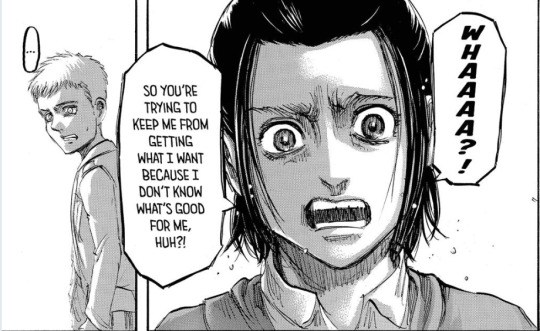
Just so does Eren act for his friends’ sake because he loves them, and not because he wants them to view him in a certain light.

If what we have discovered so far is true, then Yelena’s analysis is accurate. This alliance is not a demonstration of humanity’s nobility, but its vulnerability: a collection of broken people hopelessly thirsting for validation. For that, and that alone, seems to be the fundamental basis of morality.
Here, the metafictional aspect comes to light. The coming together of enemies to defeat a common, greater enemy is a classic trope in uplifting stories about mankind’s capacity to understand one another. Yelena exposes how the alliance are simply telling themselves this sweet story to regain a sense of worth; to believe everything up to now has been worth it; to believe they can be redeemed.
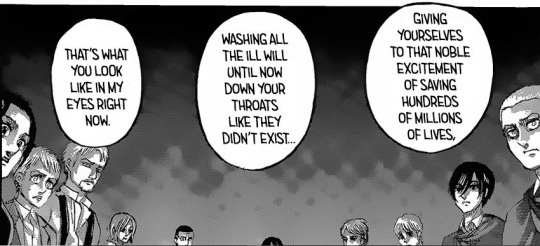
But the real story that they’re in has always been sceptical of this trope - at least in the eyes of Eren, who disdains the morals of subservience.

This kind of storytelling-based morality is apparent in our own experience of the series.
Who we deem good and evil at the start is based entirely on the narrative established by the Paradisians, as we are only allowed access into their heads. But when we come round to the start of the Marley Arc, we are presented with a very different picture of things: our heroes are the spunky Gabi and the cautious Falco, fighting against Eldian devils to redeem the sins of their people.
Nothing has changed except the perspective. When morality is this subjective, how can it make any claim to truth? How can we make any decisions based on such a shaky, unsubstantiated premise?
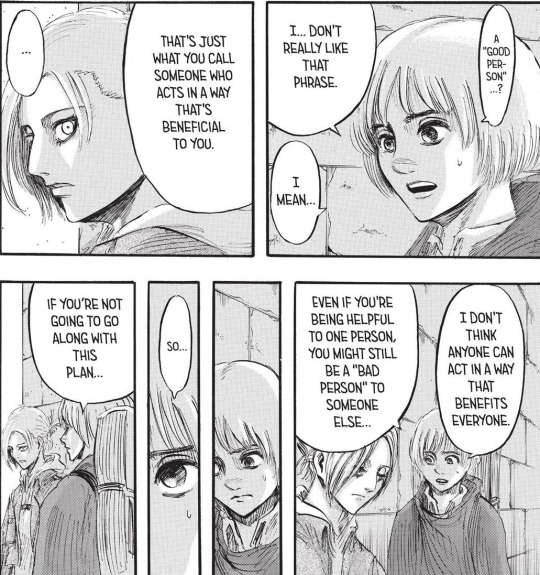
Yet despite all this, it is Eren’s amoral actions which will lead to the annihilation of the vast majority of humanity. Morality may therefore be a necessary yoke. Only, this conclusion is problematised by the fact that everything that has happened since the collapse of the Eldian Empire - that is to say, everything that pushed Eren into this situation - were decisions based on moral judgements.
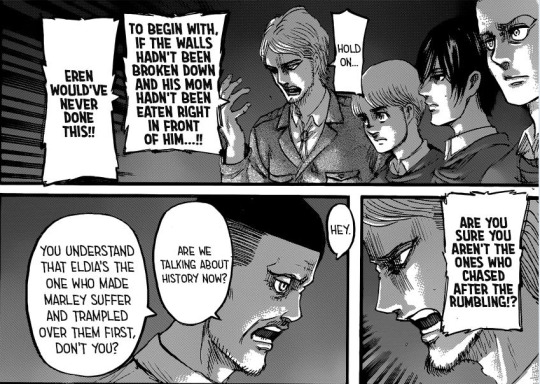
Now we enter into the series’ most testing paradox: that the world which was doomed by moral decisions can only be saved by moral decisions.
Whither shall we fly? Outside of morality, or back into it? Is it our shelter or our prison, our curse or our salvation? Or perhaps the paradox means that this entire discussion is essentially meaningless - for humanity’s good or ill, there is no escaping morality. We ineluctably return to it, begging for the antidote for its own venom; and so the cycle of historical mistakes continues to revolve, unbroken.
Who, then, can say that we are free?
209 notes
·
View notes
Text
Day 2: Symphony Impossible to Play
Picking up from yesterday, we just met Rose.
https://homestuck.com/story/220
Right out of the gate, here’s something interesting - another one where a character interacts directly with her medium! I wonder whose eyes she feels on her. Are Rose’s Seer powers allowing her to detect us watching her? Later on, it turns out that Kanaya was watching her all along during her intro. Maybe that’s who she senses? I think it’s possibly both of those, and a third option - Rose is a paranoid girl who doesn’t feel very secure in her own home, or comfortable in her own skin.
More after the break.
https://homestuck.com/story/223
John does a lot of roleplaying, and this is one of the earliest spots in the comic where he does this. Specifically, John performs a lot of his favorite scenes from different movies, and no surprise to anyone, almost all of the times he does, he’s performing either the role of a lover, or of a father. Malo, who I respect a lot, talks a little about John’s appreciation for signifiers here, along with some of their chums. I was going to say something about other points where John’s inner voice comments on the necessity of signifiers to make a thing itself (OR ELSE IT’S A PRETTY PISS POOR EXCUSE FOR THE THING) yesterday, but I didn’t have the thoughts fully formed at the time. Luckily, Malo will call attention to it for me.
This is another one of those weird things about the way that reality works, and it might all retroactively work that way because John expects it to work that way. Homestuck is full to bursting with symbols - everything in Homestuck is extremely abstracted as part of the art style, and also as part of the storytelling, often rendered down to some basic elements that make it recognizable. An example of something Homestuck uses as a symbol would be like, Mustaches - a symbol associated with Grandpa. Swords, symbols associated with Striders. The symbol doesn’t have to have any kind of literal logical association with the thing it represents, but we associate the two things with each other because of cultural context.
https://homestuck.com/story/225
I always liked Rose’s house best out of the group. There’s something deeply romantic to me about the premise of a wooded retreat far away from civilization. I’m pretty sure the Lalonde residence is based on Falling Water but I could be mistaken. As long as I’m thinking about Symbols, by the way, Cats are a Lalonde Symbol. Their presence in the story always evokes Lalondes even when they’re not in the room (which is not very often, as it turns out!) and by association, witches. Both of the Lalondes are witches in the sense of being powerful women who attain to that power by consorting with dubious and transgressive sources.
Rose is up front and melodramatic about her not so great relationship with her Mom, and it’s pretty much literally always on her mind. (Rose’s Mom is an alcoholic, and I should be clear that her relationship has lots of reasons to be not great, but Mom Lalonde deliberately being spiteful to Rose is not one of the reasons). I like to think there are a lot of these misunderstandings between parents and children and if that we were just a little more open with each other, we’d find that we didn’t have as much to be afraid of in each other as we think. But I might never know. Another one of my favorite series that has the inability of Parents and Children to communicate with each other as a central theme is Hideaki Anno’s Neon Genesis Evangelion and if you haven’t watched it, I highly recommend you go do so.
https://homestuck.com/story/231
The presentation of the Guardians is so unsettling that in my first readthrough, I thought they must be some kind of monsters artificially imposed into these characters’ obviously artificial lives to create difficulty for them. Clearly, I thought the story was going in a completely different direction than it actually ended up going.
https://homestuck.com/story/236
Rose does not always think her cunning plans all the way through, something she has in common with her biological father.
https://homestuck.com/story/271
I probably could have mentioned this funny little guy earlier than I did, but Wayward Vagabond is in the story now. I’m not totally clear on whether the Carapacians have any greater meaning, but they sure are charming, and like just about everything that isn’t specifically John and his friends, they exist on a layer of the story that is just a little further away from just the text, and a little closer to the audience - they can enter narrative prompts, much like you or I would have if we were involved in Homestuck’s earliest pages. As a rule in Homestuck, the more influence you personally have over the narratives which change the material conditions of the characters’ lives, the more sinister and ambiguous you become. Luckily, WV turns out to be a pretty benign guy, but if you’re the sort of person to be reading this, you are no doubt aware of the fact that most of Homestuck’s narrators don’t turn out to be nearly so friendly. The Carapacians introduce us to the idea that characters in the story are allowed to be audience members and narrators too. So I guess, really, that’s the greater meaning of the Carapacians.
https://homestuck.com/story/272
Always enjoy Rose’s long, outlandish metaphors. Any chance to read more of them is a good chance to. (Although the main one on this page is a holdover from some of the cringy stuff in MSPA’s early days - some of it slightly racist, some of it slightly homophobic.)
https://homestuck.com/story/287
Andrew’s insistence on having characters like Dave rap at us, the audience, actually reminds me a lot of JRR Tolkien’s tendency to pepper his stuff with songs that he wrote for his in universe stuff. And while both are legitimately talented at their craft, as one of my friends put it, “I’m not a rapper... so stop rappin’ at me!”
https://homestuck.com/story/293
Jade is another character whose first post I forgot to mention, but here she is having a bit more to say than before! I think I remember my initial impression of Jade being pretty favorable, and then gradually declining until she got a bit more exposition. Perky people bother me.
https://homestuck.com/story/307
Another one of Andrew’s cool prose poems. I don’t mind these as much as the rapping, clearly. Rain and Strings are another pair of symbols pretty strongly associated with Rose, although I hardly need to tell you that. This obviously alludes to Rose’s mythological quest. I think it also foreshadows a lot of her worst decisions. Rose overthinks and overthinks and overthinks, and then by the time she should have acted, it’s too late, and she overreacts instead, usually in catastrophic ways.
https://homestuck.com/story/312
Dave’s room isn’t nearly as messy as Rose’s, but his bed isn’t made, same as every other Derse Dreamer. This is also probably the first place that we get hints of Dave’s fascination with death (he collects dead things). He’s specifically fascinated with his own death, and fantasizing about self-sacrifice, something that he ends up doing twice over the course of the comic, is one of the ways that Dave experiences masculinity. Thanks for that, Bro.
https://homestuck.com/story/320
Dave almost immediately fails to uphold his irony schtick within just seconds of our getting to know him. For all that he pretends to the same extreme aloofness as his brother, I don’t think there’s an insincere bone in Dave’s body. Then again, maybe he’s just getting distracted by food, of which there is a significant dearth in his household. Thanks for that, Bro.
https://homestuck.com/story/326
I will never get back the time I spent reading Sweet Bro and Hella Jeff. Was it worth it?
Yeah probably.
https://homestuck.com/story/332
I think this is the very first time I’ve noticed that Dave has a nifty gaming computer with the transparent glass pane and the interior lights and everything. Like, this readthrough, this panel. I’m sure I mentioned somewhere that I get more out of this webcomic every time I read it.
https://homestuck.com/story/333
Dave and Rose are another character relationship I just enjoy tremendously. Their verbal sparring is one of the highlights of the webcomic.
https://homestuck.com/story/344
Bro’s puppet fascination tells us pretty early on that this is a hands-off, manipulative kind of guy. While Bro isn’t in a metanarrative layer the way that the Carapacians are, positioning him as a puppetmaster, controlling things from behind the scenes, still gives him the same kind of sinister ambiguity as one of the comic’s actual narrators.
https://homestuck.com/story/357
Far from being the kind of chill cooldude who kills with a straight face and doesn’t look at explosions, Dave kills a random bird and immediately feels remorseful about it. Poor kid.
https://homestuck.com/story/360
There is almost nothing worse than having someone perform interest in something you enjoy to try and influence you. Unfortunately, that is not what is taking place here. Rose is quick to assume malicious intent as she does a bit earlier when she tucks her journals under her bed because she feels like she’s being watched.
https://homestuck.com/story/369
Mom, sadly, giving your daughter oodles of presents and showering everything she does in ostentatious displays of affection is sadly not a substitute for earnest communication with her and your emotional presence. These two need to learn each other’s love languages. (Note to self. Not everybody enjoys lavish presents as much as I do.)
Roxy is a giver. That’s something that shows up time and again, especially when we meet her in person much later.
https://homestuck.com/story/377
Mom Lalonde performs femininity.
https://homestuck.com/story/382
Jade sees right through Dave.
In other notes, I think most of these kids would be way happier if their Guardians were more emotionally available, and less badass.
I’m going to come back to that and write more on it at some point instead of just alluding to it repeatedly. Maybe after Dave Strifes with his bro.
https://homestuck.com/story/389
Is Mom’s compulsive gift-giving because that’s her love language? Is she performing capitalism by giving her daughter extremely expensive gifts as a show of affection? Is it both things? (Roxy is never exposed to Capitalism except by the awesome powers of Dirk’s cached wikipedia archives, and her gift-giving tends to be significantly less ostentatious than Mom’s.)
https://homestuck.com/story/404
John roleplays some more.
https://homestuck.com/story/414
Here’s where I’ll say one of the things that I think is like a big deal, because I guess now’s as good a time as any. A lot of the roleplaying that John does, and the one-upsmanship that he and Dave do with each other, and Dave and Bro do with each other, and Mom’s ironic housewife routine, and the burial of Jasper in a mausoleum are rituals. Like symbols, they’re cultural touchstones that are ultimately empty when they no longer point to the thing that they signify. Funerals are grieving rituals. When a funeral doesn’t functionally serve the purpose of helping with grief, it becomes an empty signifier. Maybe this is how Mom grieved for Jaspers - I’ll have to check and see what Roxy thinks about it when I get that far, because I forgot.
We do a lot of stupid things in a monkey see monkey do fashion because we’ve just always done them that way, even when they were built for a completely different society, and no longer serve the same function that they used to serve. Big ostentatious funerals are like that, I think. Ideally, they’d give big families an opportunity to come together in mutual support, celebrate the joy brought to them by the deceased, demonstrate compassion to the grieving, and so on and so forth. I’m not prescriptively saying “don’t have a funeral” here, my point is just that funerals are one of those cultural narratives that I mentioned in the first post.
This funeral does not serve the function of helping Rose to grieve. It’s just kind of fucked up.
https://homestuck.com/story/415
Oh hey, Rose has more fish language attached to her - she earlier makes reference to her knitting-needle tech by saying that she thinks she could probably filet a fish with them. Here, she talks about having bigger fish to fry. Rose is associated with Water through her planet, the Land of Light and Rain, and with fish through Cetus. She’s also attached to other deep sea creatures in the form of the horrorterrors.
https://homestuck.com/story/420
I’m going to pause for now and post this since I’ve read through another roughly 200 pages of Homestuck this evening on the fortuitous page of 420. It probably helps that I started earlier than I did yesterday. Nanna’s about to give some exposition, and I already wrote my big brain take for the day so for now;
Cam signing off, alive and not alone.
7 notes
·
View notes
Text
Doc Loves Watership Down
FUCK DO I LOVE WATERSHIP DOWN. I love Watership Down. I love it so very much, it is without a doubt one of my favorite books of all time. It is the book I shove into people’s hands if they haven’t read it. (speaking of @rosepetalrevolution, did you ever finish it? You have the copy that has my notes ahahah.) It’s the only book or TV series or anything I’ve considered getting a tattoo of. I have El-ahrairah and the black rabbit in a circle on my jacket. I love it so much that if I had to name my kid a “fandom name,” Hazel would be one of a very short list (I would not, children are not billboards for your fandoms).
One of the discussions I often get into is “Watership Down isn’t a children’s novel” well it did in fact win the Guardian award for children’s literature and the Carnegie medal. I would unkindly argue that dark and intense books have long been part of children’s lives: Where the Red Fern Grows, Old Yeller, Bridge to Terabithia, etc. But in the last, oh, 20 years or so, and you see this in children’s movies too, there has been a movement to take the teeth out of everything. This is not because children are incapable of grappling with painful and difficult things, but because adults cannot handle helping their children navigate fear and sadness. It vexes them. Fear and sadness in fiction helps us learn how to deal with grief and cowardice and all manner of things. MAH SOAPBOX.
I wonder if my take on children’s lit, and ability to handle such things, doesn’t have something to do with my being Jewish. White goyische kids really don’t have to stare down the barrel of life, and so their parents value them keeping their ‘innocence’ and not being upset, but , this is not really an option for Jewish kids, who learn very quickly that the world will literally murder us in a grand swatch. We read fucking Number the Stars in second grade, there was no hiding it. So forgive me if I don’t feel bad that Brandlyn cries over a dead rabbit. She’ll be fine. It’s a learning experience.
I was 6 years old when my mother first read me Watership Down. It’s so strange, I’ve read Watership Down at least 25 times over the course of my life, and it’s been a different experience as I’ve gotten older and older. I can only speak about this in broad strokes as its the non-spoilery part of the gushing, but I think it stands up to rereads, and I think there’s plenty for an older reader to pick up in it.
In the fashion of a great deal of British Literature, it’s not written in a simplistic way. In fact, I think for your average 6-8 year old, it would almost certainly have to be read TO them. I have a weird perspective on stuff, as I was a VERY advanced reader, and so I don’t always know what kids can physically read. But I think your average 10-12 year old could read it. But the beauty of it really rests within that language, within the way Adams describes things and lays out the Lapin culture for you.
For really, this is one of the great strengths of the book: Rabbit life and culture is very different from human life and culture, and Adams does not shy away from that. The culture is incredibly well thought out, the myths are satisfying, and the motivations that drive them are utterly alien to our own. Adams writes about the rabbits and their culture in a way that is never sentimental, and always unblinking. Some people, I think, don’t connect with this. They’re much more used to what I might call a “disney-style” look at animals, where they are essentially humans with fur. Adams does not indulge in this, even slightly.
If you appreciate the massive world building of Lord of the Rings, you will appreciate Watership Down.
There’s also a real balance between the strengths of the rabbits, as well. Physical toughness is not devalued, it has its place. Cleverness has its place. Storytelling has its place. Literal prescience sometimes is not the most useful card in the hand. They all take their place and their part over the course of the novel. Everyone has a use in this, and only with all of them can they make it to where they need to go.
Ultimately, it’s a story of survival, and of dedication, and of the will to keep going. It’s a story about being clever and full of tricks, and outwitting your enemy. It’s about man, in parts, but ultimately its about what it means to be a rabbit, about the making of a hero. It’s about overcoming horrors and struggle in order to make something for yourself, and I think its a terribly strong novel. Right at the top of my list.
Spoilery under the cut
There’s a quote from a magazine or newspaper that says something to the effect of “If there is no room for Watership Down among children’s literature, then children’s literature is dead” and that’s basically my spicy take on the issue. Watership Down affected me more than any single book I read as a child, I think. So much of what I carried through into adulthood, so much of how I see myself and my place in the world, comes from this book.
And how do you not love a book that takes the destruction of the warren, the killing of so many rabbits, and instead of doing the weak thing and having it be all about how some farmer or whatever the fuck ever hated the rabbits, it comes down to “We were in their way. They killed us to suit themselves.” It’s a greater accusation of human nature than most things would dare to me. It’s brilliant in the way it conceives of humanity up against rabbitkind, not even so much as enemies, but creatures living in contest with each other.
When I was, oh god, probably in high school, I reread the book, and I saw it as an inherently Jewish book, about having to outwit all those who would try to kill you, about having to create your own home. Years later, I read a really good article from Rachel Kadish, who writes, just, great Jewish books, and she said she had the same experience, but she was smarter than me, and pointed out that so many people see their own journey in Watership Down, and that’s part of the genius of it. SO many people can read the story of their own heritage and culture onto that, or their own personal lives, and I think this is why it endures so fiercely. It connects to us all.
Much has been made of the fact that the female rabbits are only picked up for breeding purposes, and that’s a fine and fair criticism. But I am not of the mind to throw the baby out with the bathwater, and I think that rabbit culture is different enough from our own that for me as a kid, it didn’t bother me. If anything, it’s a fantastic point to introduce one’s children to the concept of ‘fix-it fic’ and ask them to imagine female rabbits, and what they might do, and how they might contribute beyond digging the dens and having children. But I am a fan of acknowledging when something doesn’t work for one within a story and fixing it yourself, or talking about it, versus simply 86ing it, if there are things one determines to be worth saving. I can’t live anyone’s life for them though.
One of the most important things to me about the book is that it ends with Hazel’s death after a relatively long and happy life. That is happily ever after, in the only real way it ever comes, and I don’t think many children’s books entrust children to be capable of learning that. And it’s not traumatic, Hazel literally ends up in the Owsla for El-ahrairah. It IS the happy ending, and it’s a good lesson for life in general, that to die fulfilled is a wonderful aspiration indeed.
22 notes
·
View notes
Text
Invitations and Reservations
A/N: Hey Guys, this is my first post to my blog. I wrote this story for the lovely, @burnedbyshoto. I got a little anxious sharing this story since the beginning is a tad rough, but please be patient with me while I get back into the groove of good imagery and storytelling. Thank you to all of you that took the time to read it, I appreciate all constructive criticism, and I have made the proper edits.
Pairings: Shouto Todoroki X Fem!Reader
Warnings: Smut, Cursing
Word Count: 6.4K
After graduation from UA High School, there was a halt in the friendship you built with Shouto. He was apart of the hero course and you were nothing but a mere general studies student. Meaning you guys wouldn't always be in the same spaces. During your first year, you would pass by him during lunchtime and you noticed that he would sit by himself frequently. You liked the idea of making new friends and thought that maybe he wouldn’t mind if you interrupted his bubble. One day, you were brave enough to sit with him, but he gave you the cold shoulder and with an icy stare he said, “I don’t need any distractions, you can go.”
You were taken aback by his statement, proceeding to leave him alone. You didn’t think about him until after the sports festival had come to a close and still, you were eager to be his friend. You witness him hanging out with the green-haired boy, known as Deku and his trusted friends. This is your chance! You steadily approach the table with the intent of speaking to Todoroki and creating a bond.
Luckily, he saw you coming already and made room for you to sit next to him on the bench. An exchange of smiles leads to honest conversations with the half hot-half cold quirked boy and his friends. Fast forward to senior year, you two have developed an inseparable bond. However, you remember he is training to be the next top hero. Also realizing that the branch would continue to challenge him and that he will be in high demand. Knowing all of this crippled your heart, and left you to be stagnate during the days he was unavailable to talk.
You are torn between accepting the role he will play as a hero destined to be the greater embodiment of All Might and also feeling left behind in that journey. Your quirk wasn’t anything special but it was great for memorizing information related to photographic memory with zoomed-in 10x detail. You regretted not getting into the hero course and fell into a small depression. But after spending some time hanging with your G.S. friends at the sports festival, you understood that you weren’t cut out for the work of a hero and enjoyed being behind the scenes.
Onward, you put your mind to exploring the alternatives. Hero firms were your next course of action. You learned pronto that they were very cut-throat but still persevered. After graduation, you went to college away from your quiet, hometown in Japan to learn as much about the hero business. When you came back, a hero firm in the city had you as their number one choice and you executed all tasks they presented.
Proving that you were more than capable, you were boosted with pay and benefits. You settled into the city, with a great space meant for one soul to be comfortable. And work from Monday to Friday. Occasionally weekends if duty calls, but your personal life was still balanced with leisure and relaxation.
One day in the office, your boss told you that there were files that needed correction at the number one hero firm in the country and you were requested specifically. Surprised, you headed over there willing to assist. As you arrived, you saw the hustle and bustle of the greatest heroes at the top firm in Japan taking charge. An entire 180 from your usual workflow. Heroes coming, heroes going.
As your workload for the day was finished and you were leaving the building, a familiar hairdo caught your eye as they entered the building with their head down fidgeting with their hero costume.
"Todoroki-san?" You glance at his suit, giving him a once over from head-to-toe, he's bulked up more since high school.
As he looks up, his face laced in complete surprise. "(______-chan)?" His smile is grand as he walks up to you extending his own arms to pull you into a bear hug.
His hands respectively rested at your waist as you pull him into a close embrace. "It's great to see you!" You let it slip your mind that Shouto operated at the number one firm and didn’t even focus on the other heroes. As soon as you arrived, you were given a room and all the paperwork was directed into your hands.
As you both pull away, his eyes linger on your body. The curves on you were very enticing for business casual attire. “Yeah, I could say the same.” He smirks.
“Did you just finish up for the day?” You ask adjusting your work handbag.
He nods, ”Yeah, I was dropping off my costume, this one happens to be my back up.” He motions to his chest and your eyes flutter.
“Cool, well don’t let me hold you up. I know you want to go home.” You motion as if to start walking but Todoroki caught your right hand with his.
“Hey, (____), wait,” The skin is callous, but deeply earnest bringing about a tinted color of pink on your face. You look into his mismatched eyes.
“Would you like to exchange numbers?” Todoroki starts fiddling with his other hand to reach for his smartphone.
Todoroki always had the same phone number since you knew him, but during his senior year of college, you heard from Mina that his phone number was leaked all throughout Japan. And during that time, he had a harem of girls lusting after him that he couldn’t break free of. The situation led him to switch his number three times, losing your contact each point since then.
You happily agree and exchange numbers. Joking with him, you tell him that your number never changed and he apologetically tells you that he forgot your number after the second time. A small giggle escaped your lips as you tucked a loose strand of hair behind your ear. You wore it down for today since the weather was sunny with a light breeze.
Shouto goes in for another hug this time tighter, and says, “Please, don’t be a stranger. If possible, I would like to see you again.”
Your heart leaps out your chest and as you pull out of the hug, you peer into his face. Before you can say anything he stammers, “I know it's late and all but if possible, I would like to take you home.”
Still in the embrace, your face flushes and you nod without a word. “Great, give me a moment to put this away. Actually, do you wanna come up with me?” He releases entirely from his grasp and motions to you if you want to take the trip.
You shrug, looking at him in sheer delight just from seeing him again, “At this point, I’m down for anything, Todoroki. I was just gonna go home after.”
He smiles kindly, “Okay. Well, follow me.”
Together, you spend an additional thirty-minutes as he shows you the building. It’s filled with laughter and wonder. After he changes out of his costume and into regular clothes, Todoroki reaches for his keys on the desk. “We can make our way to the parking lot now.”
You reach his vehicle and notice it's a very stylish, new model from the current year. “Let me get your door,” Todoroki jogs to your side of the car. As he opens the door for you, you enter cautiously not to snag your heels on his car mats. Flirtatiously you say, “Wow, what a gentleman.”
He picks up on your flattery, “Thank you, a lovely woman such as yourself will bring it out of me.”
You blush from his reversed flirtation as he enters the driving side. He asks where to and you give him your home address. As he drives, you shift your eyes from the road to look at Todoroki. Several colored lights flash through his face as the two of you ride through the stoplights and reflective signs.
You gaze toward his face, embracing his side-profile. His jawline is more defined, hair is longer, eyes looking worn from the day. For a split second, he makes eye contact with you before focusing on the road. “Are you okay?” His deep voice echoes through the car sending chills down your spine.
Honestly speaking you say to him, “Yeah, I’m fine. I’m just looking at you.”
“Oh, you see something you like?” He asks.
You smirk in his direction, “Very much so.”
The rest of the ride is quiet but filled with high levels of tension. It’s not stressing, more like the realization of one’s attraction to the other. Shouto grips the steering wheel holding onto what he’s wanted to say since staring into your eyes at the firm. He takes a slow and steady breath, his jaw tensing up as he does. Stealing glances of him and breathing the same air made you come to grips that your crush on Todoroki is not completely over. You want to see more of him.
Finally, you reach your apartment complex. Your body stills as he parks the vehicle on the street near the sidewalk entrance to your building. You can’t bring yourself to leave the car. There’s so much you’ve wanted to say to him since high school and now that you’re here with him you’re frozen.
“Listen (____),” Shouto breaks the silence, ”I’m truly happy that I bumped into you.” He stares into your own eyes. “It’s the highlight of my day.”
His smile gazes deep within you, pulling a heartstring. Boldly, you lean over to his side of the car, caressing the left side of his face to turn to you. Leaning closer to massage your lips to his. The kiss was slow and passionate. His hand rubs your thigh while the other pulls you closer to him by your waist. A groan escapes his lips as a heavy breath leaves your nostrils. You’re not ready to end the kiss, you grab a handful of his hair to stop him from pulling away. But he had no intention of doing so.
The lip-locking gets rough and creates a lack of oxygen and you both pull away just to catch one’s breath. You sit back holding your hand to your chest. Looking over at him, his eyes haven’t left your mouth. His eyes trail down to your body then back to your eyes. Your chest was exposed showing a delightful amount of cleavage in your cotton-like, v-neck blouse. He bites his lips in desire.
“Do you want to come upstairs?” You ask him softly, almost louder than a whisper. “I know it's late. But, I wouldn’t want you to drive home if you’re exhausted.”
Shouto’s face heats up, the question caught him off guard. Looking at you, he sees that you’re a little flustered asking him but he knows that you’re worried about his well-being and that you always have been. He nods and as you two find better parking. You head upstairs and immediately apologize for any mess left out in your haze to get ready for the day. He assures that you don’t need to apologize.
Unlocking the door, you promptly take your high heels off and slip on your comfortable and plush house slippers. “Please make yourself at home.” You plop onto your camel-colored couch releasing a sigh.
Shouto sits next to you, he's looking a little stiff but relaxes when by your side. His eyes linger again to your exposed cleavage as you lean back taking a deep breath. His eyes widen from watching your chest rise and fall.
You look at him asking, "Are you thirsty?"
He jumps thinking he’s been caught staring, "Uh yeah, I am." He blinks away quickly.
You stand up to walk around the corner and enter your kitchen. "Anything in particular? Juice or tea? Maybe wine?"
He shouts over his shoulder, "Wine is fine."
You pull out the red wine from your fridge and let the door close on its own as you open your cabinet to your wine glasses.
After carefully holding the glasses in your hands, you walk your way back into the living room and set the bottle down along with the glasses. He separates the two and asks if he can pour, you accept as he unwraps the bottle. You forgot the bottle opener and strut back to the kitchen to retrieve it. With another plop onto the couch, your thigh brushed against his.
It was an accident but you’re not rushing to move. The warmth from his leg is comforting and you feel calm against his body heat. You haven’t been this close to him in so long and it shows as you exhale softly relishing in Todoroki’s company. He hands you a wine glass and you thank him graciously. He works the cork out of the bottle and pours it into your glass then his.
“I would like to make a toast between the two of us.” His deep voice echoes through your modern themed apartment.
“Let’s hear it” You grin in his direction.
“To the odds of us meeting again,” He stares into your eyes, “Had I not taken a late shift patrolling, I wouldn’t even be here right now.”
Your smile is evident to him, “True, but also my boss made this possible.”
“How so?”
“He told me your firm needed me today. You guys were backed up with months of paperwork.”
“Really? The things they don’t tell me.” He rubs his head, bewildered.
“Well as apart of the top five heroes in Japan the last thing they want to do is worry you with problems they could give to another. You already keep the city safe.”
“Yeah, although that’s odd. How did you fair out?”
“I finished it all.”
“What?”
“I fixed all the hitches.”
“In a single day?”
“Yes,” you giggle, “Can we drink now?”
Shouto’s thrown off-guard but wastes no time clinging your glass and taking a long gulp. It seems as if he’s needed this drink. Your sip matches his as you make eye contact with him. You stir the wine coating the glass. The wine is sweet and smooth as it glides down your tongue. He sets his glass down on your see-through, glass coffee table.
“So please, tell me how you managed to finish months of work in a day.”
You tease him, “With hard work.”
For the next hour, you and Todoroki are reconnecting and sharing what’s happened in your personal lives. Sharing experiences from college, reminiscing when you both attended UA asking who you still speak with from your classes. Although you weren’t apart of class 1A you were able to become close friends with Mina and Toru. The three of you would go shopping, and at times you would have to remind Mina what matches since you were the most fashionable of the three.
Todoroki was able to keep in contact with most of 1A, except Mineta. He shared several stories after becoming a hero. Some made you laugh and the others shocked you. He showed a couple of battle scars that smoothed onto his arms and chest with time. You pretended that you didn’t like the view of his bare chest for mere seconds but it was obvious to Todoroki when you were tracing his abs. The conversation continued to flow and you whole-heartedly felt fortunate.
A yawn escaped Shouto’s mouth. “Oh man, I wore you out didn’t I?” You ask clearing the coffee table of the two large wine bottles you two dusted off with ease.
“No, I’m just very comfortable.” He smiled sleepily.
You smirk, “Well if you like my couch, you’ll definitely like my bed.”
“What?” His head shot up to look at you.
“I’m too tired to sleep by myself. Do you want to cuddle?”
You two have been drinking since stepping foot into your apartment not making any flirtatious moves to progress the night into something else. But liquor of any form is considered as a truth serum. And for once you said exactly what was on your mind.
Through tipsy duo-colored eyes and a bright pink face, “Yes.” Finally came out of Shouto’s mouth.
You reached your hand out to hold his, he extends to touch yours and you lift him off the couch to lead him to your bedroom. Immediately, Shouto’s eyes widen as he sees how dainty your room is. He’s lost in the scent of lavender and can tell that you took pride in decorating your room. You guide him to sit on your queen-size bed as you finally strip out of your blouse and tight skirt.
“Hope you don’t mind, but I’ve been wearing this all day,” Motioning to your outfit of the day. You strut near your dresser wearing nothing but a bra and panties looking for pajamas. You turn your head to tell Shouto to get comfortable and gaze upon the half-hot, half-cold man to see him steaming. His eyes haven’t left your body since entering your room.
Your laugh fills the room, “Shouto, can you get comfortable?”
“Are you sure you want me to stay in here as you’re changing?” His voice sounding drunker than he looked.
“Yes!” You smile tenderly throwing him oversized grey sweats, “Don’t worry they’re mine.”
He catches the pants in his hands, shrugs, and changes into them with no other words. You head to your bathroom just to remove any makeup from your face and quickly do your skincare night time regimen. “Hey, Shouto!” You call out to him while moisturizing your face.
“Yeah, (_____)?”
“You wanna be the little spoon or the big spoon?” You playfully asked him the question as you once had during a time back at UA, he didn’t know what you meant and couldn’t tell you what he wanted. You let it go after seeing his confused face. You walked your way back into your bedroom and came to a pause. Behold, Shouto completely stripped from his regular clothes into the grey sweatpants and no shirt.
At that moment, you wished you were born with four eyes like one of your general studies friends. You needed a better vision of the perfect symmetry of his abs and the bulge forming in his pants. You can't force your quirk to just focus on one part of his body at a time, it was unfair!
For once, your body moves faster than your mind. Inebriated, you walk over to him stumbling over your own legs. Standing in front of him, still in your underwear, you press your lips to his and lock your arms around his neck. Pushing your body closer to mold into him. The kiss is sloppy yet filled with passion.
You inhale his scent through your nose and softly nibble against his bottom lip. Shouto groans against you swiftly, flipping you onto the bed, gently laying on top of you taking in the beauty of your body. You smile under his stare.
His gaze intense while his lips were intoxicating as they collided with yours repeatedly. Dominating your body and touching anywhere his hands would permit. You hook your arms over his shoulders to pull him close. You track love bites up and down his neck and behind his traps.
His exhale is heavy as it tickles the hairs on the back of your neck. Your moan causes closer contact with Shouto's chest. You're internally dying to feel more of him. You can't wait anymore as your hands unhook from behind his back, to trail to the sides of his sweats. You're in the process of slowly sliding them down as Shouto grabs your right hand.
"Big spoon." His voice is husky this time as they stare into your eyes and it feels like an hour under his gaze. He rolls off of you pulling you close from your waist.
You're bewildered, to say the least. But glad that he found out what the terminology meant. However, the bear hug wrapped around your feminine frame causes multiple sensations. The back of your neck thrilled by his breath, the warm vibrations of his soft snores, and your fingers following the veins on his arms.
I did say I wanted to cuddle…
You mentally facepalm yourself and utter out a tiny giggle. Shouto softly stirs at your voice and you snuggle closer to him.
_____________
Every third Friday night and fourth Saturday of the month you would meet. In the evening it was an upscale restaurant with the finest wine and a remarkable view. Whether the food was splendid depended on the face you made after the third bite. He would look at you and smile wondering if you're enjoying yourself. A smile would indicate 2 bottles of wine and another great conversation.
You would usually catch Todoroki up on the weeks that he didn't see you since phone calls were short and they mostly consisted in confirmation that the other finally reached home. After hero work from different fields, those would be the only words you two could muster to say.
The way you would describe the days was as if it had just happened 5 minutes ago and he admired that about you. Your memory was impeccable and he couldn't differentiate whether that was apart of your quirk or just how you were. Your eyes would light up talking to Shouto as he would stare at you with the most gentle smile.
“So that’s what happened on my end, as usual, I handle what my boss throws at me with ease and keep my cool the whole time.” A grin grows on your face as you swirl your wine glass coating the sweetly, dry alcohol.
“I see, (____), It’s one of the things I like most about you. You're cool-headed in any situation.” He grins, “You know, my offer still stands. I could get you a better position at my firm.”
“I know, but they need me. If I leave, I know they’ll go under.” You shrug with a soft chuckle.
The two of you, look at each other intently, from across the table. Eyes laced with an intense amount of zeal.
Your waiter for the night comes over asking if you're ready to order. It's their fourth time asking and the two of you finally order some food. You're always particular about what to get. You have gone to enough restaurants to make executive decisions on what to indulge upon. And aside from a delectable entree, you had other plans for your mouth.
The true goal of the night was to take Todoroki home and finish where you left off a month ago.
As you wait for the food to arrive, you build on your last conversation regarding bumping into Hagakure and Ojiro.
One of your Saturday dates, Shouto took you to a candy-infused cafe that had a variety of different sweets. You gawked hard at your favorites, mouthwatering damn near. You made a turn to the right and bumped into what you thought was the glass window. But the hypothetical window yelped and you recognized that voice instantly.
“I honestly thought it was the window or that I might have leaned too close to the candy cases.” You chuckle thinking back on your tunnel vision.
He returns the amusement, “She was highly happy to see you. And wanted to spend as much time as possible before we left. ”
“Good thing she saw us together, made her back off instantly.” You take another sip of wine, “What makes matters worse is, Ojiro lost her.”
“But as soon as he found her, coddle city.”
"Right, He just let her get whatever she wanted from the shop to make up for it." You laugh.
"How's that any different from me?" Shouto smirks his lips curves deviously.
You pause for a moment, analyzing his words. Since that day, he's made sure to be there for you whenever he could. The days never went without hearing his voice, or him just knowing you didn't eat your whole shift. He respected your workflow and just wanted to lighten your load.
"Mmmm touchè, good sir". You playfully cross your arms. “But you’ve never lost me.”
“That’s not true,” He said. “I lost you for five years.”
Since your impromptu-turned-heated hangout, he always sent you lunch to your office. Sometimes, just for you other times, your entire office. Showing his gratitude to the firm who saw your potential and hired you.
“And now we’re here.” You smiled curtly.
The restaurant was extravagantly laced with gold trimming on the walls, tables, and chairs. The silverware its self had to be of a high carat too along with the cleanest and most prim plates ever gawked at. The high ceilings gave off the effect of endless beauty and royalty. You’ve only heard of the accolades given to this establishment but didn’t expect yourself to be seated in it.
Your food finally made its way to your table, as soon as your plate was presented, you wasted no time. You took your three make-or-break bites submerged with flavor. Another mouthwatering selection causing you to beam. Locked in the warmth of your enjoyment, Shouto looked on at his sweetheart. Pleased to see your own satisfaction.
There was no discussion but the two of you were certain to feel each other's warmth again. With your schedules lining up to be free for the entire weekend, you planned to take advantage.
As the night progressed, you were already in his car heading back to your apartment. It took fifteen minutes to actually start driving. The satin dress carving your body had Shouto's hands all over you. Cupping your ass, rubbing his hands rough on your hips, his mind trailing into another atmosphere as your lips touch. Indulging in the warmth of each other without being nude… yet.
The time to get into your apartment was shorter than the attention span of a squirrel. You two emptied the possibilities of extra movements and conversation making it known how you want to end tonight.
In passing by your living room, Shouto presses tattoo kisses along your neck and shoulders. His big calloused hands are wrapped tight around your waist, his grip is demanding and needy, “(______), I want you.” His deep voice ringing in your ears as you moan slightly from the heat.
You unravel yourself out of your jacket letting it fall wherever allowing Shouto to guide you into your bedroom. The scent of his body brings you a familiar euphoria. The dampness of your heat forming more as you strip him out of his shirt.
With little instruction, Shouto watches you unbutton him straight down. He looks at your sensual form, packed of lust. His large hands resume roaming the lower part of your body stripping you of your dress, cupping your ass in the process. As he rolls it up, you arch against his touch pushing your breasts into his face.
He takes the opportunity to grab hold of them and place kisses in between where they meet. Your heart beats fast and the blood in your body rushes to your head causing you to become lightheaded. As you fall back, Todoroki lifts you up as you wrap your legs around his waist.
He turns his body around to lay you down onto the bed. His movements are calculated and gentle.
As he lets you go, you shuffle slowly, needy for his touch. You look up at him, his chest heaves slow, you watch him unbuckle his belt then work on his pants.
"You look so fucking delicious." The color pink paints your face heavily as Shouto praises you.
Your sexy, disheveled body looks up to meet the man who had given you wet dreams since you let him into your apartment the last time. When he left in the morning, you relished in his scent, making your mind go within complete desire mode. You edged yourself for the moment that he would be in your bed again.
“Take off that dress, those panties and spread your legs for me, baby.” His order rung loud and clear into your head.
Automatically, you start to follow his directions moving incredibly slow. Making sure to expose your body beautifully. Securing his attention, your eyes strayed to his growing bulge, your little strip show turning him on further. Tonight you wore a lacy thong that hugged your curves, laying back onto your bed you slid them off. Not necessarily were you double-jointed but your body was in mint condition for abstract activities.
As you spread your legs wide, a deep sigh leaves Shouto’s mouth. He’s kneeling off your bed as you’re at the edge and rubs your calves all the way down to your inner thighs close to your pussy. So close that you feel the heat of his breath on you. The huffs cause shivers to travel down and through your body and cause you to squirm.
He chuckles, “Don’t move, Gorgeous. I’m enjoying the view.”
If you could melt into your bed.
The pleasure of him staring into your sex and the air flowing through it sending you over the edge. Before you can protest his tongue is spiraling quickly onto your clit. It’s so fast that it prompts your knees to buck in the air, Shouto is steps ahead of you pushing your legs back into formation. The grip is overwhelming as he goes to town on you.
Fortunately, you’re not shy to reveal your pleasure and moan under his tongue tricks. As he focuses further on your clit with kisses and nibbles, you wail loudly gripping his hair whilst in between you. Your pants and cries ammunition as he brings one of his hands close entering two fingers into your wet wonderland.
“Shouto!” Your cry echoes through your room, fulfilling your passion. Your body tingles under his grip, legs shaking, toes curling and eyes closed shut.
He revels in the way your body reacts to his mouth, making him even more tempted to take you down and make you feel his cock buried deep into your womb. Your waist rolls onto his face until the pressure on your clit is unbearable. His fingers roughly pressed into your g-spot sending you over the edge. You open your eyes to stare into Shouto’s with a pleading look.
With a broken whisper, you ask, “Can I cum?”
Shouto looks at your pleading body continuing the stimulation on your wet, deserving twat. You assume it’s on purpose as you ask a little louder, moreover that plea goes unanswered too. The sensation is closing in on you and you can’t restrain yourself any longer. “Shouto, please let me cum!”
Your begging comes in crystal clear now, the grip on your thighs tightened as Shouto hums into your clit with agreeance to your awaiting release. The vibration alone sends you over the edge as his thick fingers pump into your heat swiftly. Your leg muscles tense as you deliver the final shiver coming onto his fingers. Your moans are soft, your breathing’s delicate riding out the waves of your orgasm.
With a long exhale, you position yourself to pull Shouto onto the bed flipping your body on top of him. There’s no way you would let yourself be outdone by just by his delicious tongue. You craved more and would get more. Slowly you grind your heat onto his clothed, thick dick. The friction between your sex and his boxers stopping you from clenching around him.
“You think you’re so good, don’t you?” You straddle him.
“Well, I do believe you just came.” He smirks, “And very quickly, I might add.”
You return the look, giggling to yourself. Slowly, you slide down to rest in between his legs, sliding his boxers down in the process. Shouto’s dick bounced out of the elastic band, making an official debut. Your ogling didn’t go unnoticed either.
“Are you scared?” His face was overly smug.
Ignoring him, you lowered your mouth timidly, making him think he was right. Slowly leaving kisses, and tiny licks around his tip.
“It’s okay to say so-”
You were merciless in fitting his whole dick down your saturated throat. Gag reflexes working incredibly as Shouto sits up to jab more of himself in you. You moan from the force as he relaxes from the sudden motion. You pull yourself from him for a moment to spit on his thick cock. With a groan, your tongue spirals along his length moving faster than the two of you can process.
Your determination is smooth and precise as you grip him with both hands to clutch his manhood. His groan is louder with obscenities escaping his mouth. It only brings you further to stretch your jaw out and slurp him like you’re going to suck him dry.
“Fuck you’re so rough. I love it, keep going baby” Shouto ragingly, growls.
His dick twitches within your mouth and that’s the signal to keep going since he’s close, you’re back to deep throating him while spinning your tongue around his cock. More vulgarities leave Shouto’s mouth as his hands’ trail to your head, as he weakly caresses your hair.
You swat him away and push your head further down his length. Your heat drenched from all the friction in your esophagus. The speed you keep causes Shouto to cum in your mouth. Some shooting down your throat and the rest filling your mouth and spurting out down the side.
You grip him for last time pushing up more of his seed into your mouth. His groan was heaven to your ears as you took your mouth off him. Pushing your body up from between his legs, you look deeply into his stunned and dumbfounded face, returning his overly smug look wiping the side of your mouth.
“I know how to slay a dragon.”
Shouto’s eyes widen at your overly sexual frame, the need to ravage you even deeper. He motions for you to come closer to him. You slowly crawl your body over his, your drenched pussy lining up with his girthy cock. Gently, you glide your heat up and down his shaft until you angle your hips to slide him into you. You throw your head back feeling the ultimate wave of pleasure, letting out a harsh moan.
The man under you gripped your thighs tightly, twitching his dick within in you causing minimal jerks of your own body. "Fuck, you're so tight, (_____)".
You softly coo, looking at him. His messy hair and mouth gaped open sent chills down your spine. How could this man be so fine with his overly lewd words?
Resting your hands on his broad chest, you softly exhale as you slowly swivel your hips. The movement is excruciatingly slow, as your pussy gets well acquainted with Shouto's girth.
With more comfort, your swivels become rapid as you feel undeniable satisfaction riding him. Your eyes roll to the back of your head as your ass collides repeatedly against his defined thighs.
The smacks growing more powerful, amplified in your classy, apartment complex. Your moans intermingling within Shouto’s grunts and growls as he controls your hips to slam onto his dense length. Eager to keep his pace, you work your thighs out to bounce with everything you have.
The moves are no longer graceful as the intensity is matched, so focused that you don’t realize that you two are sliding off the bed. Shouto’s foot dangles off your bed as your bodies contort to keep form. You roll your nipples between your hands while arching your back. Your body overly excited pushing you to your limit.
Shouto feels your pussy clench and yanks your body close to him. His left arm wraps around your waist as he lifts you. Raising you off the bed, he stands up to dig his cock inside of you. Legs spread, he pumps into you while standing. You grasp onto his shoulders letting out crazed cries. You shriek consistently echoing his name over and over.
“That’s right baby, who’s about to make you come again?”
Your pussy clenches around him talking dirty to you, “YOU!” You moan feeling the heat of his breath tickle the back of your neck.
His cock thrusts, penetrating your g-spot causing you to wail. The pressure of his girth nearing your second orgasm. Thighs shaking, the smell of sweat in his hair and his tensed muscles close to your body gave off the most intoxicating feel that no bottle of wine could ever match.
The coil burning passionately within your heat prompts your nails to dig into Shouto’s shoulder blades, moans reverberating through the room.
“Do you need to cum, Gorgeous?”
Your head shakes rapidly in compliance against his body.
“I want to hear you say it, baby.” Shouto turns his head to lick and bite at your neck, showing no mercy as his tongue revolves anywhere it can reach.
You choke on your gasp, “Yes Shouto, I want to cum!”
Next, your body flipped back onto the bed, face down, ass up. Shouto fills you up, digging deep into you. His body moves rashly and animalistic making you grip your satin sheets. The burning coil has finally snapped and you’ve released your orgasm onto your desired person’s cock.
Shouto chases after yours, ejecting his cum into your snug pussy. You shudder as your legs can no longer hold you up. You fall to your side, head hitting one of your pillows. Your legs visibly tremble, bringing Shouto to a low chuckle as he climbs behind you to nestle yourself into him.
“You want more, (_____)?” He teases you.
Your face is flustered, “Shut up, big spoon.”
Shouto smiles against you, trailing kisses from behind your shoulder.
Slowly, you fell into a safe slumber wrapped his arms.
Leaving the cleanup, for the morning.
#my hero academia imagine#my hero academia fanfiction#todoroki shouto x reader#todoroki shouto imagines#bnha imagines#SMUT#Todoroki Shouto#Shoto Todoroki#Shoto#Shouto#absoluteindulgence stories#Mar's Writings
142 notes
·
View notes
Text
So, I finally saw the new Little Women on the weekend, and I have to say, I was ... really underwhelmed, especially given the extreme over-hype which has surrounded this film for months.
Little Women is my favourite novel of all time and, yes, I am an avid fan of the 1994 movie. The book always fills me with warmth and emotion and I love the March girls so much, each of them in their own way. I went into this film with muted expectations, so I wasn’t disappointed per se but it definitely left me wanting more.
Let me start with the positives; the film definitely has a certain charm to it. I appreciated that they tried to include a lot of dialogue from the novel. The cinematography was very pretty in places. And I genuinely loved the actresses who portrayed the March sisters. Saoirse Ronan’s Jo was vivacious and fun and she imbued the character with Jo’s clumsiness, lack of propriety (a little too much sometimes, which I will talk about later) and overall likability. I don’t know why everyone’s complaining about Emma Watson, as I found her Meg to be lovely. I thought she perfectly captured Meg’s softness and her gentle stoicism, although I could have done with a little more fire to her character, people tend to forget that Meg has a bit of a feisty side. Florence Pugh was great as older Amy, and bless her, she tried her hardest as young Amy, but I still maintain that Younger Amy needs to be played by a younger actress, otherwise she comes across as far too bitchy, as opposed to just bratty. Eliza Scanlan was fine as Beth, but I wish they’d given her more to do (more on this later).
As for the rest of the casting ... I was a bit underwhelmed. I was excited for Laura Dern as Marmee, but she disappointed me, which probably has more to do with the writing of the character. She felt far too modern and very under-developed. Timothee Chalamet (sp?) as Laurie was a total miscast, he was far too melancholy and kind of creepy? Laurie is supposed to be a cheeky and vivacious character, with the occasional fits of melancholy, not the other way around. Meryl Streep was wasted as Aunt March, but I knew she would be, given what a minor character Aunt March actually is in the book. None of the other actors made much of an impression on me, tbh.
Unfortunately, for me, the negatives are greater than the positives and one of the biggest complaints I have about this film is that it really seemed to lack soul and heart. Little Women is a novel which makes me cry every time I read it and I didn’t shed a single tear during this film. Scenes which I love from the novel left me cold during the film.
I appreciated that the film tried to include events from the novel which often aren’t portrayed onscreen, such as Meg buying the expensive silk knowing she couldn’t afford it, Beth and Mr Lawrence’s friendship, Amy telling Laurie off for his indolent ways and Marmee’s speech to Jo about how she is angry every day. But a combination of rushed dialogue, the weird back-and-forth jumps between past and present and a script which didn’t slow down to appreciate the emotions of the scenes meant that many of these scenes felt empty, as if everyone was simply going through the motions. The film is accurate to the book and captures many of the events, but it misses so many emotional beats. I want any adaptation of Little Women to fill me with warmth and emotion and this film just ... didn’t. A particularly egregious example is the fact that this movie didn’t film Beth’s death scene, opting instead to have Jo wake up to an empty bed, in a scene which is obviously supposed to mirror the previous scene and drive home how Jo “couldn’t save” Beth this time around, but all it does is undermine the emotion of Beth passing and the grief her family - particularly Jo - feel over watching her pass away.
And while we’re on the subject of Beth, can we talk about what a non-character she was? I know that Beth is the least developed of the sisters in the novel, and as such, adaptations sometimes tend to overlook her, but she was barely a character in this film. Even her illness - arguably the biggest component of her characterisation and arc - was overlooked and under-played. I didn’t feel any fear or trepidation for her when she first fell ill, and her entire sickness was so rushed and downplayed. Eliza Scanlan is an incredibly talented actress (just watch Sharp Objects for proof of this) and yet they gave her so little to do.
Laurie too became almost a non-character, and I feel that this was a result of the constant time jumps. There was no room for him to develop or grow and many of his Big Moments were omitted from the film (such as him sending for Mrs March when Beth is ill, the way he swears to keep their secrets and provides the PO Box for them, going to London to make himself worthy of Amy). Also that disgusting scene from the New Year’s Eve ball when he turns up half-dressed, drunk and with two women hanging off his arms; no where in the novel would Theodore Lawrence ever behave like that, and the fact that this scene was our second introduction to the character soured his entire characterisation. Laurie was such a pale shade of what he is in the novels, and because of this, his relationships with all the sisters is severely undermined and downplayed. You certainly won’t ship Jo/Laurie from this movie, but nor will you feel much semblance of friendship between the two, despite the fact that they’re such kindred spirits in the novel. He shares more scenes with Amy, but they’re devoid of feeling or emotion (and chemistry) and so his eventual marriage to her falls flat.
I think one of the reasons for Laurie’s lack of characterisation is the weird time jumps. I know that a lot of critics are praising this technique, but I hated it. For one, it was often confusing as to whether we were in the past or the present, given how quickly the scenes jumped between the two. Secondly, this style of storytelling severely undermined characterisation and character development, and it juxtaposed scenes in a very weird fashion, negating the original point of the scenes and the lessons the girls were supposed to learn from them. For example, Meg’s misbehaviour at the Moffats being directly juxtaposed with the scene in which she confesses to John that she bought the expensive silk makes Meg look like she hasn’t grown or changed in five years. We missed the beautiful scene where she confesses her “sins” to Marmee and the growth which came from that experience, and instead jumped straight into what looked like an unhappy marriage (and why in god’s name were we introduced to Meg and John’s marriage before they had even spoken to each other in the past? Once again, the development of this relationship was undermined by the fact that we saw their courtship in reverse - we didn’t get the impact of Meg promising to love John despite his poverty only to betray him by buying the expensive silk). And this is just one of many examples of this technique robbing us of the emotion of the scenes.
The film felt so rushed at times and because of this, it has a very modern feel to it which I really didn’t like. If you want to “modernize” the story, fine, but do so by placing it in a modern setting. Having a period setting while using modern dialogue and a modern sense of propriety didn’t work. A scene of Jo hiking her skirts up to her knees with her bloomers on display while in public was awful, as was the scene where she unabashedly started to strip down while Laurie was in the room, and both scenes just undermined the period setting and were extremely jarring. Again, because the film was so rushed and the dialogue so quick and rapid-fire, we lost the emotional impact of many scenes. Period pieces need to be slow, you need time to savour the dialogue and actions, to feel the emotions and take time to appreciate the depth of the events and relationships.
And speaking of relationships, I cannot get over how much this filmed missed the mark when it came to the sisters’ relationships. Such a huge part of the appeal of Little Women is the bonds between the sisters and this film just blew right past them! I didn’t feel any deep connection between the sisters, and this was particularly noticeable with Jo and Beth, who share such a deep bond in the book. I think part of this problem stemmed from the fact that it took five scenes for the sisters to actually share a scene together; our introduction to the girls happens in four separate scenes, with each of the girls by themselves, in their own setting. Compare (because I have to) with the 1994 movie, in which the first four scenes of the film focus on the girls together, only separating once Meg and Jo attend the Gardiners Christmas party. The sisters’ relationship is such a huge component of the novel, but this film spends little time or focus building it and it is definitely a big reason as to why the film feels so empty.
There is so much more I want to say (for example, the horrendous way in which the film somehow made Jo look like she’d regretted turning down Laurie and held onto said regret for five years and how they juxtaposed her sending him the letter saying she would marry him, which WTF, never happened in the novel, with Laurie returning, having married Amy, like, way to pit the two sisters directly against one another, which even the 1994 adaptation had sense enough not to do) but this post has already turned into a freakin’ essay and most of my grievances have been aired.
To end this (very long) rant on a positive note, I want to reiterate that this film was charming in many ways, and while I do have many complaints, it was still a decent adaptation of my favourite novel, which wasn’t so far removed from the source material that I couldn’t enjoy it. It will never match the emotional depth and warmth of the 1994 movie, but I can see myself coming around to it in the future and liking it for what it is. I just wish more care and effort had been put into it and it had concentrated more on the emotion of the novel rather than the events.
53 notes
·
View notes
Text
The Quest for the Lost Bride: Anidala (and Reylo) as Orpheus and Eurydice
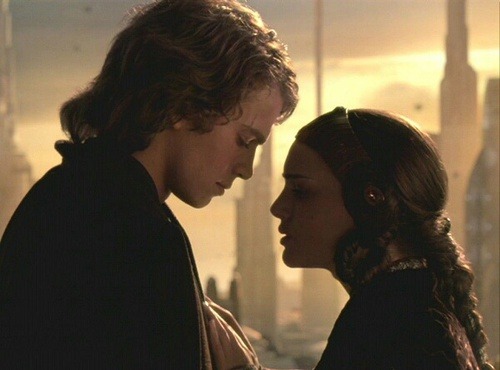
One of the theories I’ve found intriguing since belatedly joining the Reylo fandom has been that of Reverse Anidala, or the idea that the tragedy of Anakin Skywalker and Padme Amidala is being told in reverse, as the joyous romance of Ben Solo and Rey of Jakku. When researching folktale types for my Reylo as Eros and Psyche analysis, I came across the apparent inverse of ATU 425: The Search for the Lost Husband, which is ATU 400: The Quest for the Lost Bride. If Star Wars does indeed draw on mythology from around the world, and the theory of Reverse Anidala is correct, it seems reasonable that Anakin and Padme’s tale would match closely to these Lost Bride tales, the most famous of which is that of Orpheus and Eurydice. On the surface, the mythological motifs in the Prequel Trilogy didn’t seem as distinct as those of the Sequel Trilogy, but a deeper dive demonstrated that George Lucas is, in fact, the inspired genius we all know him to be (awkward dialogue notwithstanding).
Quest for the Lost Bride tales include, just like Search for the Lost Husband stories, variations such as the Animal Bride and Supernatural Bride. There is slightly less standardization in the Bride tales than the Husband ones, even within a single cultural tradition: for instance, some versions of the Orpheus tale end with the eternal separation of the lovers, while others include the eventual happy reunion in the Underworld after Orpheus’ death. However, the most well-known of these stories are tragedies, so I’ll be focusing on those, including both Virgil and Ovid’s versions of Orpheus and Eurydice, several versions of The Swan Maiden, The Crane Wife, the Shinto creation myth of Izanagi and Izanami, and more. As some of these involve faith traditions that are still practiced to this day, I will try to handle them respectfully, but I would appreciate a generous correction if you feel my treatment has been in any way insensitive.
Orpheus was the son of Apollo, the sun god, and Calliope, chief of the muses who presided over epic poetry. He was best known as a uniquely-skilled musician and poet, whose music could charm all living things and even cause rocks and trees to dance. In some versions of the tale, Apollo gives Orpheus a golden lyre and teaches him to play it, and this hero is nearly always associated with magic or witchcraft. While the Greek story presents Orpheus as an artistic soul, both contemporary and later critics scoffed at this as his “unmanliness.” They would often blame the hero’s loss of his wife on the husband’s failures of traditional, aggressive masculinity. Accordingly, later iterations of the Quest for the Lost Bride folktale type have the hero as a warrior, king, or prince.

There’s a lot of Anakin Skywalker here already, both from a canonical perspective and a fandom perspective. The son of an inspiring woman and The Force itself (which is the deity of the Star Wars universe), Anakin is essentially a demigod, and his extraordinary skill with the Force is clearly a gift from that powerful “father.” His power does sometimes take on an artistic, charming character (and as a calligrapher, his grandson has clearly inherited this artistic spirit), as when he floated the pear to Padme, but the Jedi force him to turn his skills to war instead. Anakin is pressed into a violent role at odds with the selfless soul his mother Shmi describes, and even the fans at times seemed dissatisfied with his softer nature. This is part of the reason that the Clone Wars TV show portrayed him as much more traditionally masculine. We recognize both versions of the character as Anakin Skywalker, but they each reflect a particular audience perspective, just as the different mythical Husbands do.
Eurydice, on the other hand, is hardly described at all in the myth. Unusually, there’s not even a mention of her particular beauty. It seems she is just the object of Orpheus love and no more, leading to a great deal of excellent feminist criticism (which we’ll get into later). However, other versions of the Lost Bride give us more detail: most notable is that the heroine is nearly always a fairy or other ethereal creature, who hails from a mystical world apart from the mortal realm. She might be a fairy princess, a selkie, a mermaid, a swan, a crane, or even a goddess. Frequently, she must be enticed or abducted from this other world and her means of returning to it must be destroyed (usually with the typical burning of the animal skin). In some versions of the tale, she even had another husband before the hero captured her. She comes to love her new husband sincerely and live happily with him for a time, but there is always a sense of her being out of place.
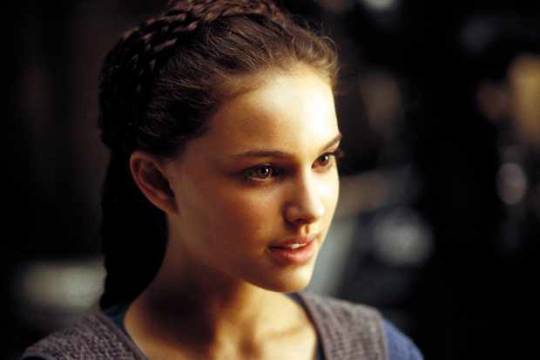
When Anakin meets Padme as a child, his first words to her are “Are you an angel?” This has always struck me as a fascinating artistic choice by George Lucas, a man who so enjoyed worldbuilding that he frankly got a little carried away with it in much of the Prequel Trilogy. He certainly could have chosen a Star Wars-y sounding name for this alien race of ethereal beings from the moons of Iego, but he chose something with a very specific and recognizable meaning: Angel. He knew that this word would immediately communicate what a convoluted explanation of in-world lore (*cough* midichlorians *cough*) would not: an image of purity, kindness, and beauty. Padme is cast as a supernatural image of perfection, and we understand immediately that the lovesick Anakin has placed her on a pedestal, seeing her forever as Angel rather than as Woman. To marry Anakin, Padme must to some extent turn her back on her principles (remember her insistence that she couldn’t “live a lie?”), and is then torn between her loyalty to her husband and to democracy. In a sense, she has been plucked from the fairy world of Naboo and drawn into a marriage that, though filled with genuine love, places her at odds with her true nature.
In Quest for the Lost Bride tales, this duality of the lady is often expressed by the Animal Bride motif, with the heroine taking one form when she is away from her fairy world, and another when she is in her natural home. This might be taken further by having a false bride, a variation best known from the Black Swan of the Swan Lake ballet. In this example, the bride’s false nature is personified as a completely separate woman, while her true self exists in the form that the hero first falls in love with. Interestingly, this appears to be referenced in the costuming of Queen Amidala and her decoy, Sabe: During the invasion of Naboo in The Phantom Menace, Sabe wears a towering robe of black feathers. Later in the finale, Padme wears a similarly-feathered gown of soft white layers.
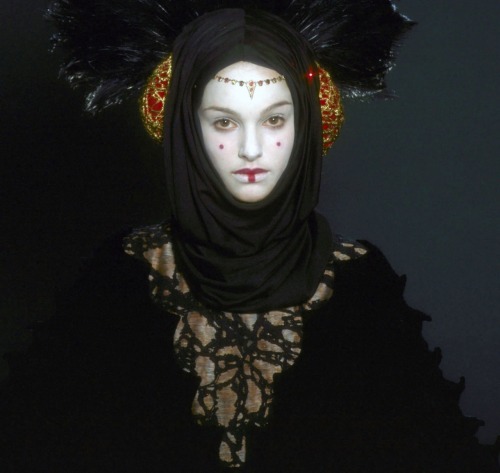
In Attack of the Clones, we see this duality within Padme herself in the two scenes in which she confronts her feelings for Anakin: When she denies her feelings for him and declares that they cannot be together, she wears a jarringly seductive black dress. This is clearly not her true self. Later on Geonosis, when she finally declares her love for him, Padme is clad in pure white. She then wears white again as she binds herself to him in marriage. Still another variant of the two brides theme is the human woman versus the shade (sometimes a rotting corpse), but we’ll get to that later….
Orpheus and Eurydice’s union seems to be doomed from the outset, as Hymen, the Greek god of marriage, fails to bless their marriage. Eurydice is then pursued by an insistent suitor, and in fleeing him, steps on a viper and dies of a poisonous bite to the heel, descending to the Underworld for eternity. In other Lost Bride tales, the enchanted wife returns to the fairy realm or retreats into her animal form, often after a betrayal by her husband. In the Maori tale of Mataora and Niwareka, husband Mataora strikes his spirit wife Niwareka across the face, and she flees back to her homeland because domestic violence is unheard of among her people. And in the Shinto creation myth of Izanagi and Izanami, wife Izanami dies in childbirth, burned to death when giving birth to the fire god Kagutsuchi. In fact, it’s extremely common for the fairy wife to flee or die after giving birth to her husband’s children.
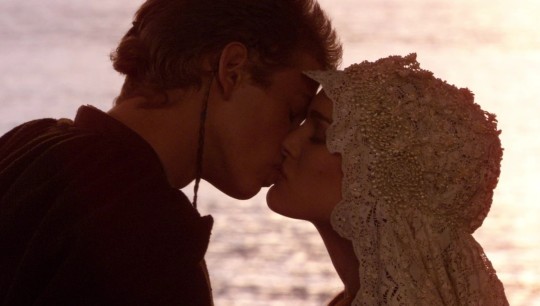
Again, the parallels to Anakin and Padme’s story should be obvious: Since marriage is forbidden by the Jedi Order, the couple’s nuptials must remain a secret, meaning their union is never blessed by the powers of their world. Though Padme has no suitor, we see Anakin in Revenge of the Sith split into two people: the Jedi who loves his wife, and Darth Vader, who bids her join him in his galactic domination. In that sense, Vader is the dark rival for Padme’s affections. Further, he cements the loss of his wife with the ultimate marital betrayal, attempting to strangle her with the Force. And finally, Padme dies after giving birth to the twins, at the same moment that Vader rises from the flames that consumed Anakin Skywalker. The Lost Bride descends to the Underworld, and now begins the husband’s Quest.
One of my favorite sources for this analysis was In Search of the Swan Maiden: A Narrative on Folklore and Gender, by Barbara Fass Leavy. I strongly recommend checking it out, but this is one of her excellent points that caught my eye:
“.... according to the tale type Index, wives search for their lost spouses, whereas husbands who have lost fairy wives embark on quests - a particular irony given that the searching women characteristically win back their spouses and the questing men characteristically do not.”
I find this fascinating as a commentary on the perspective of both the storyteller and the audience in the Prequel Trilogy versus the Sequel Trilogy: the traditional tales seem to assign greater agency to the men, but greater success to the women. This can be seen in the prequels when Padme seems unusually passive and even dies of a “broken heart,” despite having two children to live for, as many have pointed out. Further, the first six films of the Skywalker saga are told from a masculine perspective, so a Quest for the Lost Bride tale seems like a natural fit. In the sequels, however, the perspective has shifted to the feminine, attempting to assign greater agency to the heroine and leading her toward a successful retrieval of the Lost Husband. This is important, because from this point onward in the myth, I’m going to be applying more and more of the story motifs to the Sequel Trilogy, not just the Prequels.
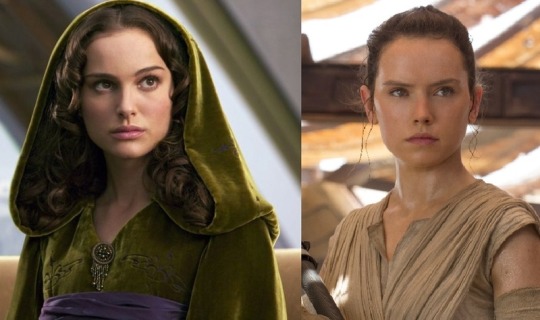
Back to the Quest: Orpheus, devastated by his wife’s death, roams the earth playing mournful tunes on his lyre. Eventually, he decides to descend to the Underworld and plead with Hades and Persephone for his wife, referencing their own love story to appeal to their empathy. Just because it’s gorgeous, here’s part of his song:
“Let me again Eurydice receive,
Let Fate her quick-spun thread of life reweave.
All our possessions are but loans from you,
And soon, or late, you must be paid your due;
Hither we haste to humankind's last seat,
Your endless empire, and our sure retreat.
She too, when ripened years she shall attain,
Must, of avoidless right, be yours again:
I but the transient use of that require,
Which soon, too soon, I must resign entire.
But if the destinies refuse my vow,
And no remission of her doom allow;
Know, I'm determined to return no more;
So both retain, or both to life restore.”
*MELTS* So anyway, his song works and they tell him he can lead Eurydice out of the Underworld, BUT she must walk behind him and he must not look back at her even once, or else she will spend eternity as a shade in Hell. In other tales, the husband might be instructed never to look upon the wife’s animal form (The Crane Wife), or upon her rotting corpse (Izanagi & Izanami), or he may be given another admonishment from his father-in-law as to the acceptable treatment of the daughter. Invariably, the hero swears he will obey, but whether an hour or many years later, he fails. In Orpheus’ case, he is nearly returned to the land of the living when he is unable to resist the temptation to glance back and check that Eurydice has not lost her footing. She vanishes, and Orpheus (described thereafter as having a “frozen breast”) is again wracked by grief, swearing off of [sexual] contact with women and again roaming the world singing songs of sorrow.
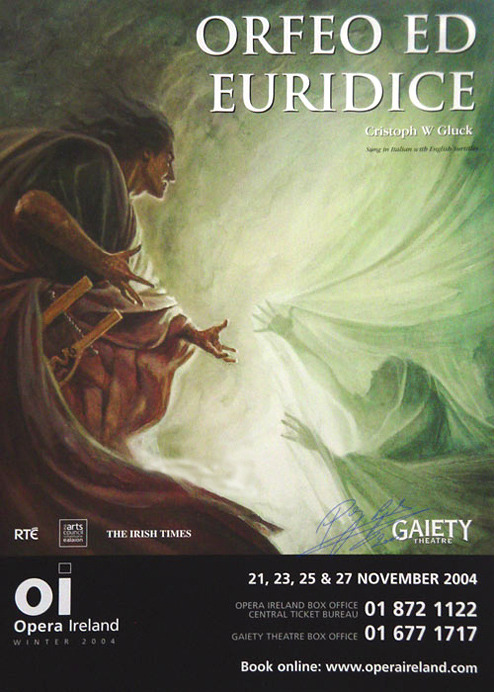
If the “look back” can be seen as a loss of faith, or a fall to the temptation for power, then Anakin certainly demonstrated this in his reach for the power that Sidious offered. Padme begs him to run away with her, to turn back toward the Light, but Anakin “looks back” to the powerful promise of the Dark Side and loses her forever. Similarly, Ben Solo gazes at Rey across the burning throne room, clearly thinking only of being with her…. Until he “looks back” at Snoke’s throne, and is pulled back into the fear and bitterness that have kept him trapped in the dark for so long. Within her own Search for the Lost Husband journey, this is the moment that Rey also sees Ben’s true form, and realizes that she has to leave him. The lovers are separated (for now), until the husband can reject the lure of power and keep faith with his wife.
I’m very much not the expert here (that’s @corseque ), but we know from the Darth Vader comics that he was trying for the rest of his life to bring Padme back from death. We don’t really know how near he was to success, but that story may be relevant to the plot in The Rise of Skywalker. In any case, the myth now starts to get very interesting: Feeling spurned, a group of Maenads (female devotees of Dionysus) attack Orpheus in a forest and literally, gruesomely tear him limb from limb, until the ground is littered with body parts. This is actually a fairly common event in Greek mythology, such that it even has a name: Sparagmos, “to tear apart.” TEAR APART. Anakin, of course, did indeed lose limbs at the time of his “death,” when Obi-Wan cut off his legs and then Sidious raised him as Vader. If Reverse Anidala is true, and Ben Solo begins his story at a moment parallel to when Anakin Skywalker ended his, then of course the son of Leia sobs in the first sequel film: “I am being torn apart.” It’s poetry; it rhymes.
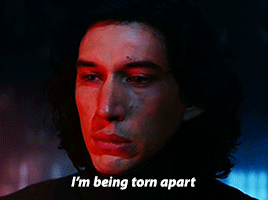
(GIF source: @mamalaz)
After his death, Orpheus’ head floats down a river on his lyre, continuing to sing his mournful songs to all who will hear. It eventually lands on the island of Lesbos, where it prophecies and eventually becomes as famous as the Oracle of Apollo. As I mentioned in my previous post, the iconic helmet of the tragic fallen hero does make an appearance in the ST, and it even seems that Kylo Ren is seeking wisdom from it. Apollo and the Muses finally take pity on poor Orpheus, and they bury his limbs. In some versions, the story ends here with a nightingale taking up the song of the lost lovers, but in others, Orpheus finally descends to the Underworld and is reunited with Eurydice, and they spend eternity together, hand-in-hand. Perhaps this means that Anakin may finally return to Padme and they may be together in the Force.
Among the other stories of the Lost Bride type are details that also align well with the Skywalker Saga: In the Shinto tale mentioned above, Izanagi fails to retrieve his wife but then begets Amaterasu (the sun goddess) and Tsukuyomi (the moon god). Anakin’s children Luke and Leia are visually associated with the sun and moon throughout the films, and similar imagery is used for Ben and Rey (NOT suggesting they’re siblings, people, just descendants of the Skywalker legacy, geez).
Another feature of these tales is the original meeting of the wedded pair: While in Orpheus and Eurydice their initial meeting is unrecorded, most stories actually include the abduction of the bride, either physically or by default because the husband has hidden or burned her animal skin. While this doesn’t really apply to Anidala, it certainly applies to Reylo, as Kylo of course carries Rey off to Starkiller Base. But it applies in another way, as well: In The Last Jedi, Ben breaks down Rey’s lies that she has told herself about her parents, in a sense burning away the protective skin of denial that she has, rendering it impossible for her to return to her childlike state. This is in a way another abduction, as Rey is forcibly pulled from her enchanted form to her true self.

(GIF source: @lyanna-stark)
There is also the common motif of recognition, which appears in the Search for the Lost Husband, as well. Often, when the lovers are separated, the lost spouse forgets the questing spouse and does not recognize them when they come to the rescue. Their memory is usually jogged by the spouse performing a unique task that only they can do, or by returning a gift which was once given before. From The Greenwood Encyclopedia of Folktales and Fairy Tales: “It is interesting to note how these extended narratives tend to duplicate the motifs by repeating them in reverse order - she recovers her suit, and he recovers her; she presents a ring, and he represents it to regain her.”
In Revenge of the Sith, Padme cries to Anakin “I don’t know you any more!” clearly stating that she no longer recognizes her husband. While we have yet to see those characters’ reunion, there is a particular moment of recognition in the ST, related to a powerful object which has been previously offered as a gift: the legacy lightsaber. When Rey calls the saber to her in The Force Awakens, Kylo breathes “It is you” in the novel, clearly recognizing her in some way. There are hints that Rey also recalls him on a subconscious level, though for now we can only speculate how. Still, it’s clear that many more legacy objects are going to appear in TROS, so there will be plenty of opportunity for Rey to get a reminder!
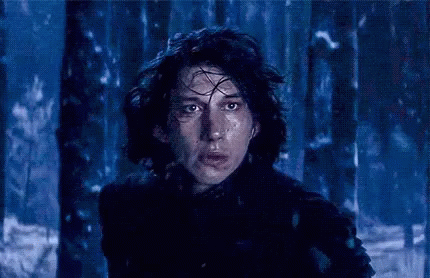
In Barbara Leavy’s book, she mentions that the central thesis of these folktale types seems to be that the relationship between spouses is the basis for peace and stability in the world:
“These examples of emotional failure are significant because they suggest that even were it true that romantic love is an invention of modern Western literature, its elements not to be read into narratives where they do not apply, the importance of emotional bonds in the marital relationship has probably always been recognized. The breakdown in the attachment of husband and wife is a significant feature of some of the world’s most widely-told stories. So long as the family supplies society with a basic structural unit, the affective tensions within the family will be crucial aspects of daily life and the narratives that grow out of it.”
As applied to the Skywalker Saga, I take this to mean that the wars of in “Star Wars” are tied to the breakdown of the marriage of our central characters: Anakin and Padme, and later (to a lesser extent) Han and Leia. It follows then that this central conflict can only be resolved by the healing of the bond between husband and wife. When we say that the Skywalker Saga is the story of generational trauma, this is what we mean, and it is a tragically relatable tale for much of the audience. We see the sorrow of our broken families writ large in a violent conflict across an entire galaxy far, far away, and we yearn for hope and healing.
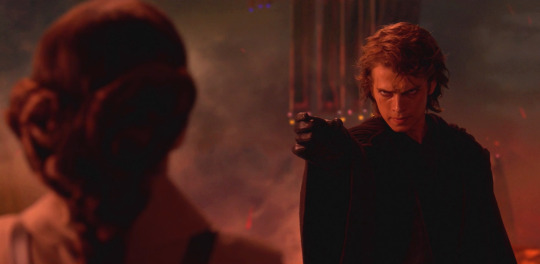
Leavy further illuminates an aspect of these stories - Psyche’s Search and Orpheus’ Quest - that I find particularly fascinating in light of the frequently gendered discourse around Star Wars:
“If it is true that the Orpheus tale is as favored by men as the Cupid and Psyche tale is favored by women, then male storytellers appear to be expressing through these narratives their difficulties in achieving self-definition consistent with stereotypical ideals of manhood. The typical success experienced by Psyche and the equally typical failure encountered by Orpheus can be profitably analyzed in the context of a recent study of the difference between the ways in which men and women respond to their own fantasies:
‘women would see deprivation followed by enhancement, whereas men would see enhancement followed by deprivation.’ In contrast to women, ‘men showed a preference for extreme endings, which revealed itself most clearly in the tendency of men to see any decline or fall as abrupt, total and final. The possibility of a resurgence or second chance, which is implicit in the female pattern, does not seem very real for men. Perhaps an important difference is that the woman is socialized to lose (or give up) control without panic, and that she picks up as a positive concomitant to her submission confidence of recovery in the face of failure or suffering.’”
If I may generalize, the Star Wars fans who seem to want or expect a tragic ending for Ben Solo predominantly identify as men, whereas those who want or expect his redemption and happy ending predominantly identify as women. It seems that the Star Wars fandom does bear out Leavy’s claim that men relate to the tragic Quest for the Lost Bride, which contains harsh punishment for the failures of its hero, while women prefer the Search for the Lost Husband, which rewards its heroine’s persistence with a passionate love. Again, this is a generalization, as obviously individuals of all genders and none can enjoy a wide range of stories.
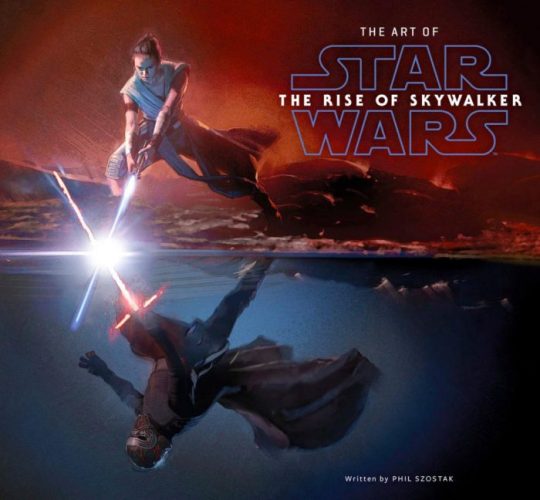
Many critical analyses of Orpheus and Eurydice point out that there is a distinct power imbalance between the pair, and that therefore a happy ending can only occur if the husband successfully subjugates his wife. Much of the hero’s actions seem to be an attempt to control his wife or control her fate, and this is nearly always characterized as a character flaw on his part. In fact, the descent into the Underworld is sometimes interpreted not as an expression of death-defying love, but of an unwillingness to accept the finality of death, or a failure to accept that the fairy wife has chosen to flee of her own volition. On the rare occasions when the husband successfully retrieves the lost bride from the mystical realm, it is usually not because he approached her with humility and remorse for his lack of faith, but because he vanquished her demon lover. On the other hand, some stories actually switch perspectives from husband to wife after the bride is lost, and the tale suddenly becomes the Search for the Lost Husband, with all its typical features. When the lovers are equals and the wife pursues the husband, then their reunion is successful and lasting. This seems to be happening both on a large scale within the full nine films of the saga, and on a smaller scale within the Sequel Trilogy itself, as Anakin and Ben follow Orpheus’ path while Rey alone follows Psyche’s, which is an excellent sign for Ben’s redemption and happy union with his bride in The Rise of Skywalker.
So there you have it…. Yet another big-ass meta that hopefully demonstrates the genius mythology of the Star Wars saga, and not just the fact that I’ve spent way too much time researching this. Thanks for reading and as always, feedback is welcome!
Previous posts in this series:
The Search for the Lost Husband: Reylo as Eros and Psyche
More Search for the Lost Husband: The Burning of the Beast’s Skin in Star Wars
This post is dedicated to @ahsokaeden65, who gave me a gentle kick in the butt to finish it! <3
#anidala#reverse anidala#anakin x padme#anakin skywalker#darth vader#padme amidala#reylo#reylo meta#star wars meta#star wars analysis#mythology#greek mythology#folklore#atu 425#atu 400#the search for the lost husband#the quest for the lost bride#star wars mythology#monomyth#swan maiden#swan lake#swan princess#animal bride#animal bridegroom#orpheus and eurydice#cupid and psyche#orpheus#eurydice#mythic romance#fairy tales
233 notes
·
View notes
Text
The Not-So-Amazing Mary Jane Part 35: AMJ #6.2
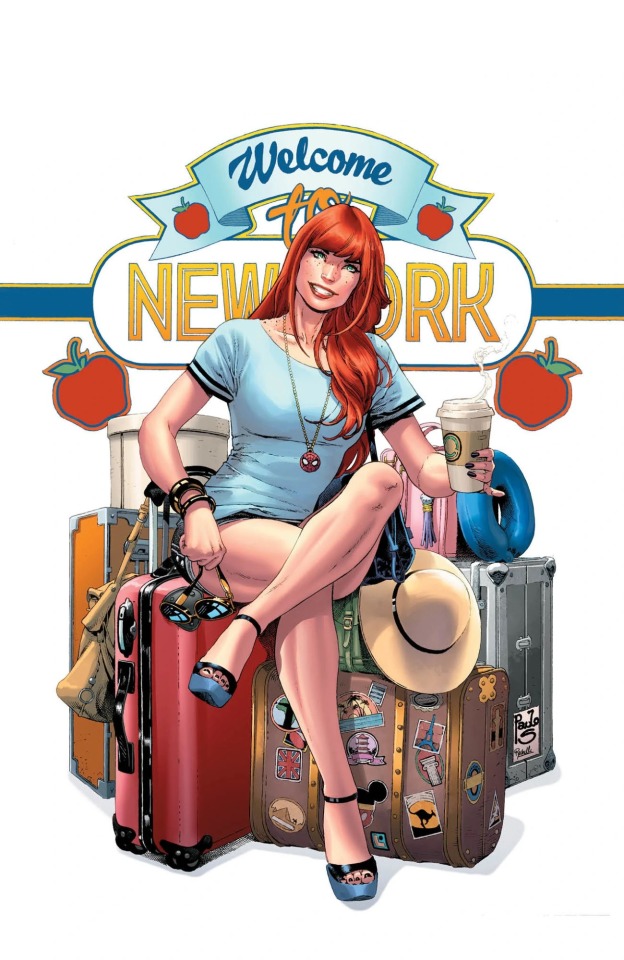
Previous Part
Next Part
Master Post
Much as we did for AMJ #4 we will be turning this issue into a three parter. This is because the next page we will cover has a Hell of a lot to unpack. As always, if you want the full context read the previous post.
MJ’s mental rehearsal continues, with her imagining Peter’s questions and the answers she plans on giving.
Why didn’t she call Peter? Because she couldn’t get to her phone safely
Why didn’t she scream for help/aren’t there security guars on set? Because she was the only one being pursued.
MJ plans to pause for dramatic effect and say (with enough conviction that Peter would have to understand): “I’d just seen this guy kill someone. Who knows what else he was capable of? I didn’t want to endanger anyone else by making them my shield. Especially since this guy was intent on following me and only me out of the building.”
Whilst MJ is going through this in her head she is shocked and scared at the sight of Oni. Oni reaches into his jacket (seemingly for a gun). MJ’ facial expression changes (I don’t really know what it’s trying to convey) and she smashes a fire alarm. Oni pulls his hand out of his jacket revealing nothing but his hand in a gun pose. Behind him the audiences rushes out in a panic.
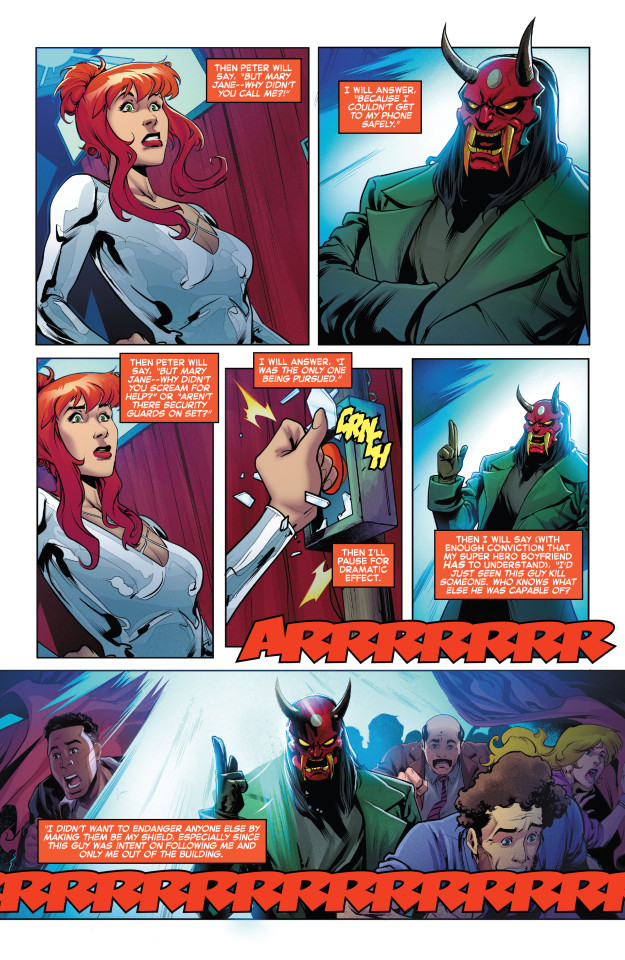
Okay, the storytelling between the art and captions is actually very well executed here. If this was an original character rather than Mary Jane, someone who was perhaps characterized as brash, impulsive (possibly self-destructive), then this page would actually be really cool.
I appreciate how the art and dialogue marry up together creating irony and a contrast to what is happening. The framing of Oni and the ‘lighting’ (for lack of a better word) are also excellent as is the pacing and ‘rhythm’ of the page. It’s just executed very well.
Too bad MJ isn’t an original character and the context ruins the page.
Not only is MJ planning on deliberately lying to Peter but going to extra lengths to do it. It’s not just the one lie it’s several about her being in danger and unnecessarily. The worst part is the ‘I will say with enough conviction that my….boyfriend has to understand…’ It’s just so underhanded and exploitative, its MJ planning on in a sense tricking Peter into believing her lies.
And I do not know why.
Why is she planning to lie to him about this at all? Is she so egotistical that she can’t admit she made a mistake? Has she or is she planning on always lying to Peter about pursuing crooks herself?
I just do not understand the need for MJ to lie to Peter about this. Yes it will upset him but surely she knows he’ll get over it. Even if it’s just to save her some kind of hassle with him later surely she knows lying is just generally bad for a relationship, especially over something as serious as this. Peter doesn’t lie to her about being Spider-Man or the risks that entails for God’s sake.
This isn’t even connected to the Mysterio thing. This is just an extra pack of lies about an essentially unrelated event.
The most grating aspect of the page is that MJ recognizes the obvious questions and the obvious reasons she should have done something different. Which means Williams does too. Williams knows there were other more reasonable options for Mary Jane to have taken but has chosen for her to not take them.
And let’s dig into those options shall we.
She could have called Spidey. She is planning on lying about her phone being out of safe reach. Except it wasn’t.
She could’ve screamed for help or screamed about the murder. She could’ve gotten the security guards to help her. She plans to claim she was the only one being pursued. She wasn’t, the guy was leaving and she pursued him. He isn’t even pursuing her on this page.
Even if she was the only one being pursued she still could’ve gotten security guards involved. Putting aside the fact that that’s their job, this guy is seemingly not a super human. If he was why is he walking away, keeping to the shadows and using a weapon to strangle his victim. If he had enhanced strength he’d not need that. Therefore there is no evidence to suggest this man couldn’t be stopped by several burly guys or a bullet. After all, even in New York city the number of regular human criminals outnumber the costumed criminals.
And yes, this guy is seemingly a cold-blooded killer so MJ couldn’t be sure what else he was capable of. But if this chat show hosts celebrity guests then surely the security services have provisions in place to protect them? They are celebrities, there are always going to be one or two lunatics who might take things too far. So provided they aren’t incompetent the security guards should be armed and prepared to deal with a normal non-powered person at the very least, even an armed one and a cold blooded killer. In fact I’d have thought a crazed and armed celebrity stalker would be far less predictable than a sane and rationale killer.
Also, MJ’s point about not knowing what Oni is capable of applies to her. She doesn’t know what the man is capable of beyond obviously being willing and able to kill; we’ll come back to that in a moment.
MJ final point on this page regards not wanting to make other people her shield, especially since he was just after her. Again he wasn’t. In fact her pursuit of him wound up endangering more people. Not by accident either, she deliberately put them in danger by triggering the fire alarm.
That’s aggressively out of character for Mary Jane. Risk the lives of innocent people to save her own skin? Get fucked, Mary Jane would never do that. I can’t say I’m surprised. MJ’s moral compass has been utterly broken throughout this series. She’s been mind bogglingly selfish throughout this series.
You know when I wrote part 16, I was only thinking about MJ prioritizing her career over other people. I honestly never expected that I’d have to point out that she’d obviously not use other people as her shield.
There is an element of good craftsmanship to that moment though. The juxtaposition between what MJ is doing and the rehearsal dialogue MJ is running through in her head. As a moment intended to deliver irony it works magnificently. It just isn’t something Mary Jane would ever do. Oh, unless it was six villains and they were threatening the movie.
I guess in this series MJ’s priorities are:
Mysterio’s dream film project/Mysterio’s ‘redemption’/The employment of current super villains/Her career/Her life
Her relationship with Peter/the lives of innocent people
In that order.
Why do people sill laud this series again?
Anyway, MJ’s point about not wanting to use people as shields doesn’t hold up to scrutiny. Not just because that is literally what she is doing on this page. Not just because she basically did that last issue when the cast and crew battled the Savage Six for her. Not just because Mysterio battled them in issue #3.
But MJ has sought the help of others countless times before.
In part 20 I recounted several instances of MJ getting assists to save her self. Whilst some of those instances entailed help finding her, others involved her actively seeking help. In ASM #261 she asked Harry about Peter as she wanted Spider-Man to come help them. She asked Spidey to help rescue her and Liz from the fire in the same issue.
In part 17 I also pointed out that Mary Jane sought assistance from the police, body guards and Peter to deal with her stalker. In that instalment I also went over the time she encouraged Peter to go out and deal with a gangland shoot out going on. Obviously MJ was not in any direct danger there but wouldn’t asking Peter for help qualify as looking to him to protect innocent people, as MJ is herself was (allegedly) trying to do by pursing Oni?
There are numerous other instances where MJ has looked to others to help her in times of peril or when innocent people are in danger.
When Smythe abducted her in ASM Annual #19 she tried to get the attention of Peter or the authorities.
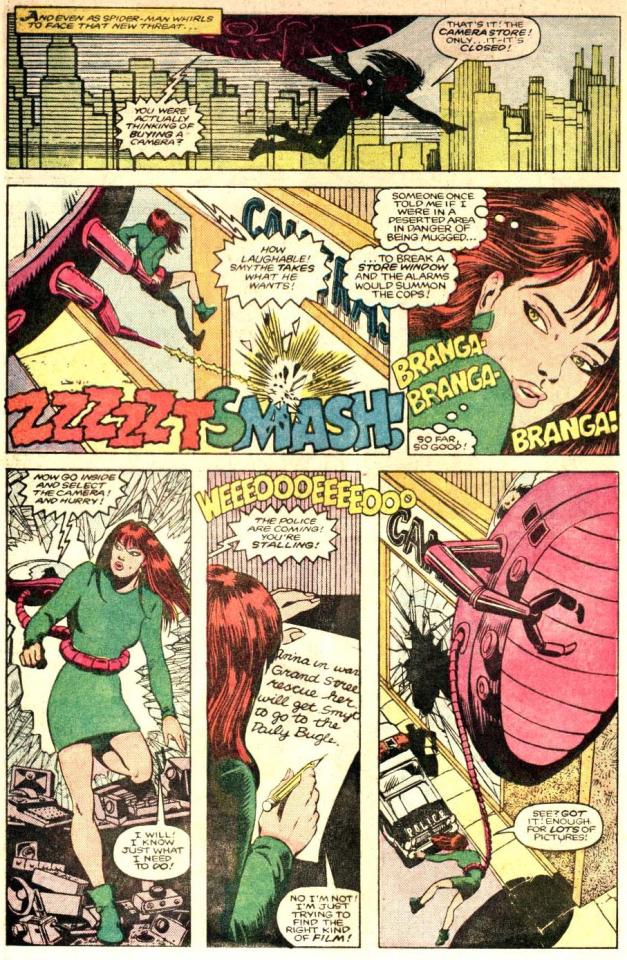
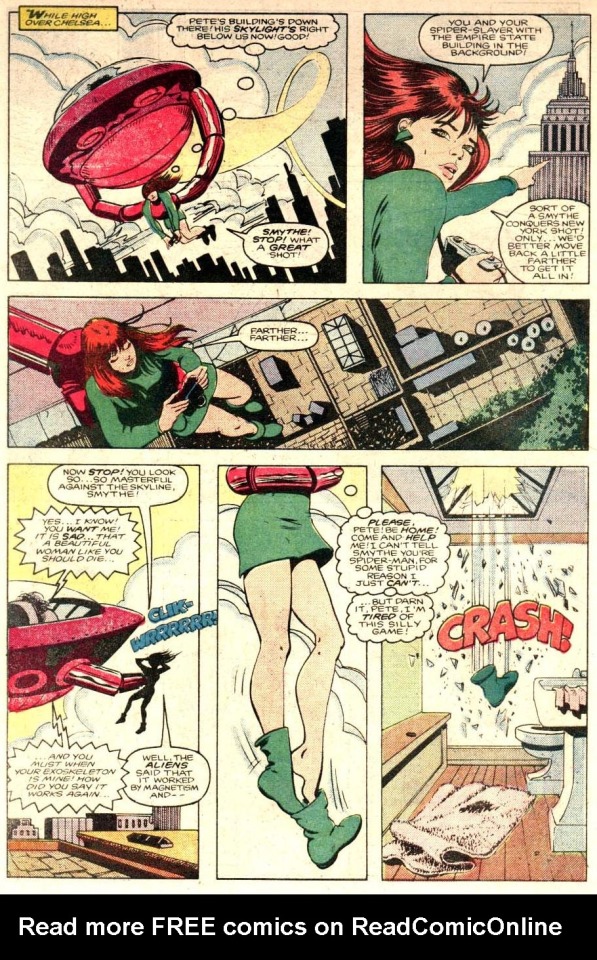
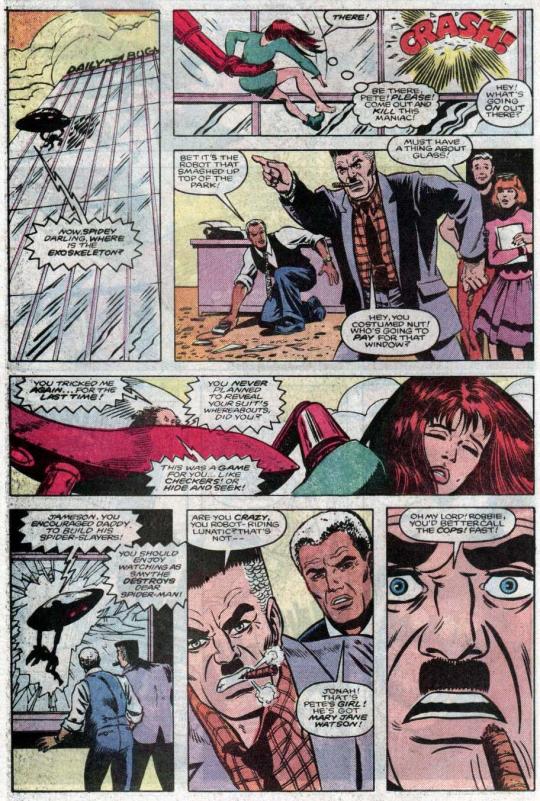
In Web #49 to Peter to sort out Lorraine’s drug dealer?
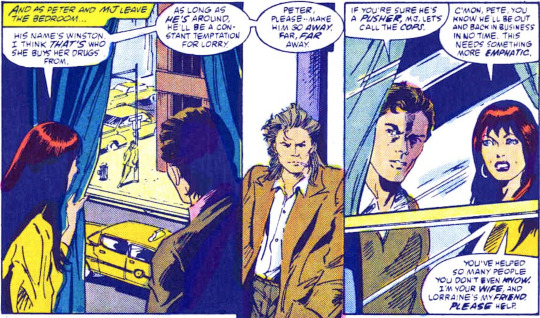
In ASm #317 she suggested calling in the marines when Venom was on the loose again.
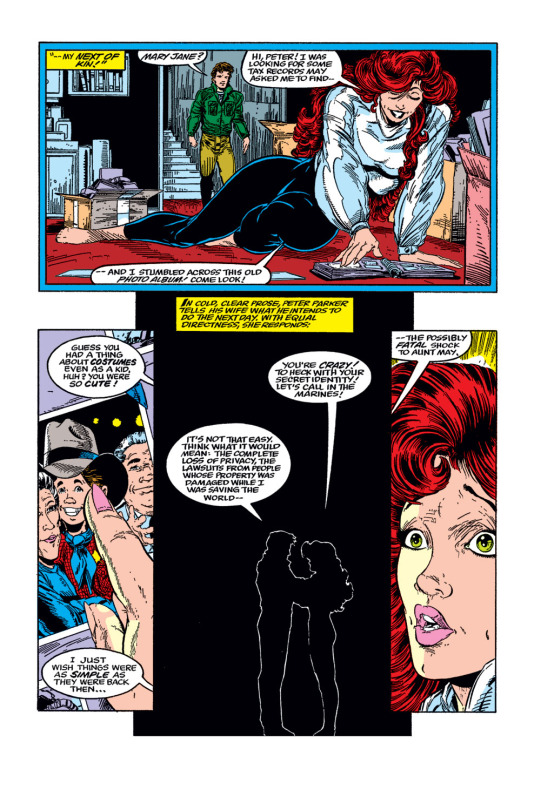
In MKSM #11 she called S.H.I.E.L.D. to save Peter and Felicia from she (correctly) presumed would be a trap.
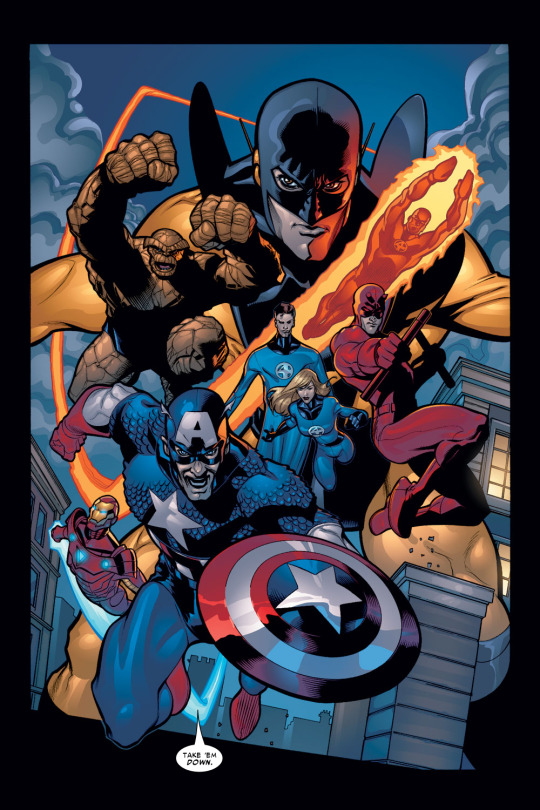
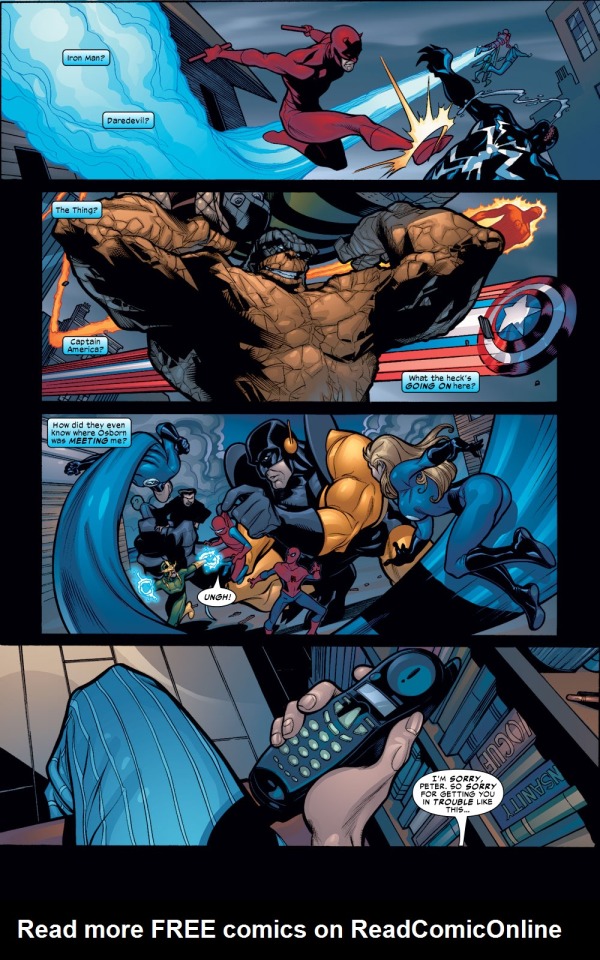

Or how about Spec #228 where a pregnant MJ was pursued by a mind controlled Peter bent on killing her? In that issue Mary Jane sought the help of the New Warriors and Ben Reilly/Scarlet Spider who acted as a shield between her and Peter.
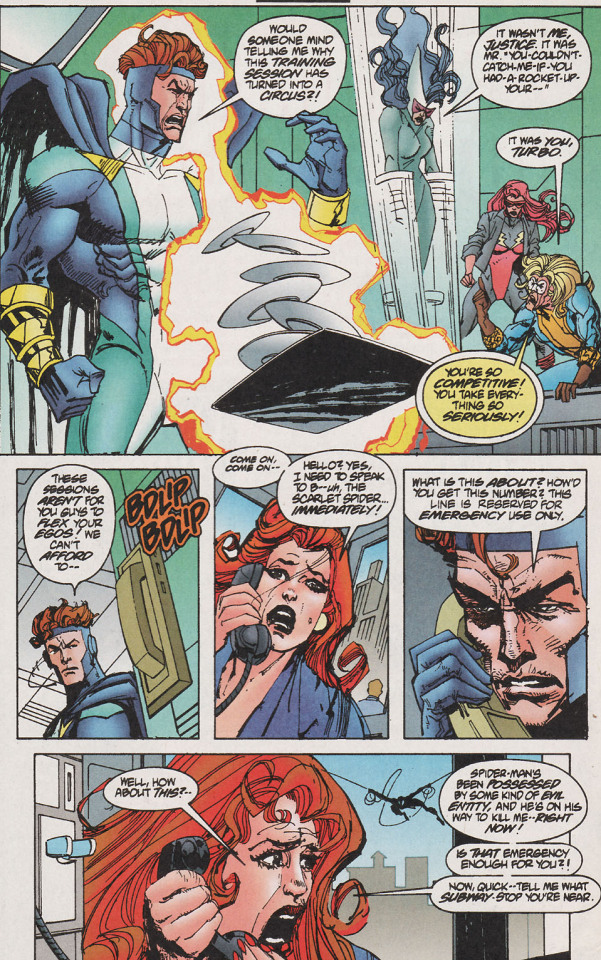
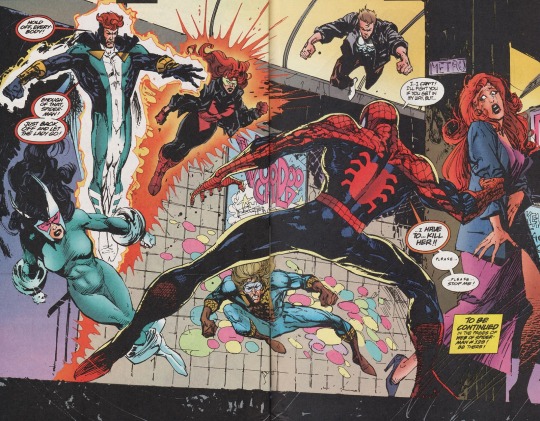
No matter how you slice it, if MJ is in danger or thinks others are, she is more than willing to seek assistance from people who’s job it is to protect others. Shit, how many times has MJ suggested other heroes or the police could save the day instead of Spider-Man?
These do not mark her out as a weak coward. If you know your limits and can reasonably assess danger then often you serve the greater good by seeking the assistance of others. Sometimes serving the greater good means handing over responsibility to them if they are better qualified.
Spider-Man himself has sought help from other heroes when he feels outgunned on countless occasions. One of the most recent (as of this writing) occurred in FNSM v2 #12-13 where Peter asked the F4 to help him.
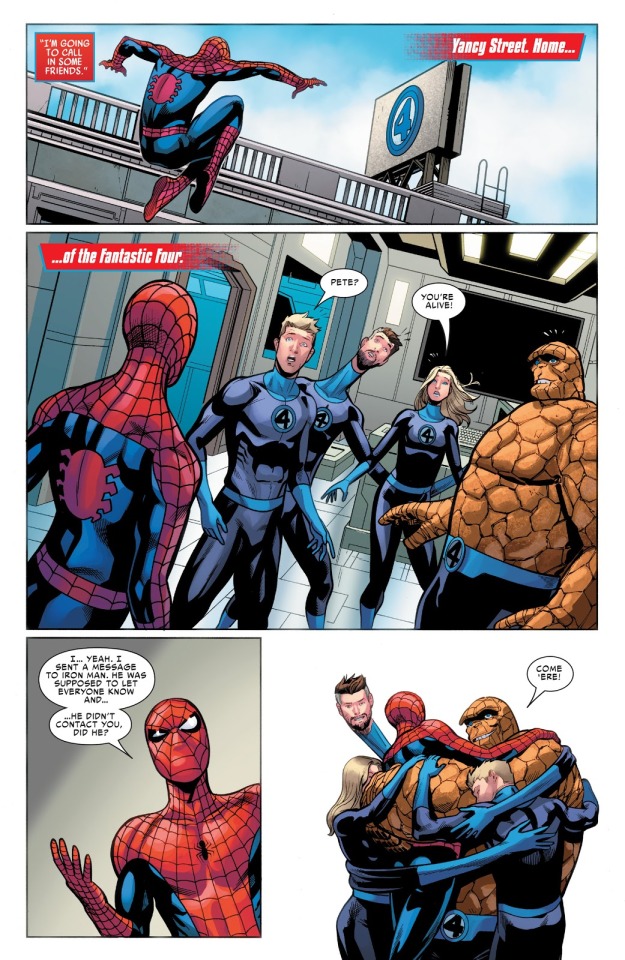
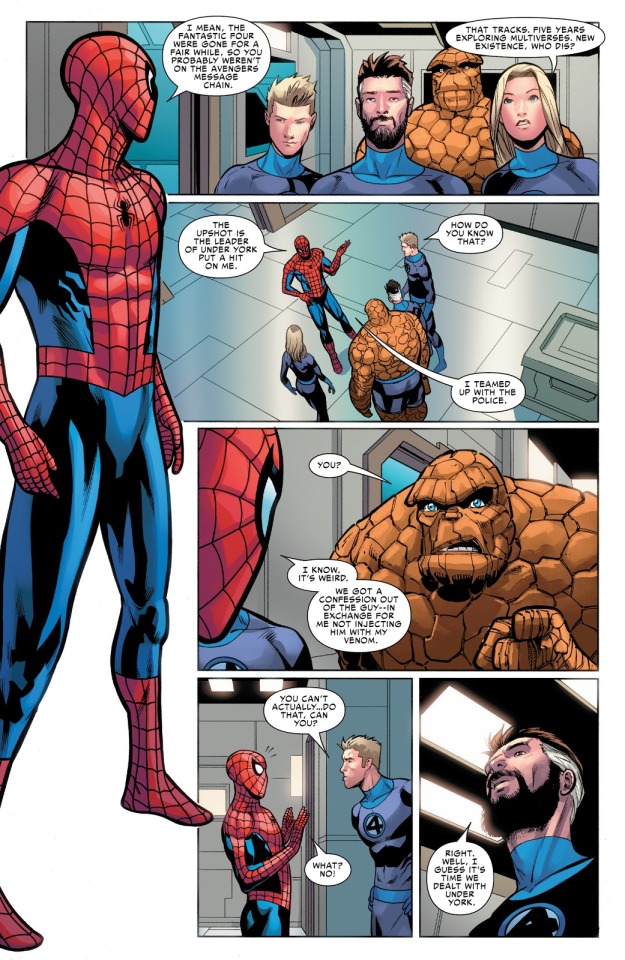
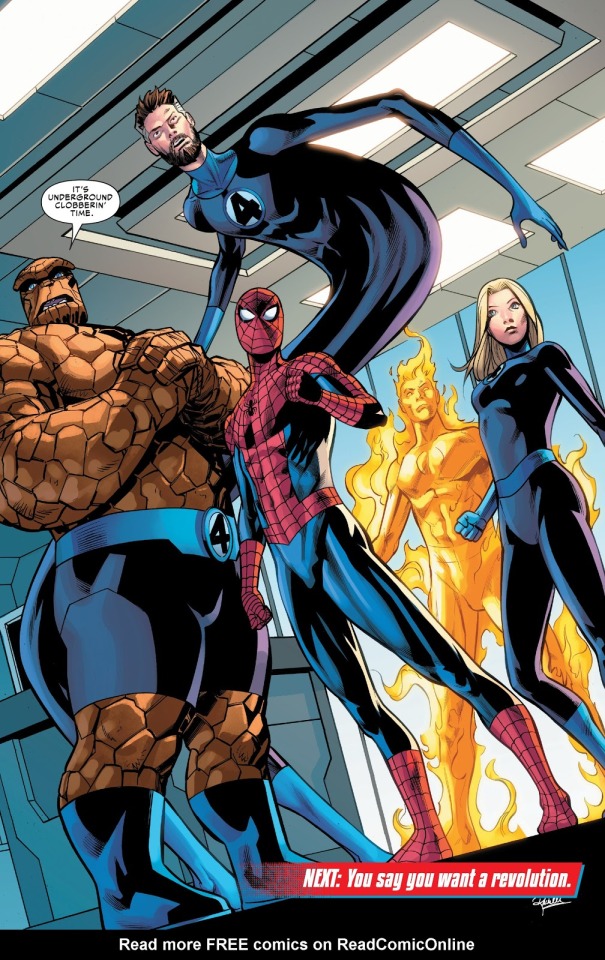
It’s all about scale. I went over this in parts 19-22, but MJ is not a super hero. She’s just a very capable civilian. But a capable civilian is still not on the same level as a very capable trained cop or trained security officer, someone who knows what they are doing with a gun basically. She’s probably more resourceful than those people, but her resourcefulness boils down to luck. She needs the right resources around her to exploit. Hence why her only course of action on this page was to create dozens of human shields.
Noticeably she was scared and unprepared deal with him one-on-one. Like what the fuck did she think was going to happen when she caught up with him. Her apprehension seemed at it’s worst when he was seemingly pulling out a gun and…yeah. What would she have done if he was armed.
Look back at the prior page. The distance between them would’ve been too great for her to have knocked the gun out of his hand or even attack him hand to hand. The pacing of the panels on this page make it clear that Oni would’ve had ample opportunity to have shot her if he wanted, even after MJ hit the alarm.
You could argue that her distraction worked because he wouldn’t have dared kill her with so many witnesses. That is to say he might’ve refrained from pulling a gun specifically because MJ hit the alarm. Or maybe you could argue if he had pulled a gun he wouldn’t have fired because of the witnesses.
The problem there being that he apparently wasn’t that fussed about witnesses because he knew MJ saw him but was leaving. And again, he’s wearing a mask! So what if people identify him. People know Spider-Man is guilty of countless property damage and other acts of vigilantism. It doesn’t matter because he wears a mask. Obviously he doesn’t want to be framed for a more serious crime like murder, but he’s on the side of the angels. Oni clearly isn’t and clearly doesn’t care to be. Not only because he just murdered someone but because he is literally dressed as a demon!
His decision to wear a mask like that at all actually destroys the idea that he is particularly worried about being spotted. From a realistic stand point no one would wear something so garish unless they wanted to be spotted. Super villains often want attention and have big egos, hence the flashy costumes. If this guy’s job was to be a shadowy assassin who kills with no witnesses why wear a bright red mask (which is specifically how MJ spotted him btw) with big impractical horns on it. I’m not saying this guy is actively trying to get noticed, but he clearly wouldn’t care about witnesses because his disguise is highly attention grabbing. Look how nonchalant he is amidst the crowd on this very page? If he really did want to just get in and get out, no witnesses he’d never have worn that.
Oh well. At least MJ isn’t nonplussed like she was last issue…Hey wait a minute. Why isn’t Mary Jane nonplussed like last issue? She could hold her own against the Savage Six single handily but one guy in a scary mask and some garrotte rope and she’s intimidated?
How does that make sense? I mean yes, it makes sense and is totally believable if you take this situation in isolation. But it this series isn’t consistent even with it’s own stupid ass rules!
Let’s leave it there for now. We’ll wrap up the issue with the next instalment.
Previous Part
Next Part
Master Post
#Leah Williams#Amazing Mary Jane#mjwatsonedit#mary jane watson#Mary Jane Watson Parker#MJ Watson#Spider-Man#Peter Parker#Fantastic Four#Venom#Alastair Smythe#Eddie Brock#Venom Symbiote
12 notes
·
View notes
Text
Are you there Xoanon? It’s me, Leela.
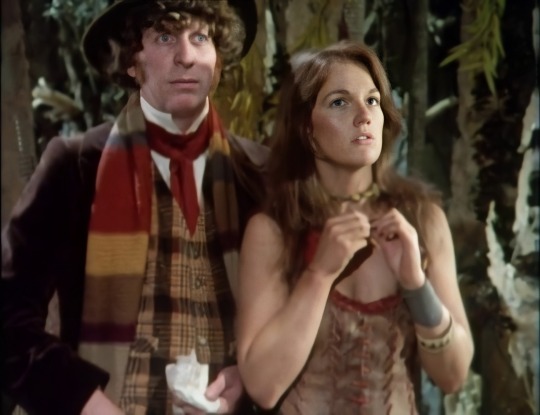
At the time of writing this article, many of you will have in your possession the season 14 Blu-Ray box set for Doctor Who. Within it are classics like "The Deadly Assassin," "The Robots of Death," and the controversial, but still much loved "The Talons of Weng-Chiang." However, today I would like to talk about an often overlooked gem in the form of "The Face of Evil." While the serial does introduce the companion Leela and showcases some classic Fourth Doctor moments, it has also received a fair bit of ire from certain fans over the years. I’ve found myself defending it in the past, to people whose opinions I value. My hope is that by the end of this review, some of you may come away with a new appreciation for what is one of my favourite classic Doctor Who stories.
For a little bit of background, when devising the character of Leela, producer Philip Hinchcliffe and script editor Robert Holmes were looking to do something new with the companion. They wanted a female lead that could also do heroics. The initial concept for Leela was a mix of Eliza Doolittle, Emma Peel, and Loana from "One Million Years B.C." The decision to make the companion more of an action star was one that was met with resistance from Tom Baker, who in this humble writer’s opinion would have been happiest acting alongside a sock puppet. While he claimed not to like the violence of Leela, I often wonder if it wasn’t because such a dashing co-star would pull focus from the main event- the Doctor.
The writer tasked with bringing Leela to life was Chris Boucher, an avowed atheist. And remember this fact, as it will remain relevant throughout this entire review. Right away, Boucher’s knack for comprehensive dialogue is laid out as we meet Leela, a young tribal woman, being cast out by the rest of her tribe, the Sevateem, for heresy. However, it is her own father that offers to take her place in the "test." Leela’s tone changes from defiance to pleas of mercy for the life of her feeble, but proud father. Right away we’re struck with a series of science fiction tropes, and it’s one wonderful pulpy delight after another. Also telling is the presence of anachronistic technology. Such as the gasket turned into a chest-piece adorning the tribe’s local zealot and shaman- Neeva.
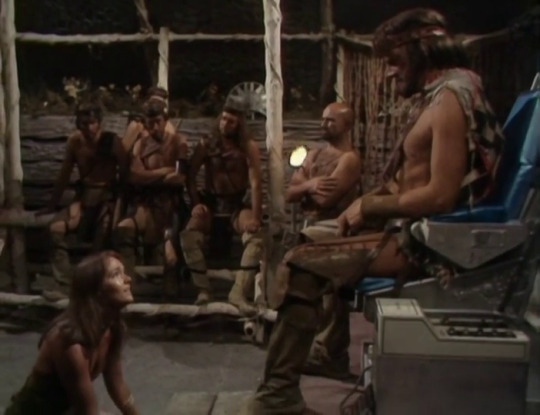
In his element, the Doctor arrives at this frontier world by himself. However, as much as Baker would have relished travelling solo, it becomes immediately apparent why this would be a bad idea. Having no companion to sound off with, he resorts to directing his comments toward you and I, the audience. While I love the Fourth Doctor and his penchant for breaking the fourth wall, it’s not a sustainable recipe for good storytelling. The Doctor needs a companion, if for no other reason than to have someone to explain the plot to.
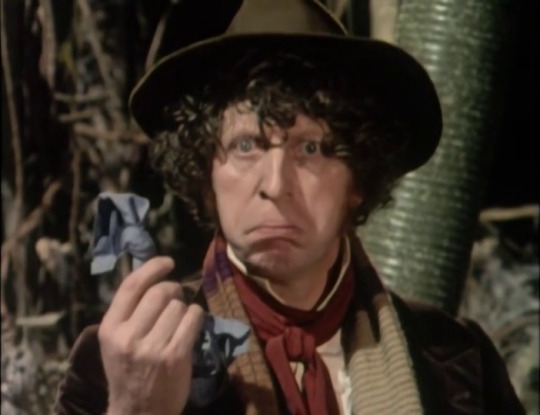
The Doctor walks through this wilderness without a care in the world as little critters scurry past in a Star Wars or Dark Crystal fashion. It reminded me of moments like when the First Doctor and his companions come across petrified creatures on the surface of Skaro. I wish modern Doctor Who would do more of this- tiny creatures that have no greater bearing on the storyline other than world-building. Leela, having been exiled finds herself walking deep into the jungle. However, it seems that exile wasn’t enough, as she soon finds herself being hunted by her former tribesmen. It would appear that allowing her form of heresy to live is not something Neeva, or his god "Xoanon," are willing to let happen.
Leela dispatches one of her would-be assassins, while another is taken care of by a sympathetic friend named Tomas, who followed the killers after overhearing Neeva’s scheme. While they never touch on it, I wonder if Tomas didn’t have feelings for Leela. It would make sense as she is fierce, intelligent, beautiful, and around the same age as him. Had things gone differently, perhaps they could have had a life together. However, Leela is past the point of no return, and his boyish crush. She pridefully tells him to turn back but warns him not to trust Calib, a man she sees as having more ambition than sense.
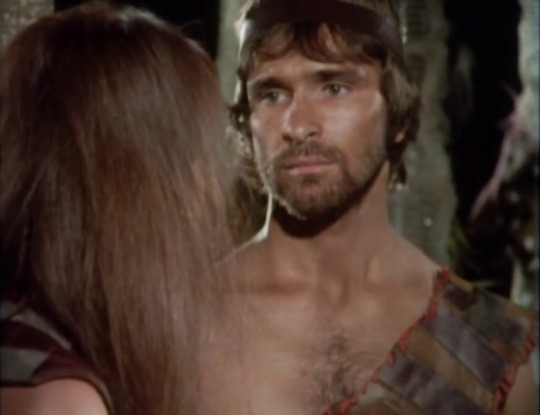
Leela walks past what is known by the Sevateem as a great protective barrier. Finding herself pursued by invisible monsters, she runs for her life but falls to the ground at the feet of a man unknown to her. Upon following her gaze up to the feet’s owner, she is shocked and terrified to see the Doctor, a face she of which she is surprisingly familiar. Despite the fact that the Doctor resembles the "Evil One," the Sevateem’s own version of Satan, Leela doesn’t know what to make of his friendly demeanour. This is a moment of great internal conflict for her as only a few scenes ago she was telling her tribal leaders that their god Xoanon was a lie. Now here she stands, looking the devil in the face and he’s offering her sweets.
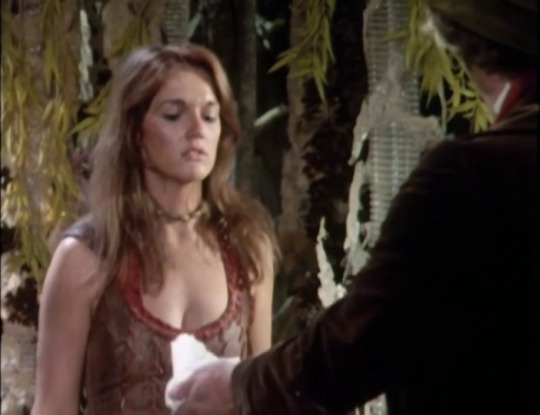
I’ve always maintained that the story arc for Leela is one of atheism but in the most Doctor Who of manners. Much in the same way that the Doctor will go into a haunted house and prove that it’s actually an ancient alien force, the show has widely maintained the stance that the spiritual is just science we don’t yet understand. Leela’s first lesson comes in the form of the Doctor deftly dealing with their invisible predator. After discovering that a protective boundary is a machine that projects a sonic disruption, the Doctor deduces that the creatures must be blind and sense things by vibration. Using an egg timer, the Doctor distracts the monsters, while he and Leela make a break for it. It’s a great special effect, as even now I can’t figure out how they managed to crush a clock with what looks like nothing.
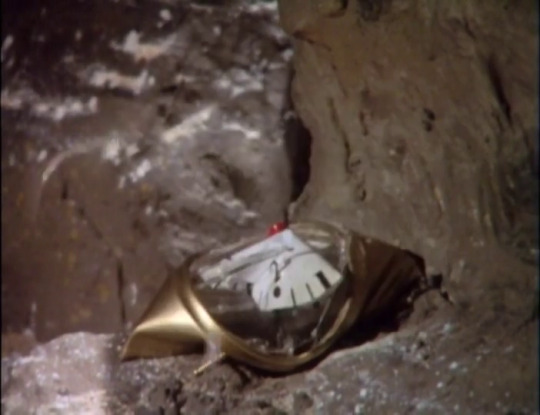
Back with the tribe, we learn that Neeva speaks with Xoanon through a transmitter that he believes is a magic relic that allows only the holiest to speak to God. Xoanon commands Neeva to go to war with their enemies the Tesh. But the chief of the Sevateem, Andor, wonders why their God would have them go into battle on empty stomachs. A reasonable concern which is met by Neeva’s assertion that Xoanon will feed those of true faith. The tribe gears up for war, but on their way past the boundary, discover the Doctor.
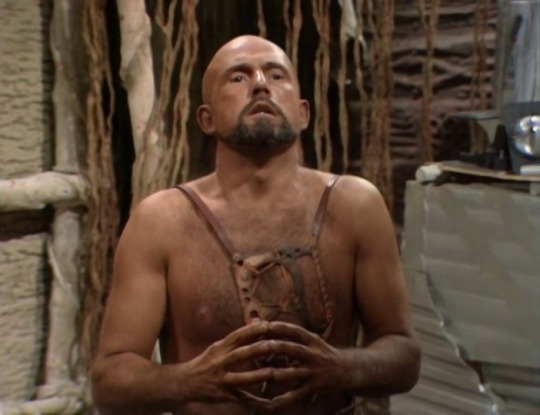
The men shoot a couple of warning shots across the Doctor’s brow, embedding themselves into a tree. While the men deal with the fact that they are now looking eye to eye with their version of the Devil, Leela slips away. Upon seeing the Doctor, the men do a sort of "Sign of the Cross," gesture with their hands touching their neck, their shoulder and their waist. The Doctor notes this is interesting as it’s also the method one would use to check the seals on a spacesuit. Using his newfound infamy to his advantage, the Doctor holds one of the tribesmen hostages with a "deadly," Jelly Baby. But the men call his bluff and the Doctor is taken to meet Neeva and Andor.
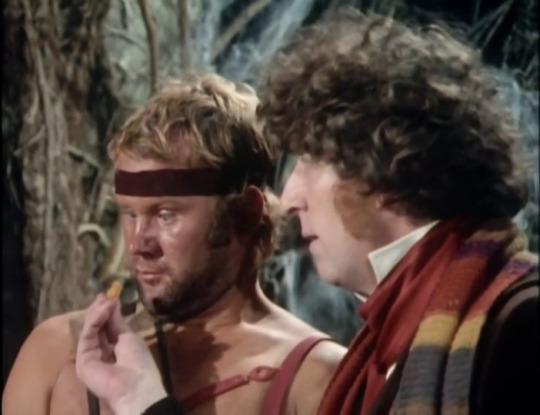
Seeing this as an opportunity to prove their faith, Neeva declares they should kill the Doctor without haste. However, Calib, an atheist in his own right, sees this as an opportunity to make Neeva look bad in front of the whole tribe. He suggests they put the Doctor through the "test." Knowing that if the Doctor dies, it will prove that he wasn’t a god, and if he lives, Neeva will look just as bad, as the belief is that only mortals can survive the test.
Knowing her father to have died from this test, an eavesdropping Leela sneaks her way in to stop the Doctor from being killed. Leela uses local Janis thorns on one of the captors, paralysing him in a rigid posture with no hope of revival. The Doctor is appalled by this and commands her never to use Janis thorns ever again. After making a break for it, the Doctor and Leela make it past the boundary where the Doctor learns why his face is so infamous. Out across the horizon sits a giant mountain with his own visage carved into its precipice.
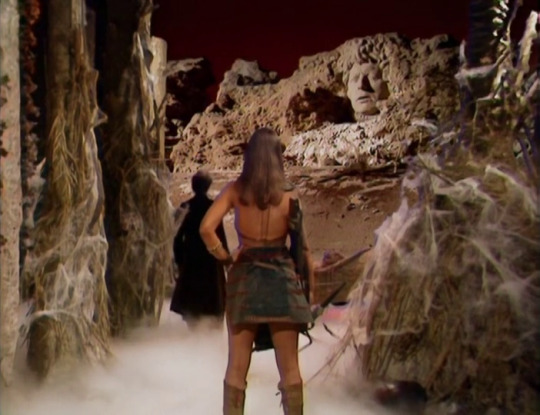
Meanwhile, the rest of the warriors continue toward the mountain for their attack. I was genuinely surprised as I had never noticed the inclusion of a single female warrior with black braids in her hair. Initially, I had thought Leela was the only female in the entire story, but there comes braids looking like a badass. I instantly want to know more about her and to see her in extended media. Sadly, braids and a bunch of other Sevateem are cut down by beams of light before they can meet the impenetrable time barrier. Clearly, something about this was a trap put on by Xoanon, but why?
The Doctor decides that the only way to understand what is happening is by going back to the tribe, despite the death sentence. Upon returning, most of the camp is still deserted, allowing him and Leela a chance to snoop around. Upon discovering the room of "relics," kept by Neeva, the Doctor reveals them to be nothing more than the scientific instruments of the human colonists from whom the Sevateem and Tesh descend. The Doctor finds the helmet Neeva uses to speak to Xoanon and realises that Xoanon speaks with his own voice. Furthermore, Xoanon seems to think the Doctor and he are one.
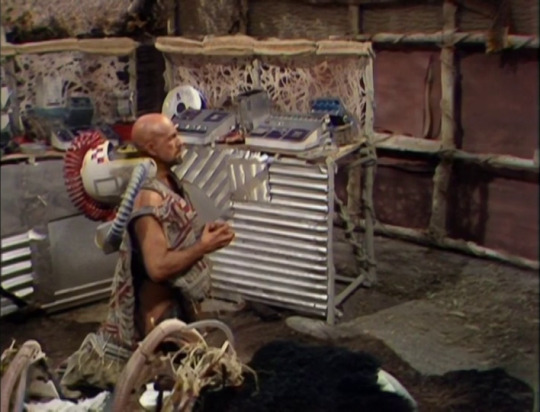
Being one of the first to return from battle, Calib discovers the Doctor and Leela. Afraid they will ruin his plans to make Neeva look a fool, he poisons Leela with a Janis thorn. With little time, the Doctor demonstrates to Calib that the equipment they've been worshipping for years is actually capable or analysing and concocting a cure for Janis thorn poison. Leela is revived but slightly incapacitated, which makes her and the Doctor easy to capture when more, including Neeva, return from battle.
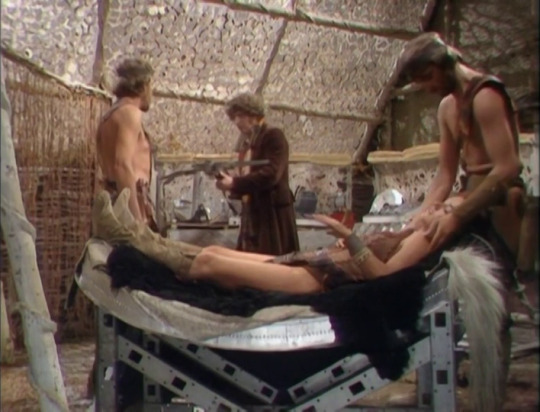
Now, remember the little critter I mentioned earlier? Well, it would appear that they're a carnivorous bunch known as the horda. Much like piranhas, they are able to strip a body of its flesh when in large numbers. The Doctor is made to stand above a pit of them while a rock tied to a rope slowly lowers, opening the pit more and more with every inch. Leela tries to give the Doctor a pointer, which causes one of the Sevateem to strike her. The Doctor's response is to kick a horda at him which causes him to run in fear. I mention this because any time the Doctor is violent is cause to pause.
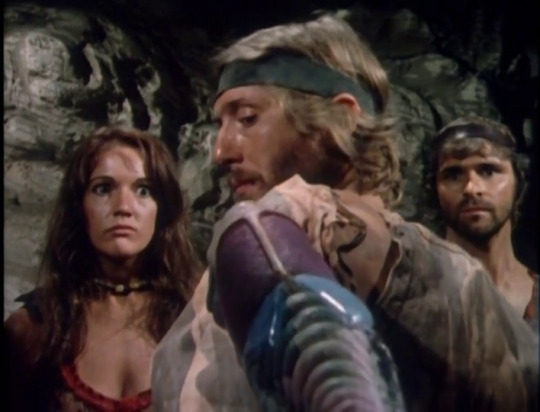
One of the things I find irritating with modern Doctor Who is the insistence that the Doctor is never violent. The Third Doctor used Venusian Aikido. The Fourth Doctor practically breaks a guy's neck in "The Seeds of Doom." Hell, even in modern Doctor Who we see it. Like when the Ninth Doctor punched that guy, or when the Twelfth Doctor punched that guy. Or how about the Eleventh Doctor teleporting a bomb onto Solomon's ship in "Dinosaurs on a Spaceship," written by Chris "I don't understand the Doctor's morality" Chibnall? My point is, that the Doctor isn't violent unless he needs to be. The Doctor is non-violent up until the point where either A) it's the only option left, or B) he's mad. In this case, it's B, he's mad.
What does it mean that the Doctor chose this moment to break his rule? I would venture to say he was punishing unnecessary cruelty in kind. But think even more about the theme of the episode. At this moment, the Doctor's morality isn't what's in question, it's his mortality. It's as if Boucher is taking this moment to compare the actions of a man to the expectations of a god. Before the Doctor shoots the rope with perfect precision, he's revealed himself to be a person subject to the whims of his own emotions. In this way, Boucher is asking the viewer to look at the vengeful nature of our own gods and to see the inherent humanity entangled within. Or in the Doctor's own words- "You can't expect perfection, even from me!"
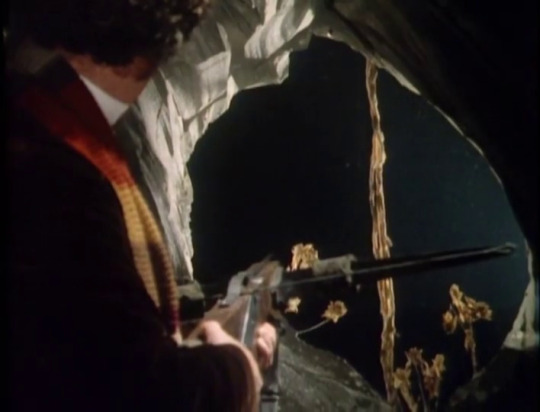
With the Doctor somewhat exonerated by being able to pass this asinine test, he is given a bit more freedom to move about. But this doesn't mean an end to the unrest. The Doctor reveals that the Sevateem are actually descendants of a survey team (creating a portmanteau), and heads back to the mountain to discover the secrets of the Tesh. Meanwhile, Xoanon removes the barrier surrounding the Sevateem, allowing the invisible creatures free roam to terrorise the simple tribe. The Sevateem are quickly overtaken by invisible beings, which kill Andor and many others. The Doctor takes his leave to climb up the mountain into his own face.
The Doctor discovers a spacesuited man within the mouth of the carving. He also discovers a derelict rocket for the Mordee expedition. It's about this time that the Doctor begins to remember having come to this planet in the past. In an attempt to fix the AI, Xoanon, the Doctor linked his mind. Only instead of repairing it, he created a duality that drove the AI to madness. Thus creating a desire in Xoanon to reconcile these two aspects in itself. Its solution for this quandary was to influence the two groups of humans into two very different evolutions and see who would come out on top. The primitive yet cunning Sevateem, or the brilliant yet passionless Tesh?
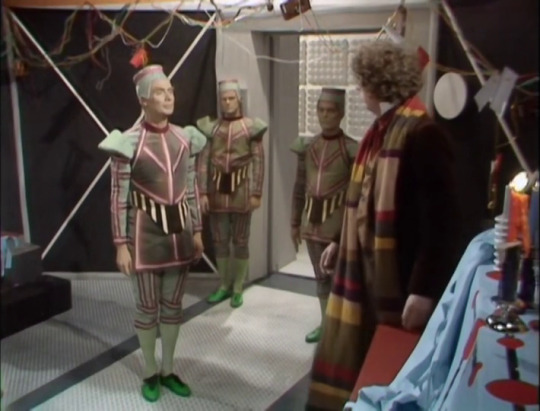
At this point, the story takes a somewhat extreme turn as the Tesh are found to be rather advanced in every way by comparison to the Sevateem. The Tesh, being descendants of the technicians of the colonists, are more intelligent. They dress like the Great Gazoo if he went through a harlequin phase. They caper and cavort about in an almost jovial sense, but their belief in Xoanon is no less zealous than their primitive counterparts. They seem peaceful at first until the Doctor discovers they plan to atomise Leela. After showing his disapproval, the Tesh turn on the Doctor, subduing him with their mental powers which looks a lot like staring super hard at the guy until he collapses.
I absolutely love that with two reviews in a row I'm able to talk about two separate James Bond type laser scenes where our heroes are incapacitated in some way and are forced to escape the laser with a mirror. This isn't me calling out the show for overusing a trope. There were eleven years between these two episodes, and it's completely by chance that I decided to review them back to back, but how funny is that? And their titles both have to do with faces! I swear I didn't plan this.
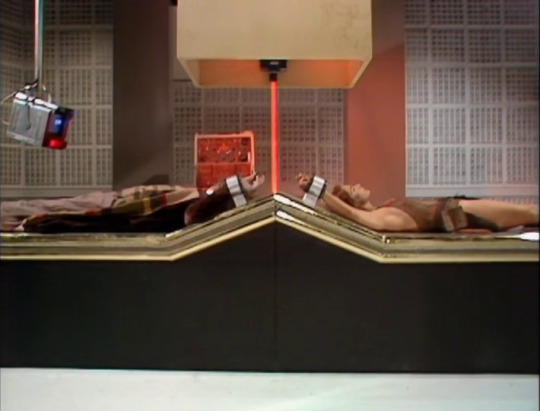
As I said, the Doctor and Leela escape with a simple mirror. The Doctor uses the technology to imitate Xonanon and communicate with Neeva. However, Neeva surprises the Doctor when he calls the Doctor by name, showing that even the most fanatical is not so forgone as to be unreachable. The Doctor tells Neeva to instruct Calib to lead the men to the mouth of the mountain where the invisible beings cannot reach. Soon, the Doctor and Leela find themselves running from the Tesh through corridors. It's classic Doctor Who with the bad guys giving chase through endless corridors which are actually the same corridor. After a scuffle, the Doctor once more is forced to use violence as one of the Tesh comes at him and gets kicked into an electrified wall. The Doctor notes that the man appeared to be hypnotised, as if under the influence of Xoanon.
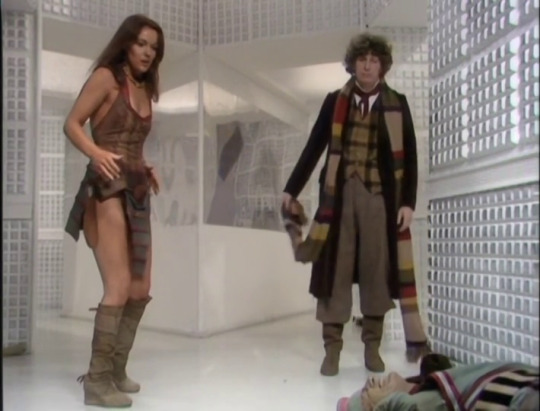
Leela is given a laser gun to fight off the Tesh, which I find to be the perfect metaphor for this entire story. The cave girl gives up her crossbow for a laser gun. It is as if her transition from a primitive to the scientist is coming full circle. It's as though she is claiming the birthright of her ancestors. She's gone from a person questioning her faith, to a person functioning within this new paradigm. Even though she still finds herself cowering when she hears the supposed voice of God, her confidence is growing.
Leela continues trading fire with the Tesh, while the Doctor seeks out Xoanon within the "Sacred Heart," a large computer complex. An array of large screens project the Doctor's face. But as the Doctor enters the room, Xonanon experiences an identity crisis, causing it to repeat the question "Who am I?" The panic creates a psychic assault on the Doctor, causing him to drop to the ground. As the question repeats, Xoanon's voice fluctuates between the Doctor, a man, a woman, and a child. The child's voice is a particularly chilling juxtaposition with the Doctor's frantic orange face screaming in a panicked frenzy. Fun fact: the child's voice is provided by Anthony Frieze who won a competition at his local school to be in the episode. For a kid that won a contest, it's surprising how much he nailed that take. It's quite easily one of the most effective moments in the entire serial.
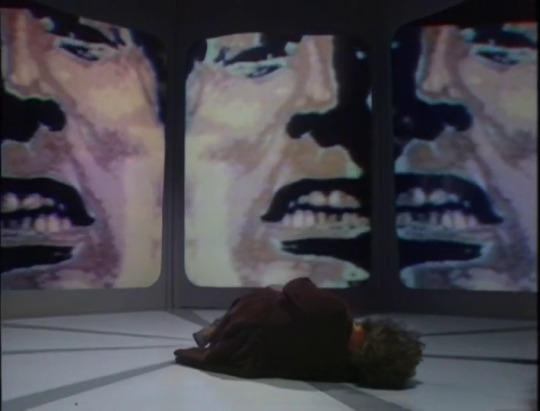
The fourth episode of this serial is easily one of the weakest as it degenerates into a lot of your common science fiction tropes. As I said, once they enter the mountain, the tone of the entire story shifts. This is really my biggest criticism of the entire story. But it's also a bit of a further metaphor for the whole atheism argument. Man leaves the primitive world into the world of technology. But with false gods present, man still struggles to find an identity beyond their god. In their own way, the Tesh are no more advanced than the Sevateem. It would appear that Xoanon's little experiment in eugenics was all a bust.
The Sevateem arrive and fight back the Tesh. They also bring the Tesh's weapons into the fight against the invisible monsters, which turn out to be manifestations of Xonanon's id. This explains why the one time we do see them, they just look like a giant apparition of the Doctor's face. Having saved the Doctor from Xoanon's psychic assault, Leela and the Doctor continue trying to stop Xoanon. Because of this, Xoanon, in a last-ditch effort to stop the Doctor, takes over Leela and the rest of the Sevateem to kill the Doctor. However, having been broken from his own religious spell, the unlikeliest of heroes appears in the form of Neeva. Neeva shoots Xoanon long enough to stop the link and save the Doctor but loses his own life in the process.
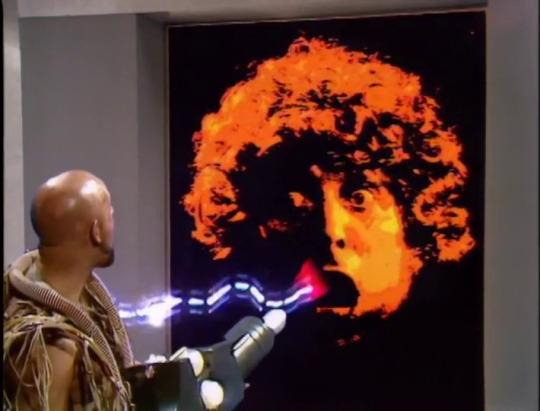
The Doctor finally repairs Xoanon but gets knocked unconscious in doing so. Upon waking, he discovers he had been out cold for two whole days. A casual Leela sits beside him eating chocolate in peace. The Doctor assumes this means his plan worked and that Xoanon was stopped. The Tesh and the Sevateem are living together in a sort of shaky truce. The invisible monsters are gone, and Xoanon is now at peace. To prove so, Xoanon offers the Tesh and Sevateem the option to destroy it at the push of a button. They discuss needing new leadership and decide Calib is not the right man. Instead, the people (see: Tomas) want Leela to lead. However, Leela turns down the offer to travel with the Doctor, much to his chagrin. Leela has seen enough of this primitive planet. It's time to see the stars.
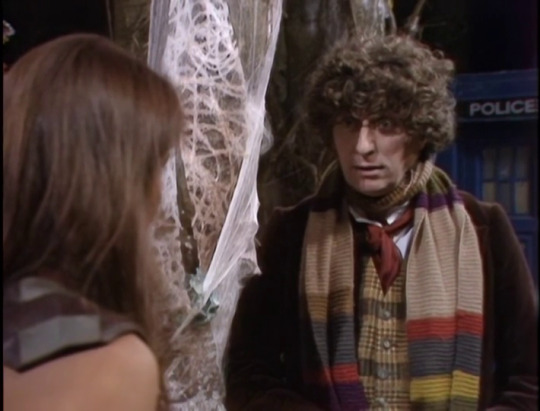
If you can't tell by now, the aspect I liked so much about this story was its delving into atheism and theology. It may seem like a heavy subject, but at its core, it's something that represents the show as a whole. The perspective that all problems, at their core, can be met with logic and reason. Furthermore, I greatly admire the way in which they continue this story arc for Leela over the remainder of her tenure as a companion. This idea of a woman raised out of ignorance into the realm of greater knowledge continues to build in her character until she becomes someone capable of living among the Time Lords themselves.
That is not to say this serial is not without its faults. For some, it may not be a fascinating storyline. They may not be as enthralled by its themes as I was. Which is fair. There are also some silly moments, such as the invisible monsters leaving footprints, despite being the projections of a giant head. The use of the word savage is also a bit dated, as is the whole concept of the "noble savage." Also, Xoanon got off a bit light. It was like at the end of The Dark Crystal when urSkeks leave like "Peace out, sorry about all the genociiiiide..." What kind of society are the Doctor and Leela leaving behind? Can the Tesh and Sevateem find common ground, or will it be war in perpetuity?
Truth be told, I rather like that it ends on a bit of an open-ended question. I don't believe it's always the Doctor's job to handhold and change the diapers of every developing society. The most the Doctor can hope for is that things have found some sort of balance, free from meddling or outside influence like aliens, robots, or in this case, himself. Furthermore, I love the concept of the Doctor taking a companion on reluctantly. It's almost a form of penance for the Doctor. You created this madwoman with a knife and Janis thorns, and now you've got to tote her around the universe. In many ways, I find Leela very sympathetic. Having come from a religious background, I know the struggles inherent in losing faith, how it shakes your foundation. This type of representation happens so seldom in fiction, and it's rarely a positive thing.
"I too used to believe in magic, but the Doctor taught me about science. It is better to believe in science." –Leela, from "The Horror of Fang Rock"
#Doctor Who#Fourth Doctor#Tom Baker#Leela#Louise Jameson#The Face of Evil#Xoanon#leela of the sevateem#sevateem#tesh#bbc#TARDIS#chris boucher
10 notes
·
View notes
Text
Why ‘Spider-Man: Into the Spider-Verse’s Animation is So Amazing

So those followers of my blog may know that I posted a full film review of Spider-Man: Into the Spider-Verse rather recently. You’re welcome to go check it out if you haven’t yet, but the short version of it is that it’s my favorite movie of 2018 and is, in my opinion, the best comic book film ever made. But I wanted to address something about the film that I keep seeing coming up. I’ve been watching a handful of reviews for the film online and in a great deal of them I hear people bring up how they were skeptical of the animation style when they first saw the trailers because it “looked choppy”. One film critic in particular by the name of Roger Moore actually still held that critique against the film even after seeing it when he posted his review of it. Most people have come around to enjoying the films animation and have put the idea of it being choppy at the backs of their heads. But what did they mean initially? The problem with a lot of film critics when it comes to judging an animated feature is that sadly they can come from a misinformed place about the medium and create this negative stigma around a film that isn’t justified. Animation is already fighting a number of prejudices (people saying it’s only for kids, saying it’s a genre and not a medium and any other amount of reasons why they may think they are above it) so this added one does not help what is easily the most spectacular animated film of 2018. But I myself am an animator, so I feel I can come from a place of explaining the visuals in a way that may make the still skeptical viewers more appreciative of what the film is trying to accomplish. With that in mind, here’s why the films animation works so well.
Animating on 2s, not on 1s

When it comes to animation, whether it be 2D or 3D, audiences are typically used to a consistent and fluid motion where there is virtually no break in the motion of a character or object. Simply put; it’s as fluid as fluid animation can be. In these cases, this is because the animation was done on “1s”. But what does that mean?
With a few exceptions, it’s a universal rule that animation runs at 24 frames per second. That means every second of footage you see of an animated film can have as many as 24 unique drawings or adjusted poses in them. That’s a lot of work, but animation legends like Richard Williams (director of Who Framed Roger Rabbit?) are famous for having classical animation of this stature. However, just because you CAN fill each second with that many drawings doesn’t mean everybody does. Alternatively you could have 12 drawings in each frame and just double the amount of time you see them go by. When you do this, it’s called animating on “2s”. It’s half the work for a result that may not be quite as fluid as animating on 1s but still looks convincing enough to deceive the human eye. You could even go as far as animating on 3s and animating on 4s, but the higher you go the more you increase the risk of your animation looking “choppy”. Spider-Verse in particular has most of their frames on 2s, with a few exceptions being when the characters have to keep up with complex camera work and so they go back to 1s. So that would explain why a lot of people initially thought the animation was “choppy” . . . .but are there any advantages to doing animation this way aside from having less frames to fill? Indeed there is. When you increase the exposure of any frame, the layout and composition of said frame as well as any small details has a greater chance of sticking out in the viewers mind. Spider-Verse takes exceptional advantage of this fact because every little action in this film is like a beautiful work of pop art. There can be other ways you can inject great appeal in your animation besides making it “fluid” like making every drawing crisp and full of detail and if you’re a skilled enough animator you can make your animation deceive the eye through a number of other tricks which we will go into in a bit. I can’t think of a finer example of this point than Legendary indie animator Bill Plympton.
youtube
Bill Plympton is famous for having his drawing exposures in the 3s and 4s, having every drawing have vivid detail with complex shading and sketchy lines, but he still manages to create believably moving and behaving characters and set pieces in spite of this limitation.
So how is it done? How does an animator make convincing and appealing movement with a decisively limited amount of drawings? Let’s start with good posing.
Posing
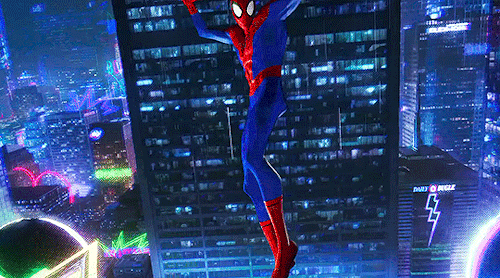
I’m of the opinion that Spider-Man lends himself to good animation more than any other superhero. Because of all superheroes, nobody has as many interesting poses, weight shifting and as much natural progression between actions as the web slinger. His main mode of transportation is swinging around, using his weight distribution and kicks and lunges to propel himself in any direction he wants and as he tries to make a turn he has to push himself into another direction, fighting the force that pushed him the other way to begin with. Contrast this with Superman who can just fly right over to where he needs to be without much movement of his arms and legs and without much struggle with incoming obstacles (fun fact, the whole reason Superman can even fly in the first place is because it’s easier to animate than have him leap everywhere). But anyway, back to Spidey. In most animation you develop key poses. Key poses are the main storytelling positions a character may have just to communicate the idea that they’re doing whatever it is they’re doing. So for example if you were to animate a jump, you would start by drawing the position of your character bending their legs to launch themselves up, then you would have them in mid air, then you would have them land again.
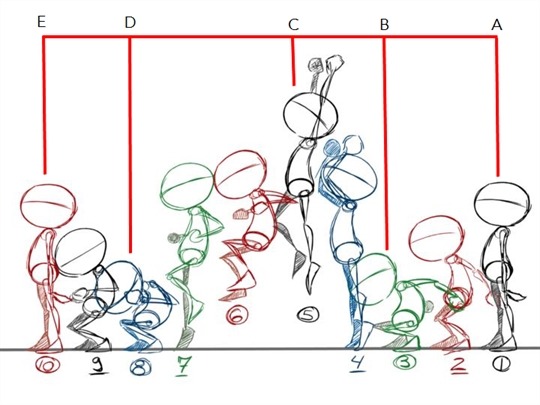
Once you create poses that tell the story well enough, you would fill in the rest between. But the key poses are VERY important to get right. To make sure there couldn’t possibly be any confusion as to what the characters are doing or even who they are, animators often ask themselves “would I know what’s happening here even if I put it in silhouette”? To add to the fluidity of the animation in a way that doesn’t compromise the chosen amount of frame exposure, poses also tend to follow a “line of action”. Basically the whole body follows the direction of a drawn line and maintains it’s course in order to really sell the action. It helps for exaggeration and for developing after aspects like arcs.
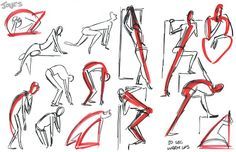
Now as I said before, Spider-Man is a particularly advantageous character when it comes to this stuff. Because he’s acrobatic. He’s shifts his weight a lot. His most iconic poses as a character lend themselves greatly to silhouette. Also, he happens to be very easy to draw. Even if all you did was draw a red stickman with spider eyes we could instantly tell who it is.
youtube
The animators for Spider-Verse knew exactly what kind of beast they were dealing with and MAN OH MAN did they have fun with it. Not only did they perfectly capture the way the classic Spidey moves, but they also gave every different Spider-Person their own take on it. Spider-Gwen moves with the grace and elegance of a ballet dancer, Noir Spidey has a less ambitious and more straight forward way of moving around (kind of “old school) if you will. Then of course you have Peni Parker recreating the anime aesthetic and Spider-Ham with all the elasticity of a cartoon.
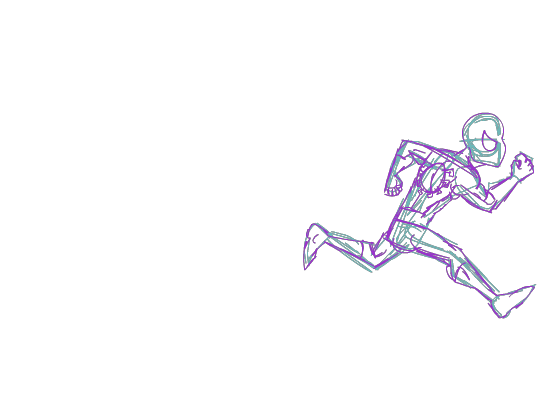
*here’s a little Spidey animation I did a while ago.
Squash and Stretch, Anticipation, Overlapping Action, Follow Through
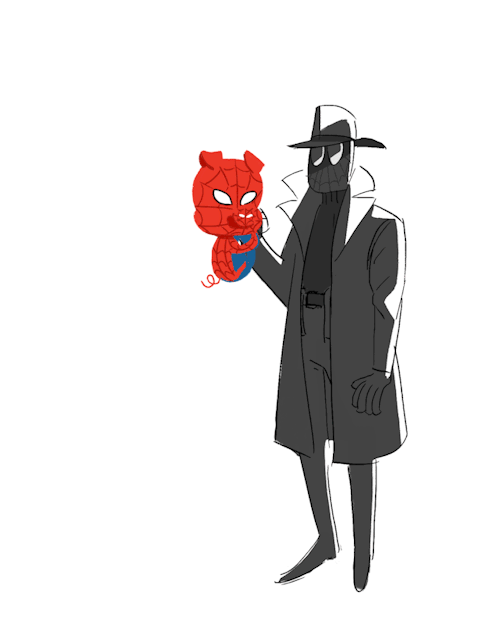
If anybody takes an animation class or tries to learn animation on their own, chances are Squash and Stretch will be the first animation principle listed. It’s exactly what it sounds like. Animators will often contort the model of their character to give whatever is happening more elasticity and to fill the gaps of an arc if drawings are a considerable distance away from each other. It helps the human eye track where an object is going and it can also help with principles like anticipation and follow through. Anticipation is the build up to an action. Think bending your knees before you lunge yourself upward for a jump. Because that momentum has to come from somewhere. Then there’s overlapping action, which is when dragging items on a character’s design such as clothes, capes, long ears, tails or what have you, are trailing along and need to catch up to the rest of the body. Spider-Verse does great with both these principles, especially with Spider-Ham and Noir Spidey. Spider-Ham is obviously influenced by Looney Tunes and other cartoony inspirations so he’ll be prone to doing a lot of squishing and stretching, where as Noir Spidey has the long trenchcoat and hat and you can bet that they’ll always be the last part of him to reach his destination (as well as be the most susceptible to wind). And of course, every character in Spider-Verse has great anticipation . . . as well as what I think of as anticipation’s opposite, follow through. When an action stops, the body needs a moment to adjust itself into the resting position. Think catching yourself with your legs after a jump, crouching down and then standing back up again. Just like how momentum has to come from somewhere, it has to go somewhere when the action is over.
Appeal
So everything I covered thus far is stuff that’s universal across all forms of animation. But What does Spider-Verse do that makes it special? What separates it from other animated films in the theater? The answer is appeal. Appeal is just having a style and aesthetic that’s pleasing to look at . . . and man does Spider-Verse ever cover that. The film goes so far out of it’s way to look like a comic book that every texture has ben-day-dots so it literally looks like a comic print. Every Spider-Person has their own way of moving, their own way of behaving, their own sets of priorities when it comes to the 12 principles of animation. But the film also has a lot of really clever cheats. One of my favorite examples of this is how the film cheats forced perspective. There are many shots in the film where Miles is falling through the city as the buildings rush past him. The animators actually skewed the models of the buildings for these shots to imitate depth, as when they tried it without the skewing it didn’t looks like they were falling fast enough. They also implemented more classical cheats like smears, basically an animators method of imitating motion blur.
I could go on and on with the animation lecture, but honestly, I covered what I wanted to cover. I just wanted to showcase to anybody who may not be aware that animation is more than just “fluidity” and a seamless framerate and that there’s more ways to create appealing visuals than just that. If you haven’t seen it yet, go see Spider-Verse. It is a masterpiece.
2K notes
·
View notes